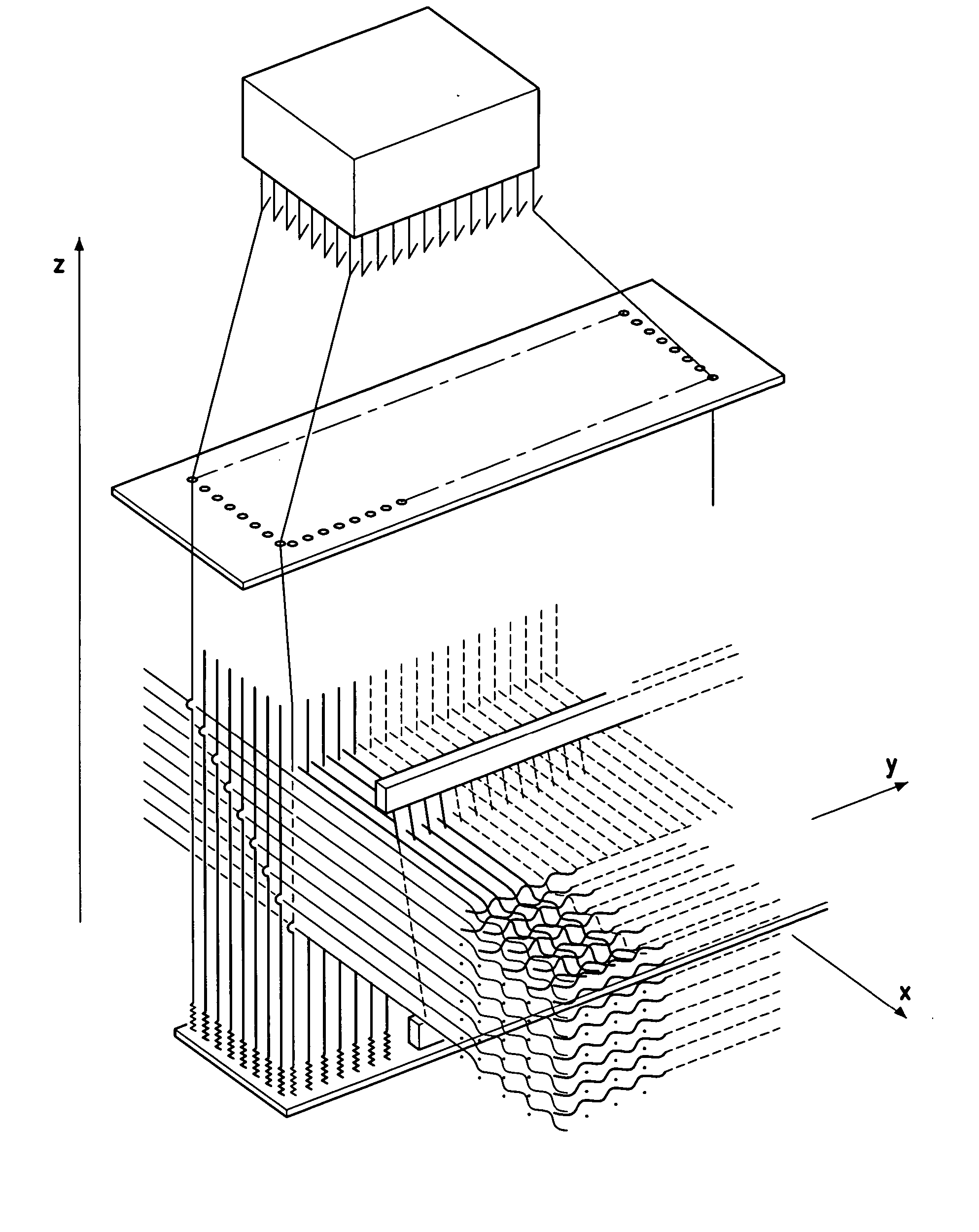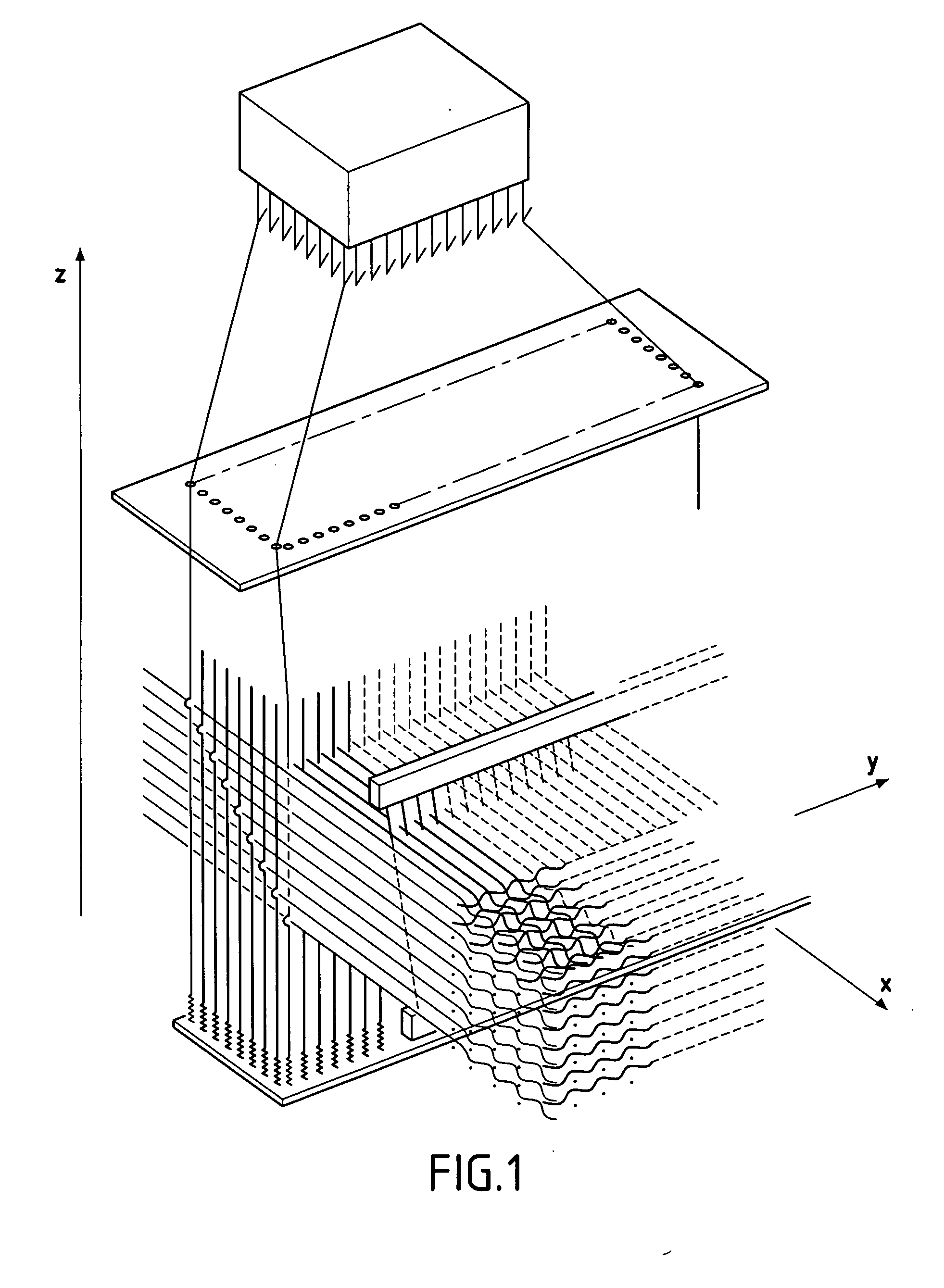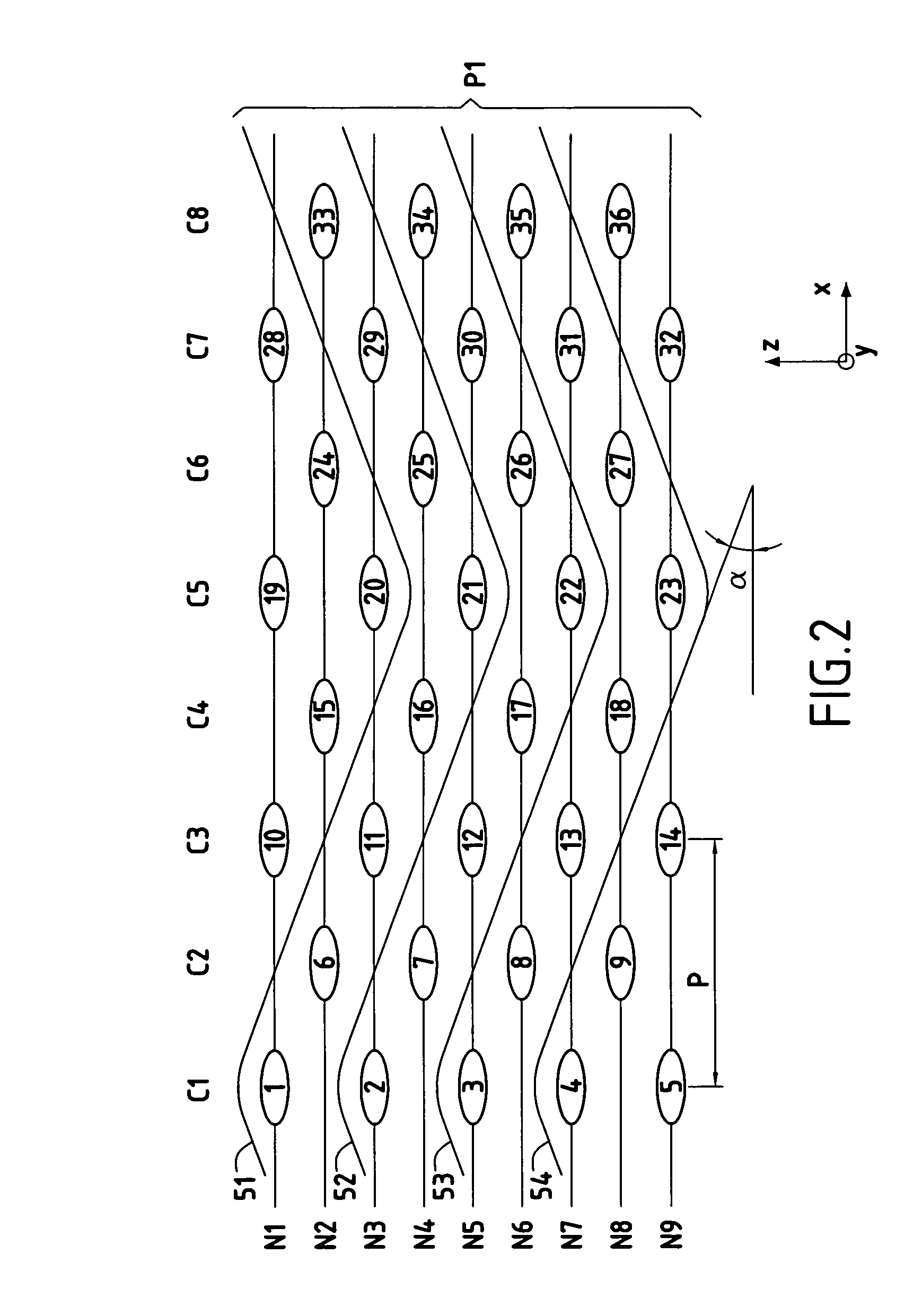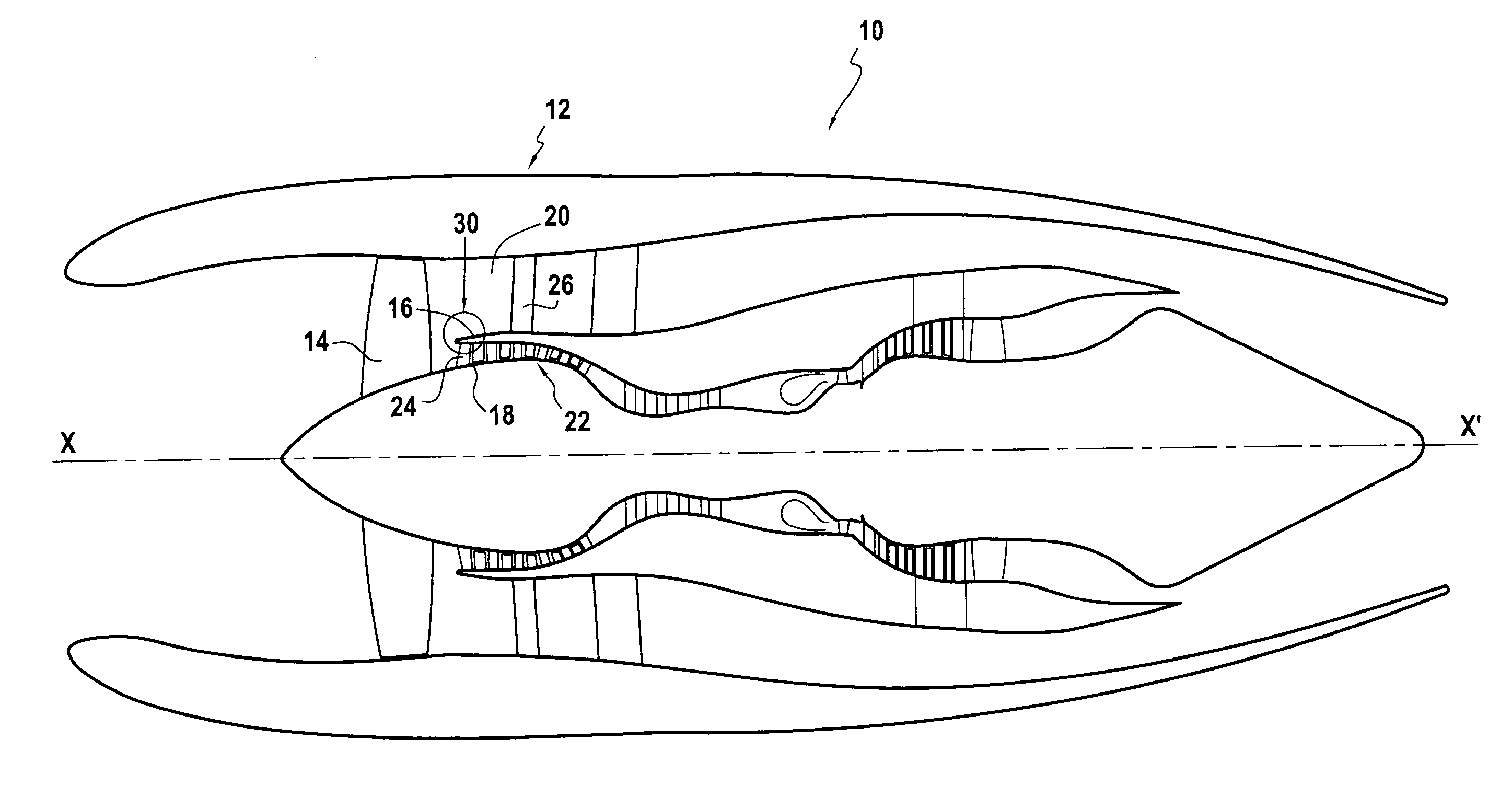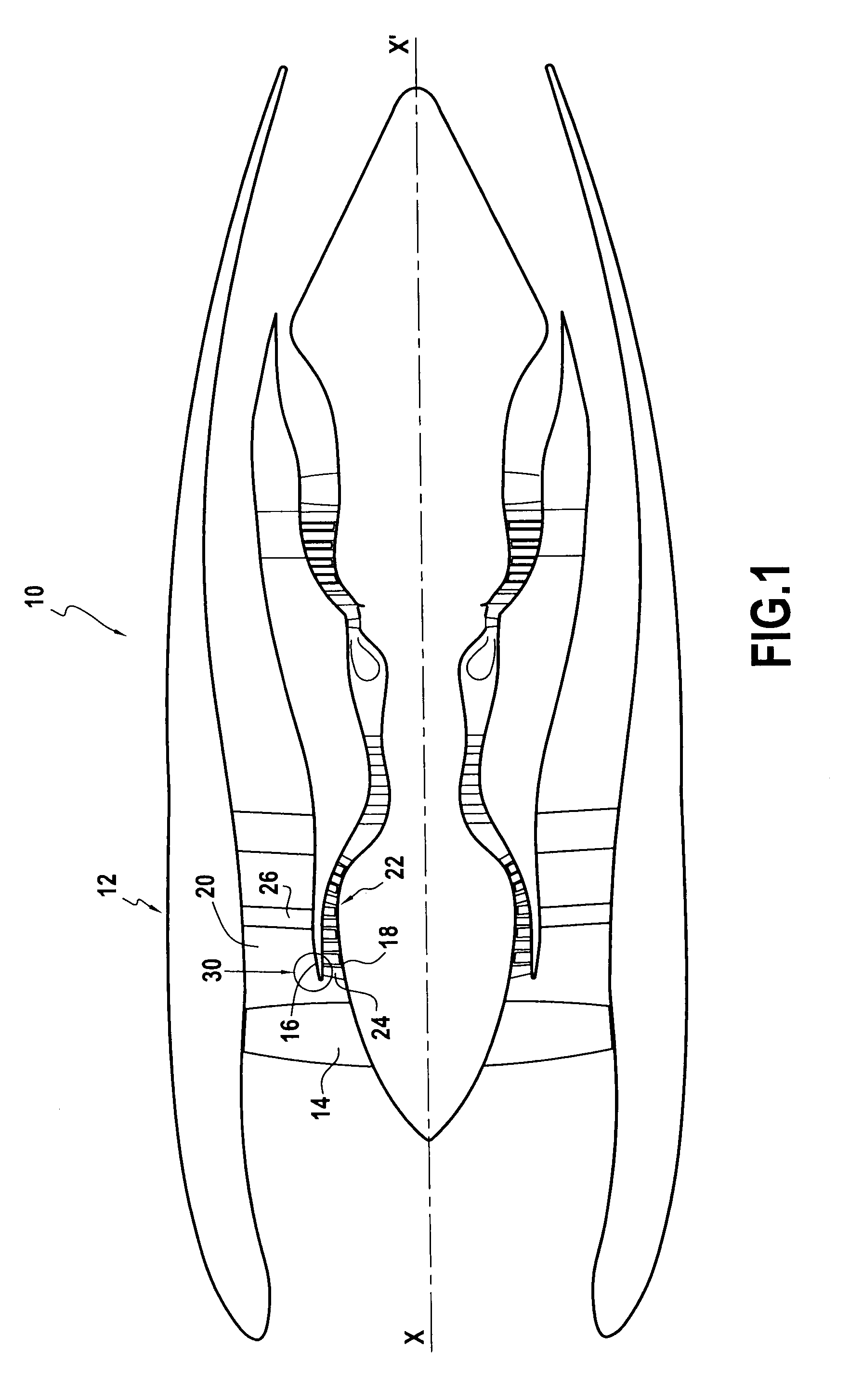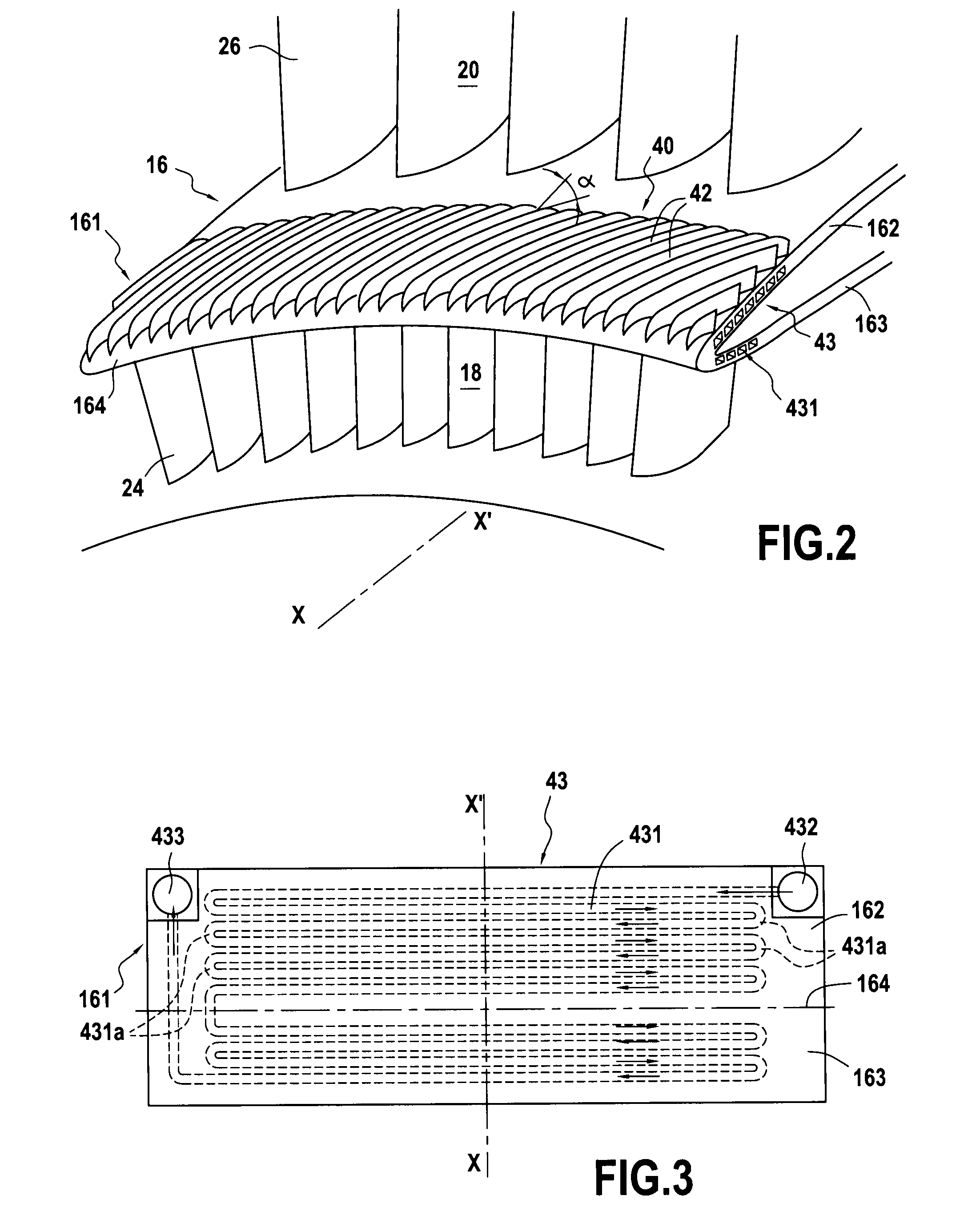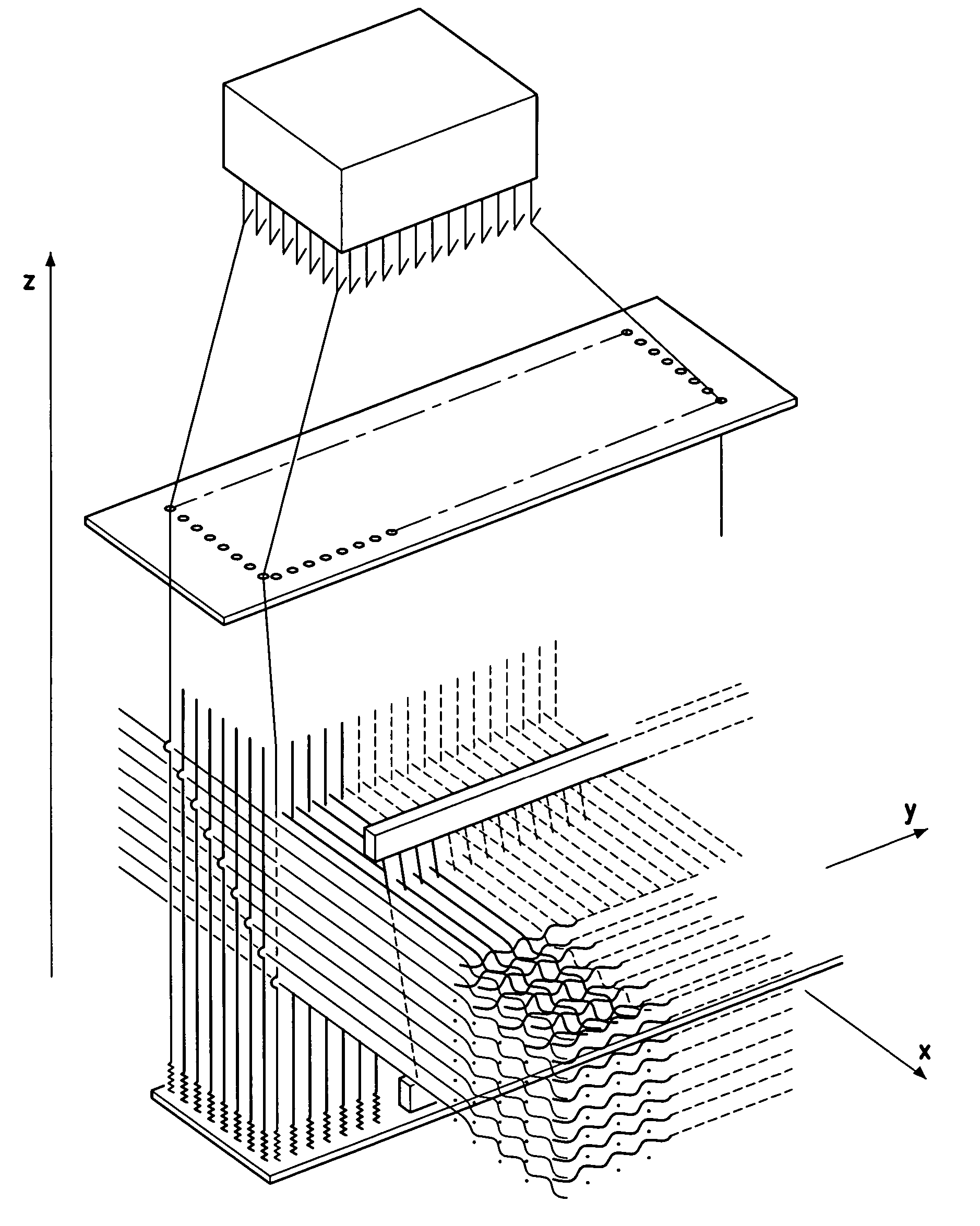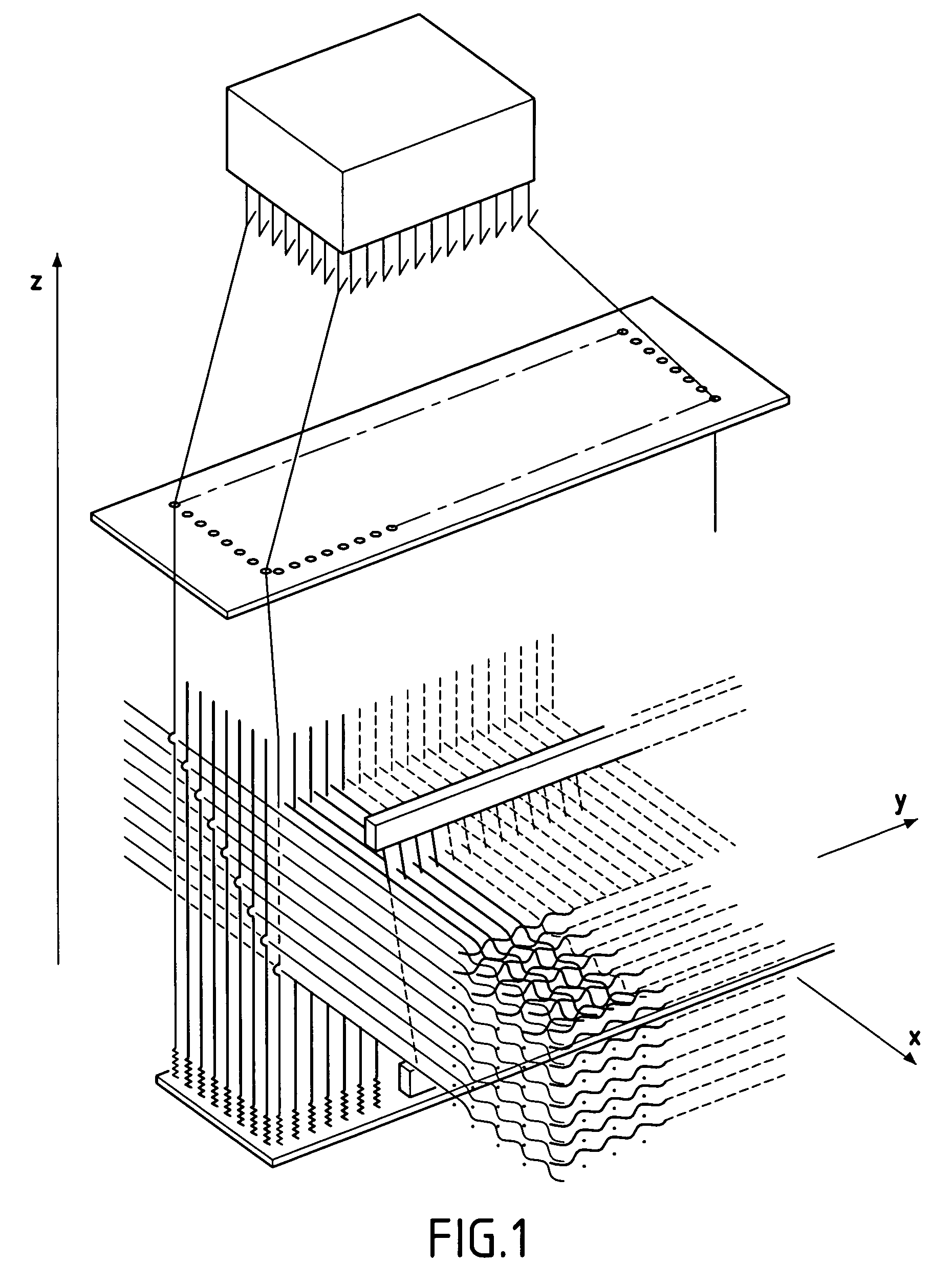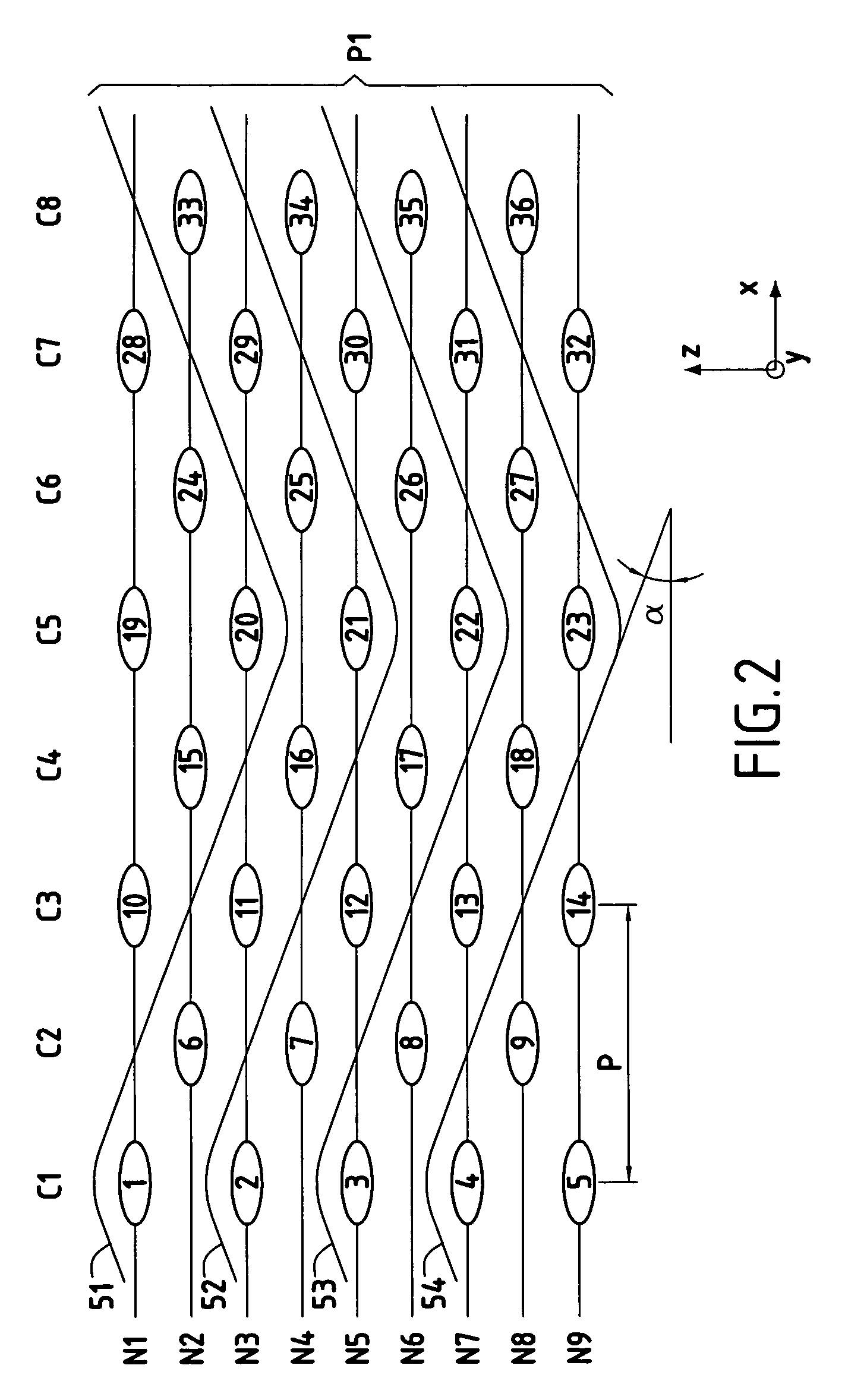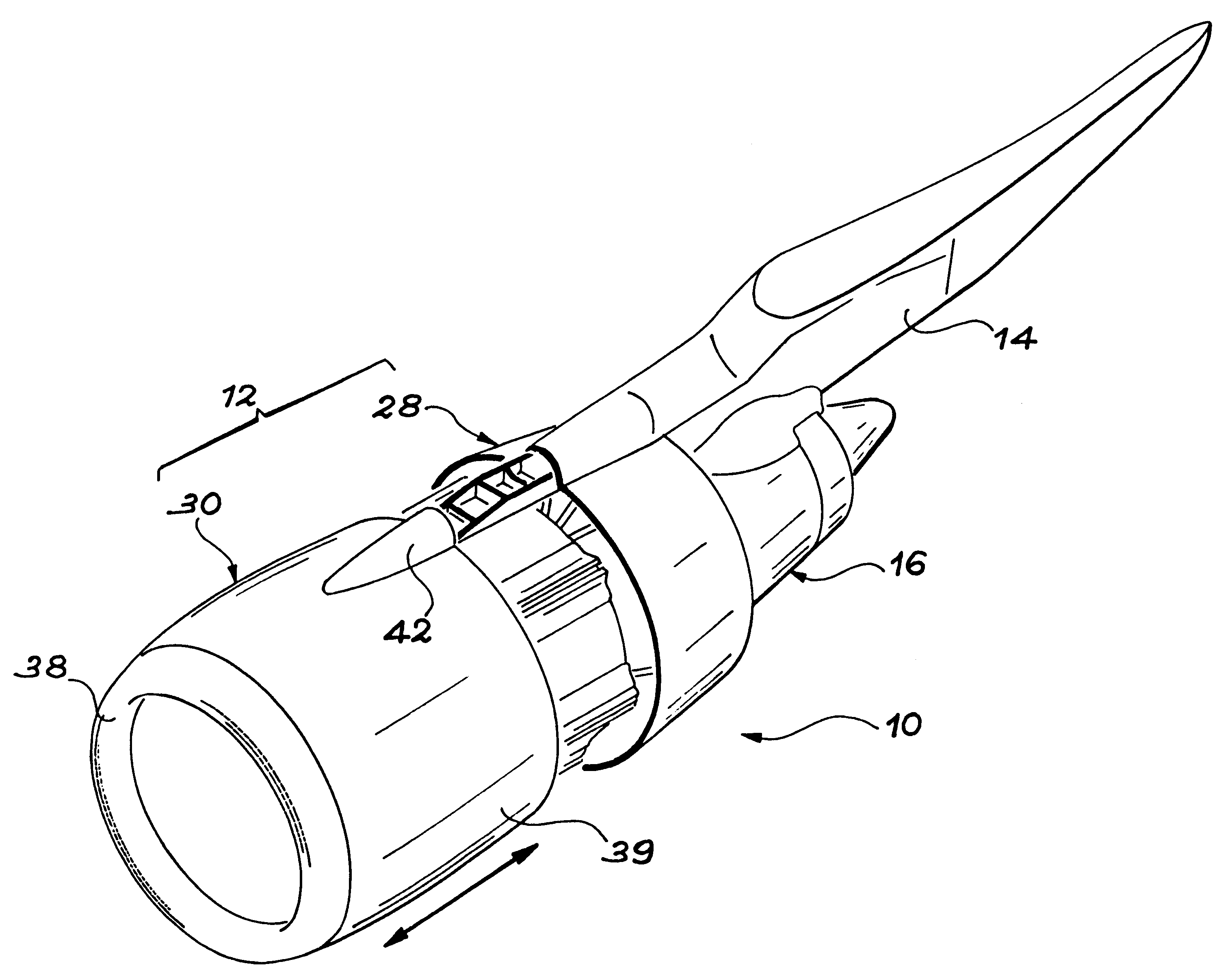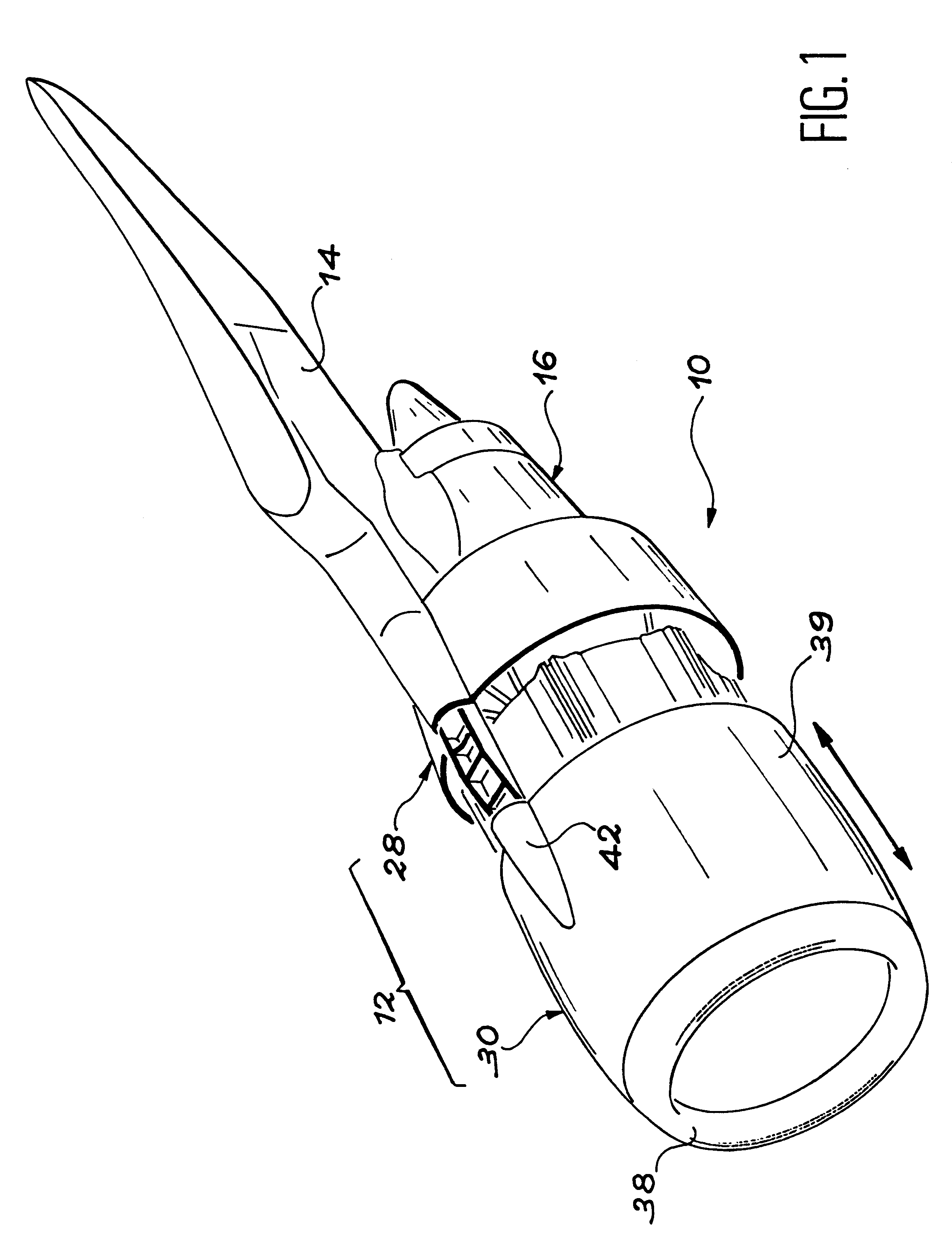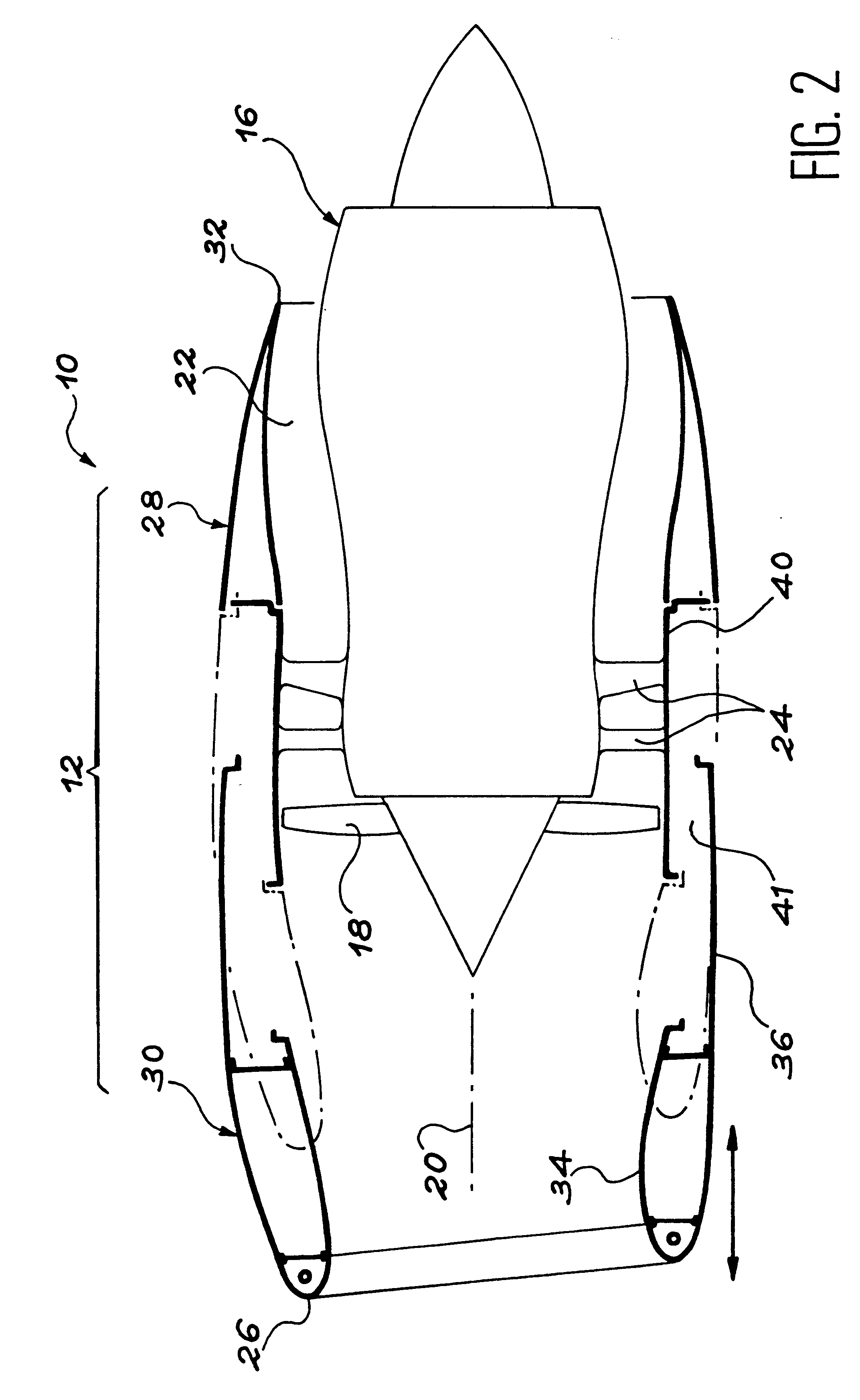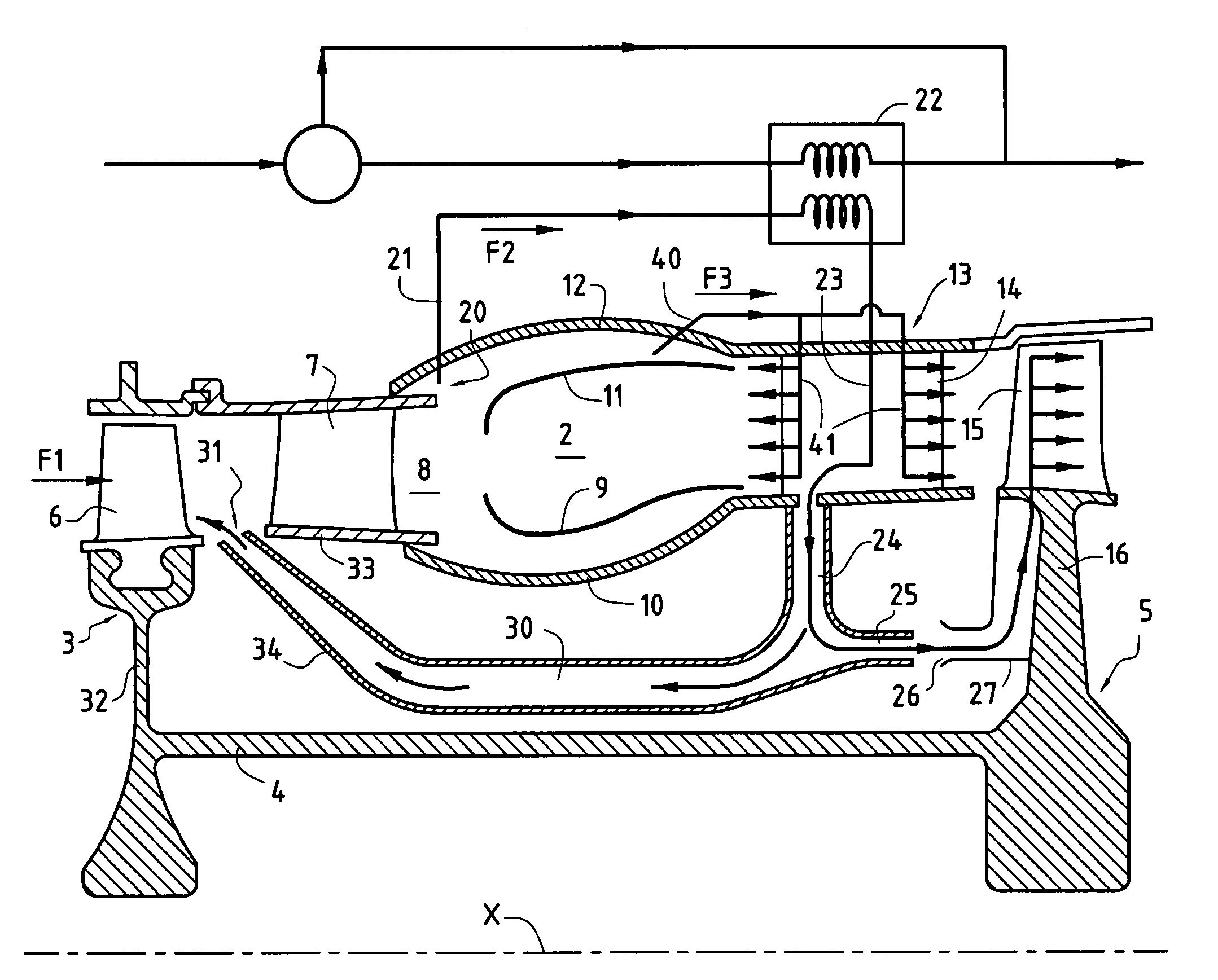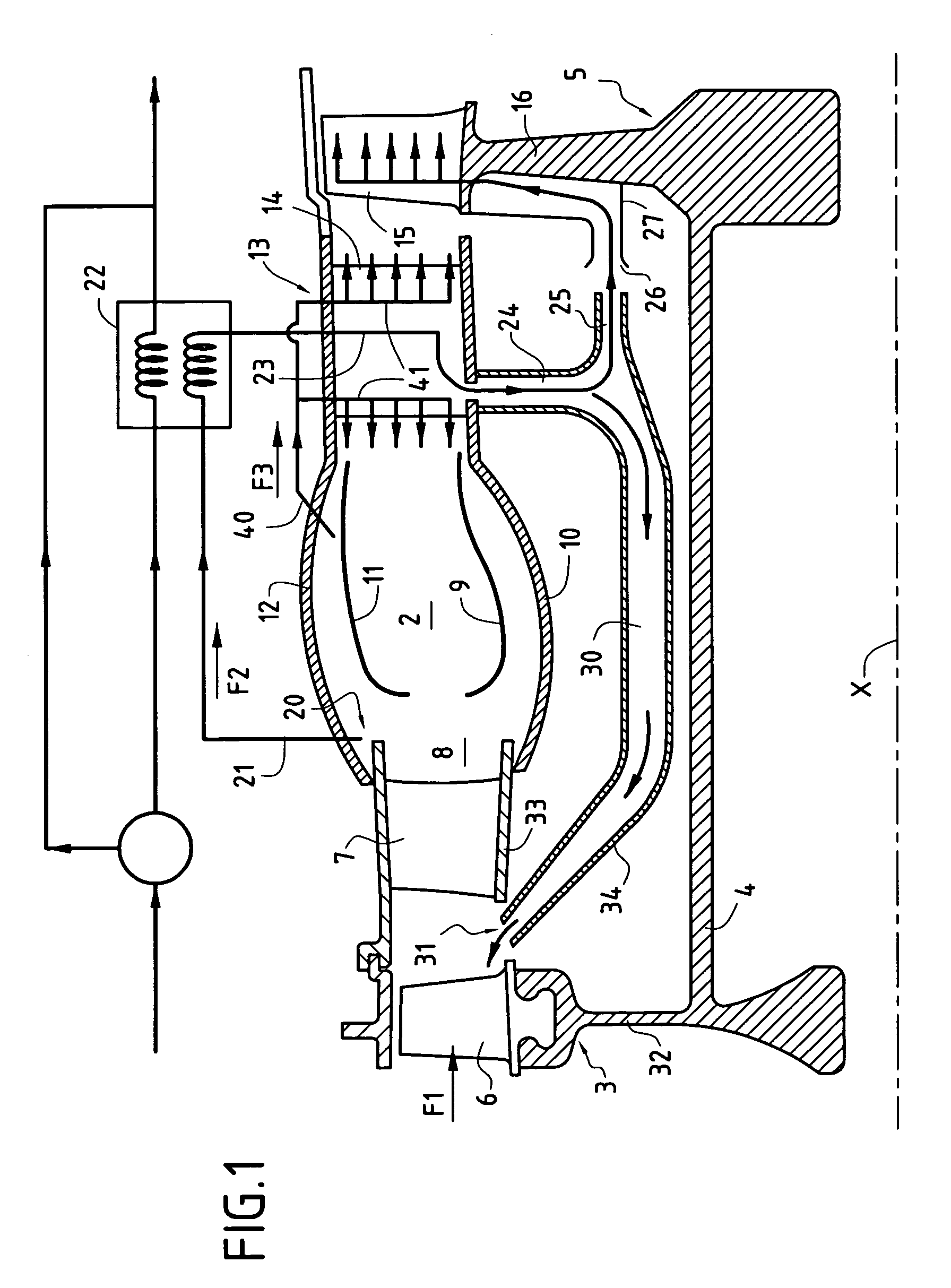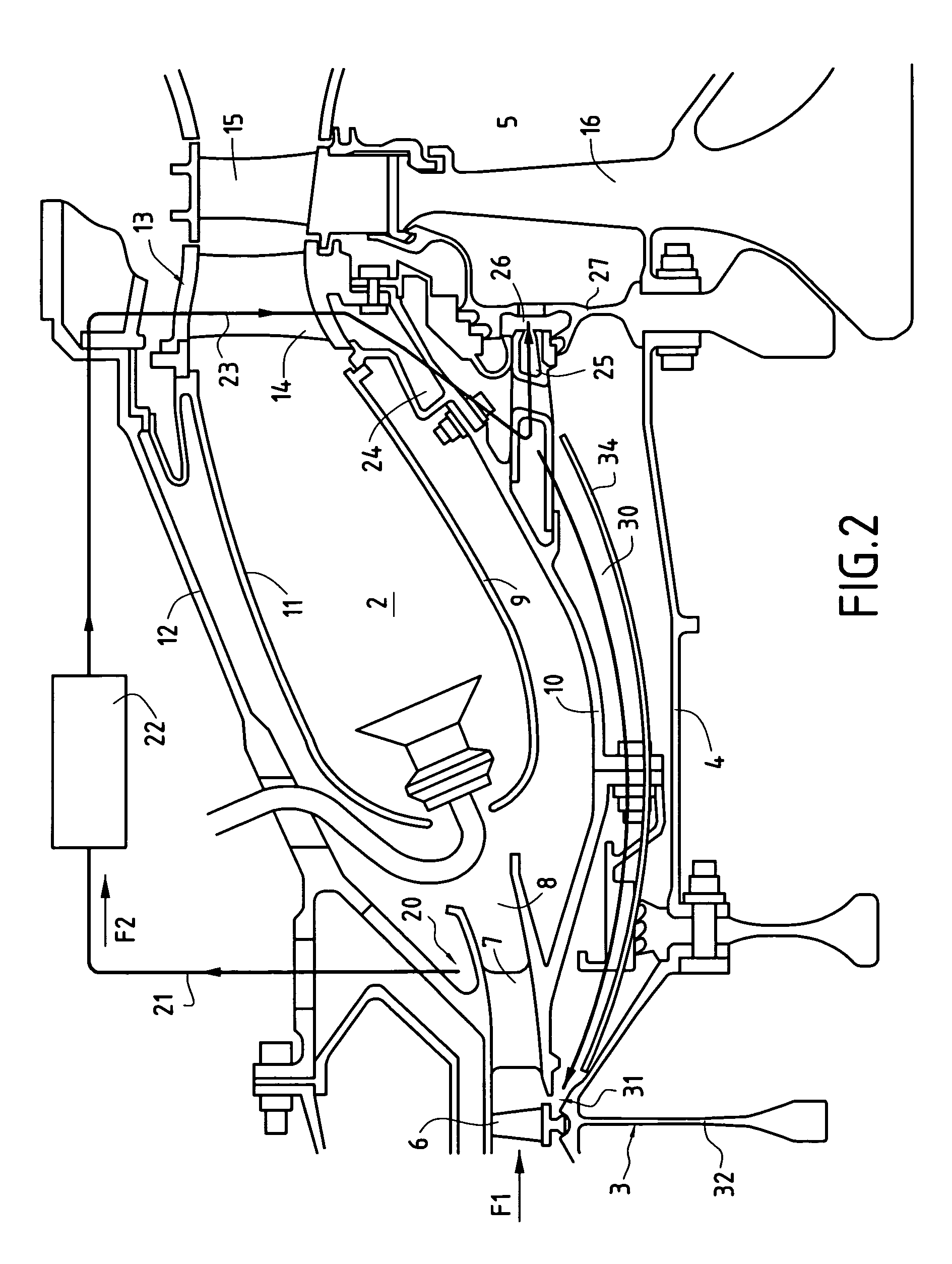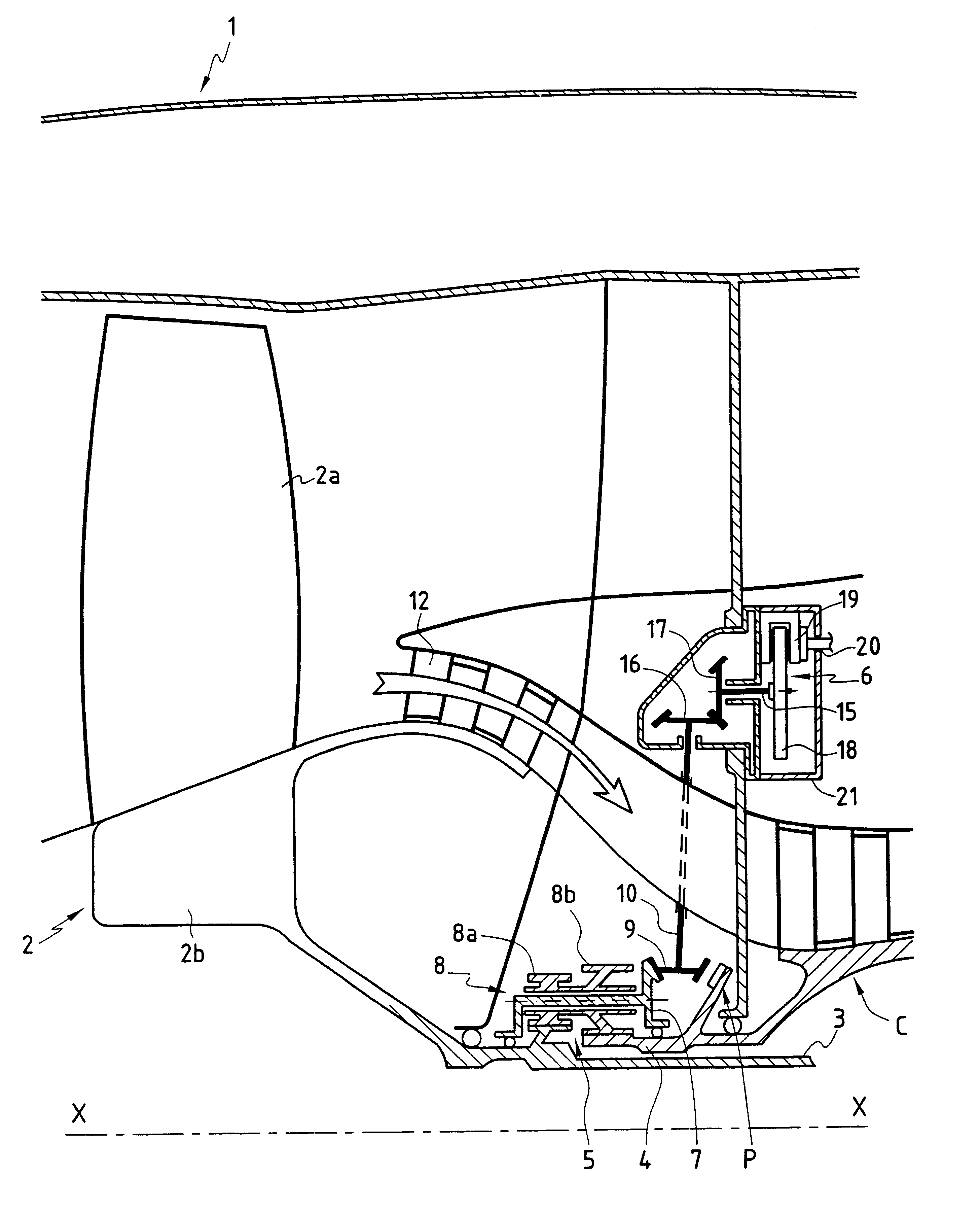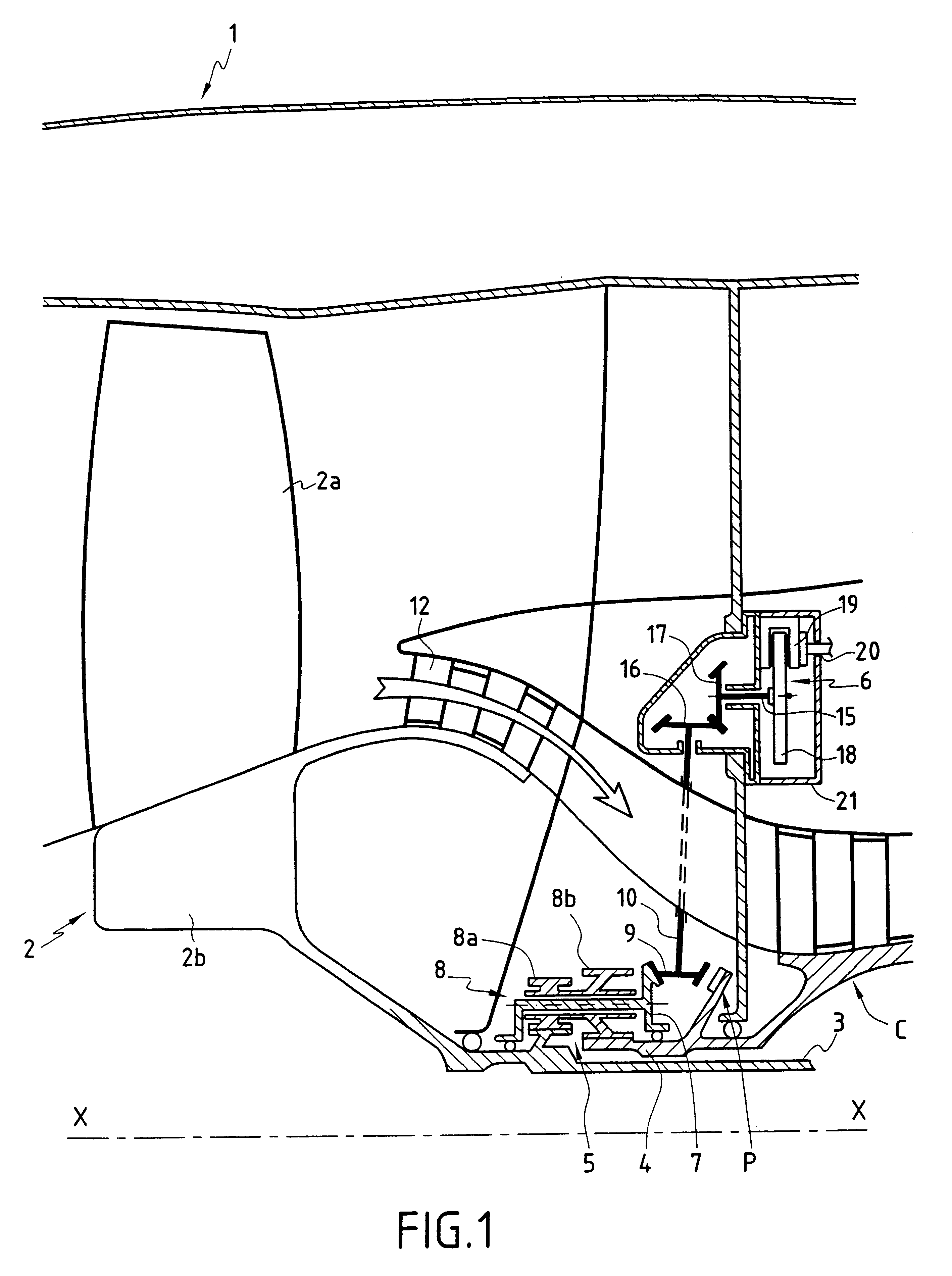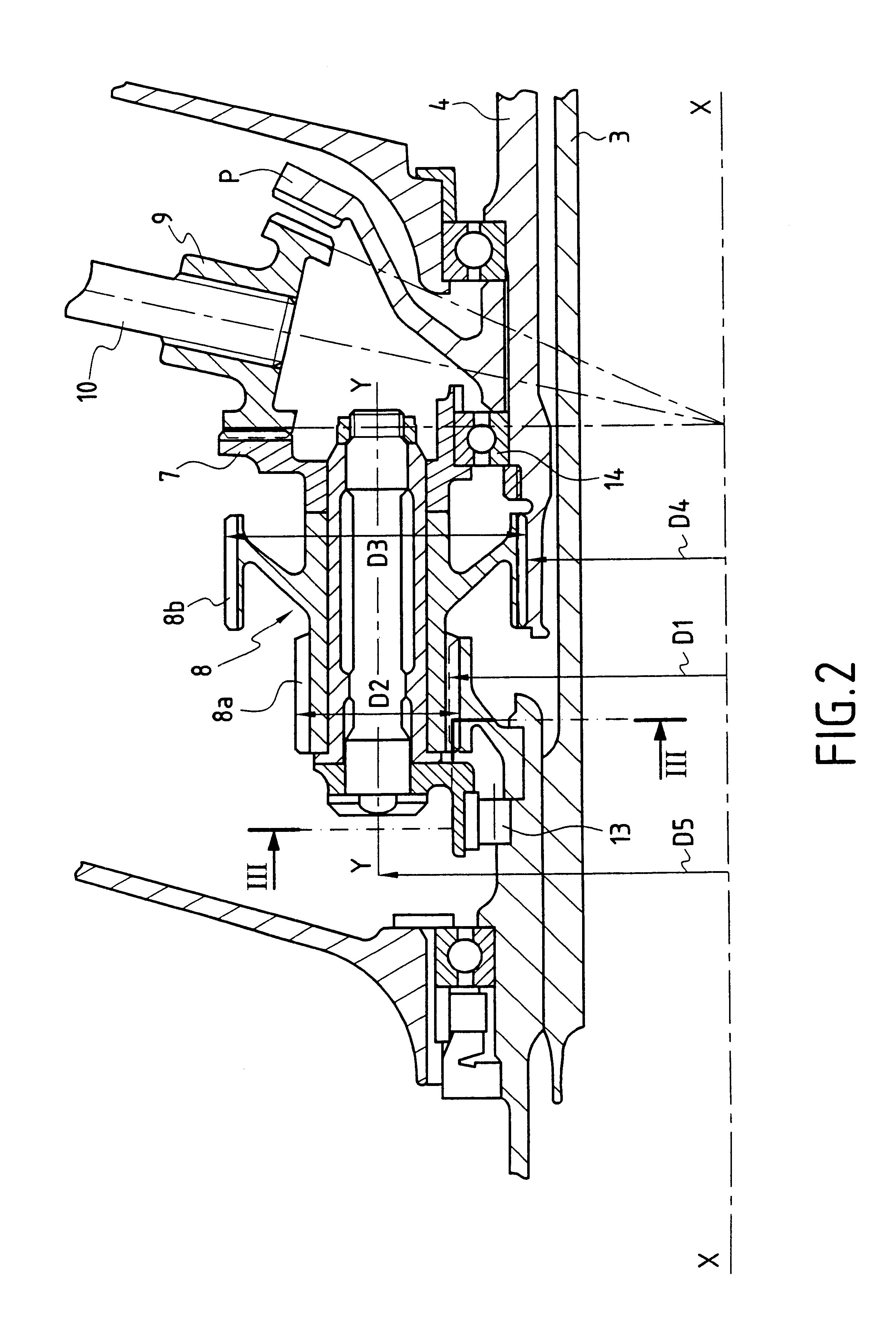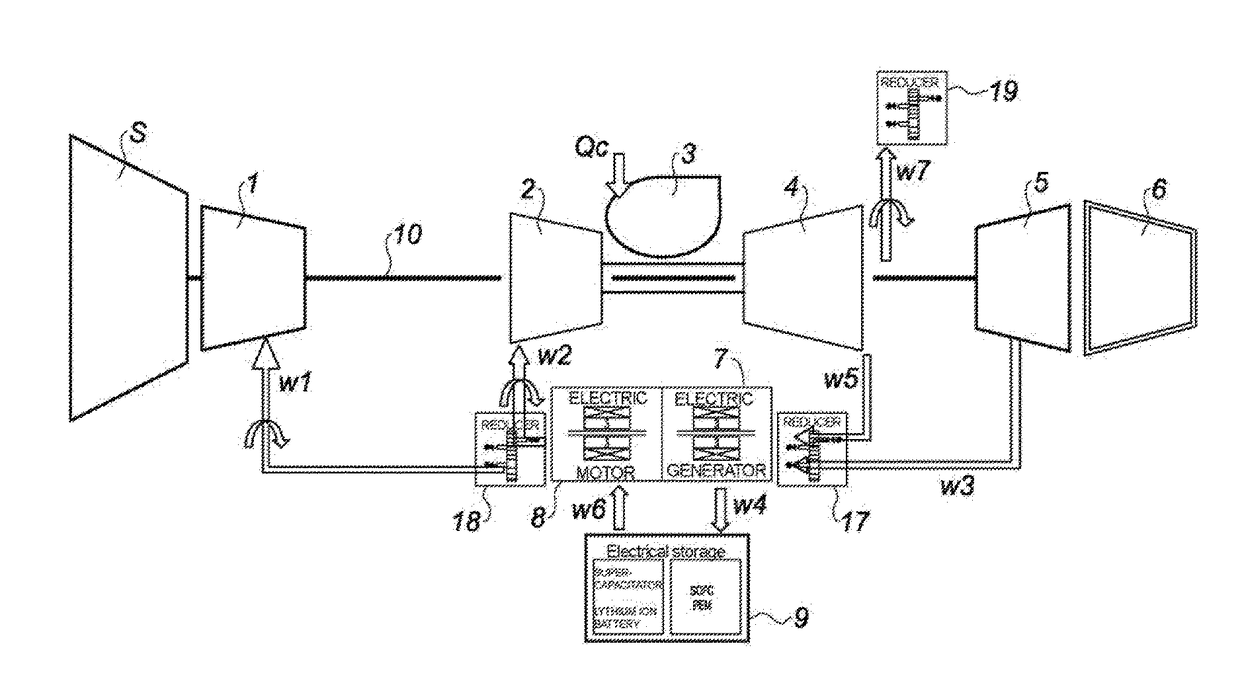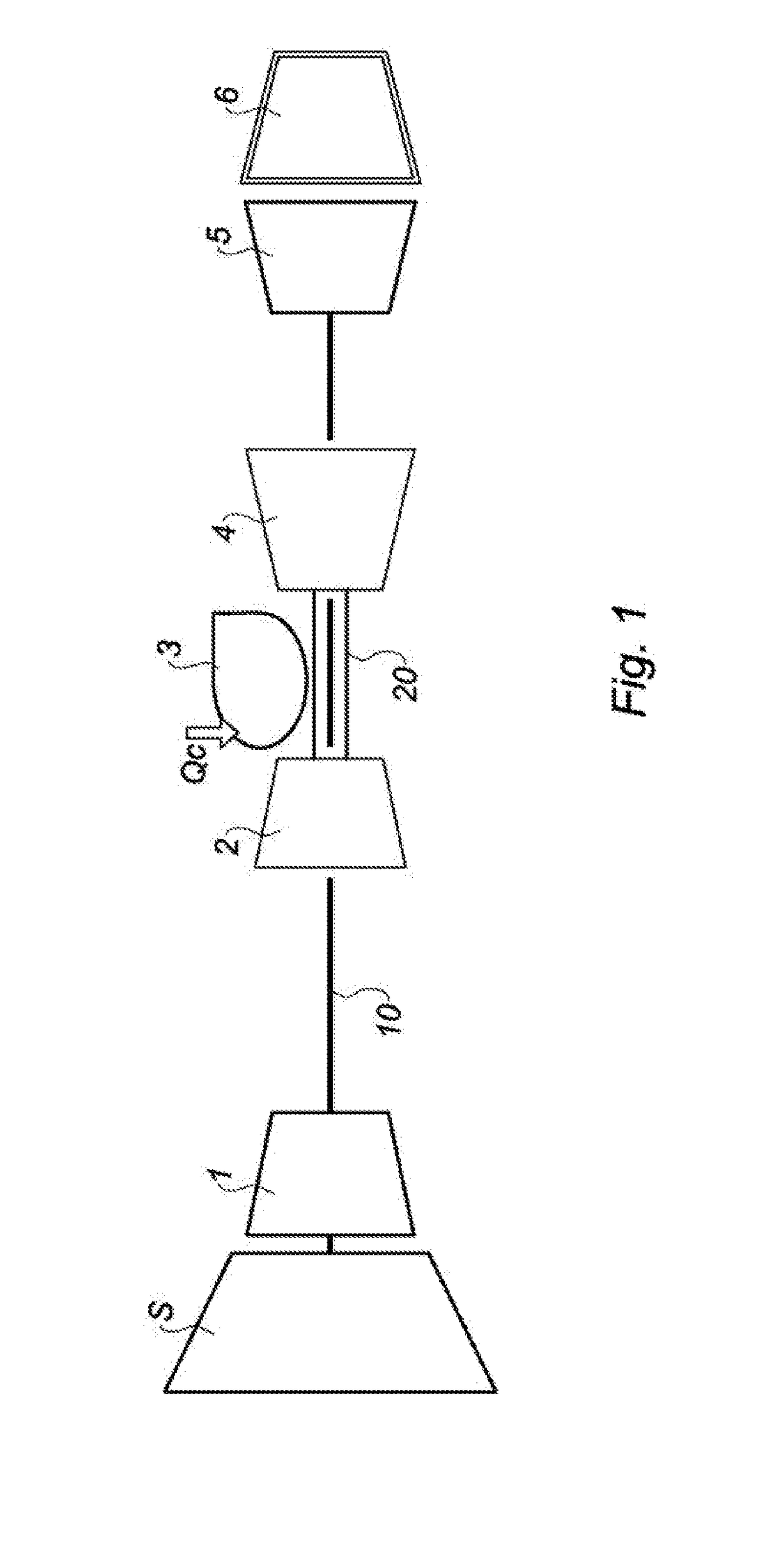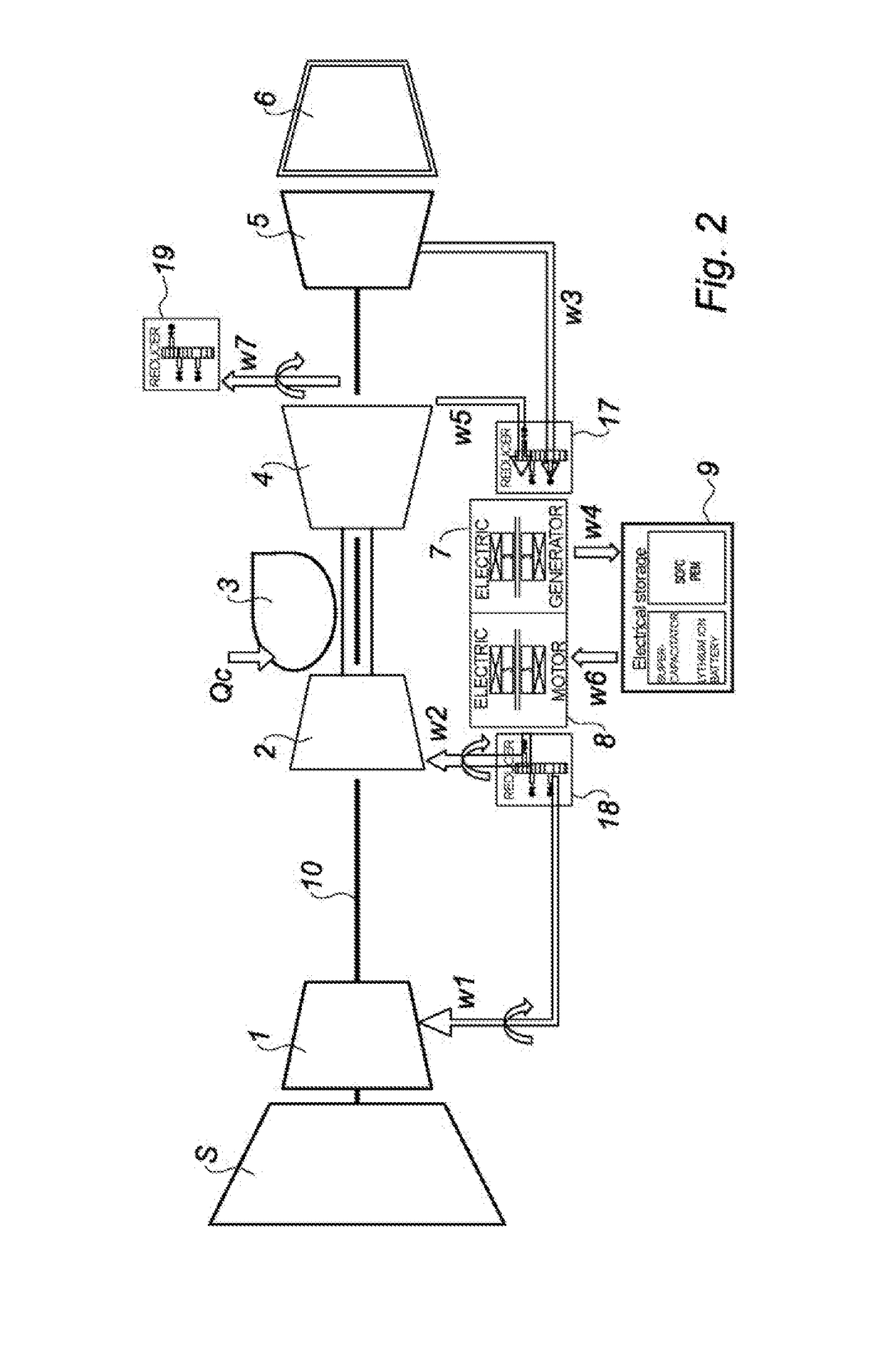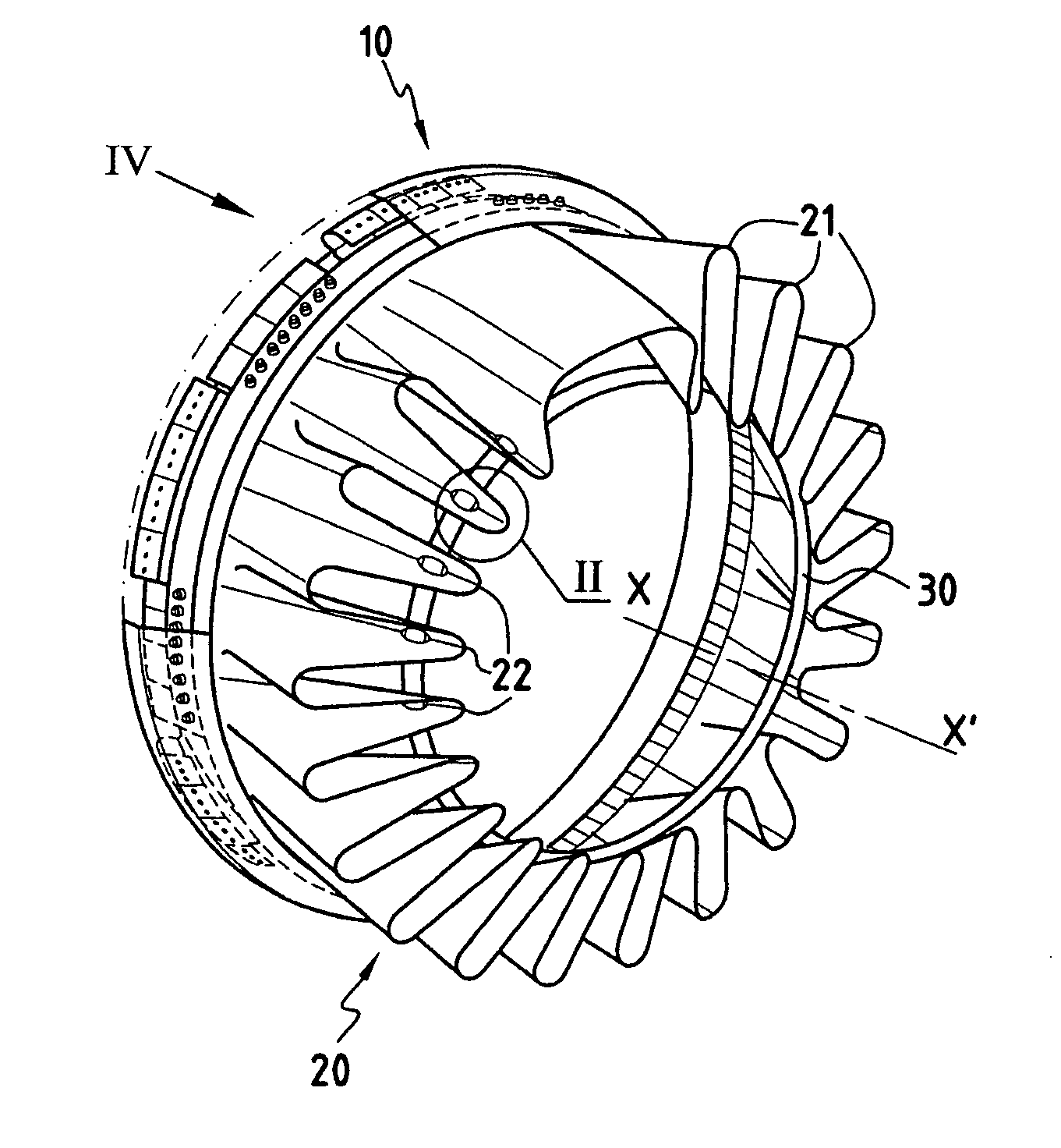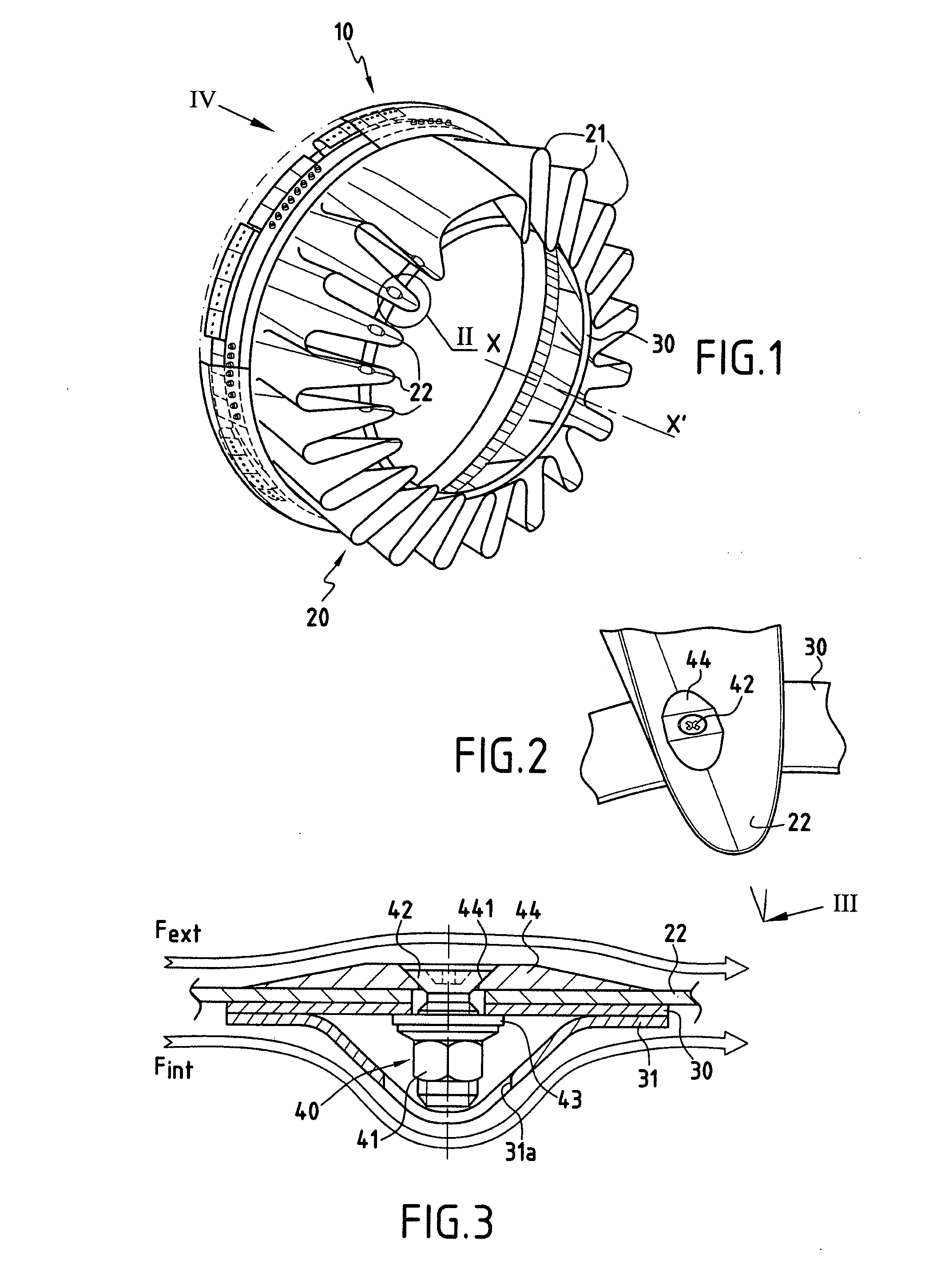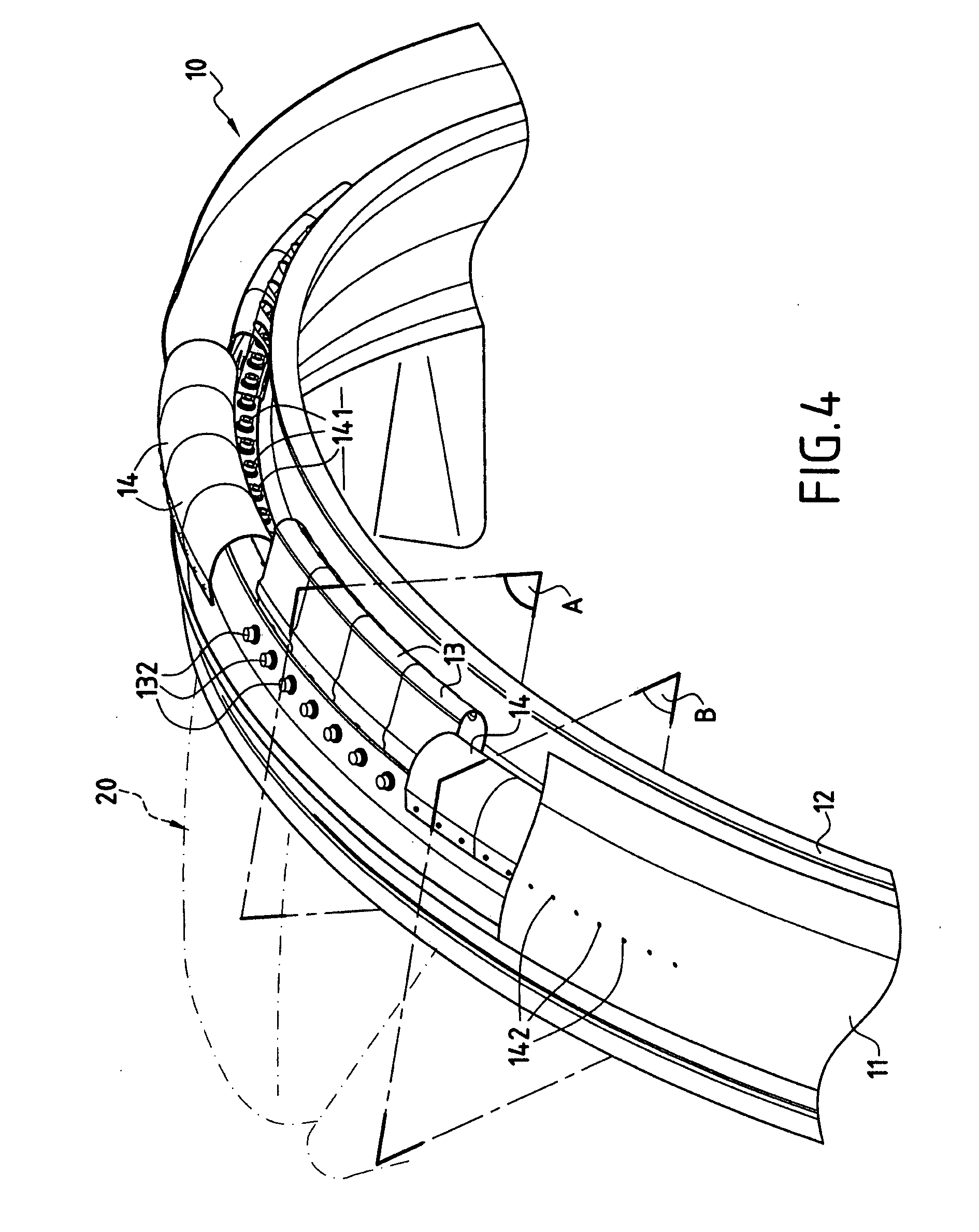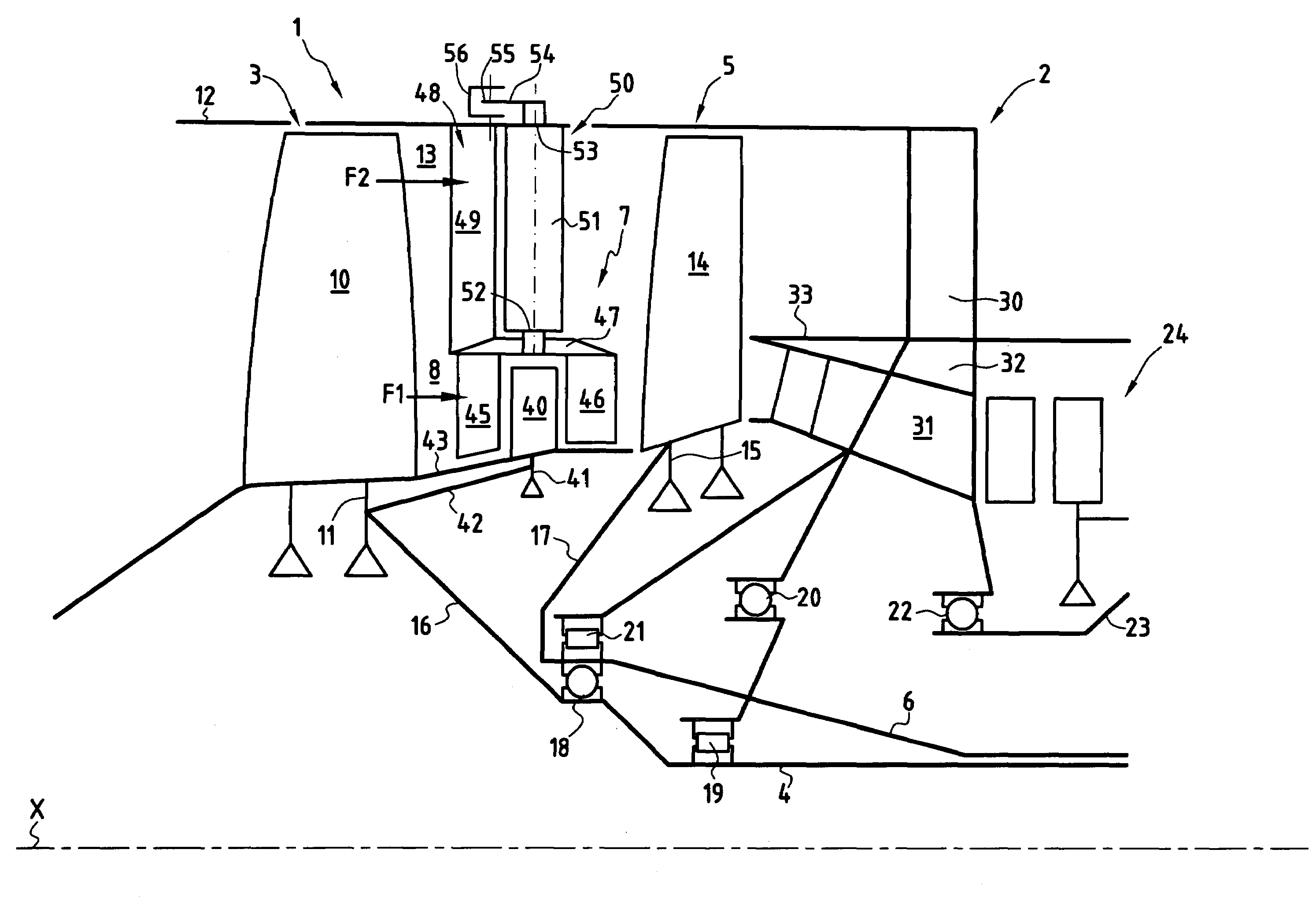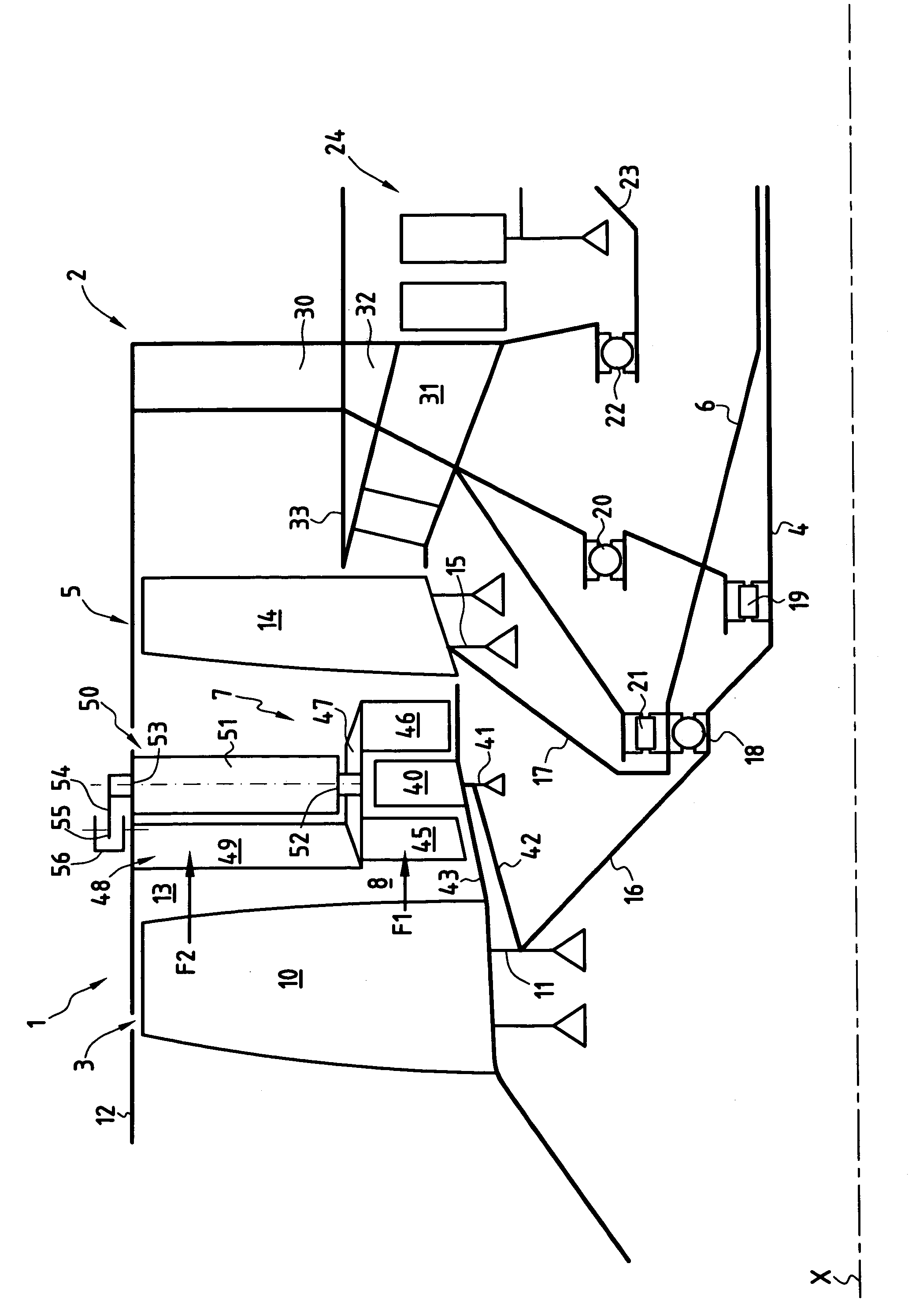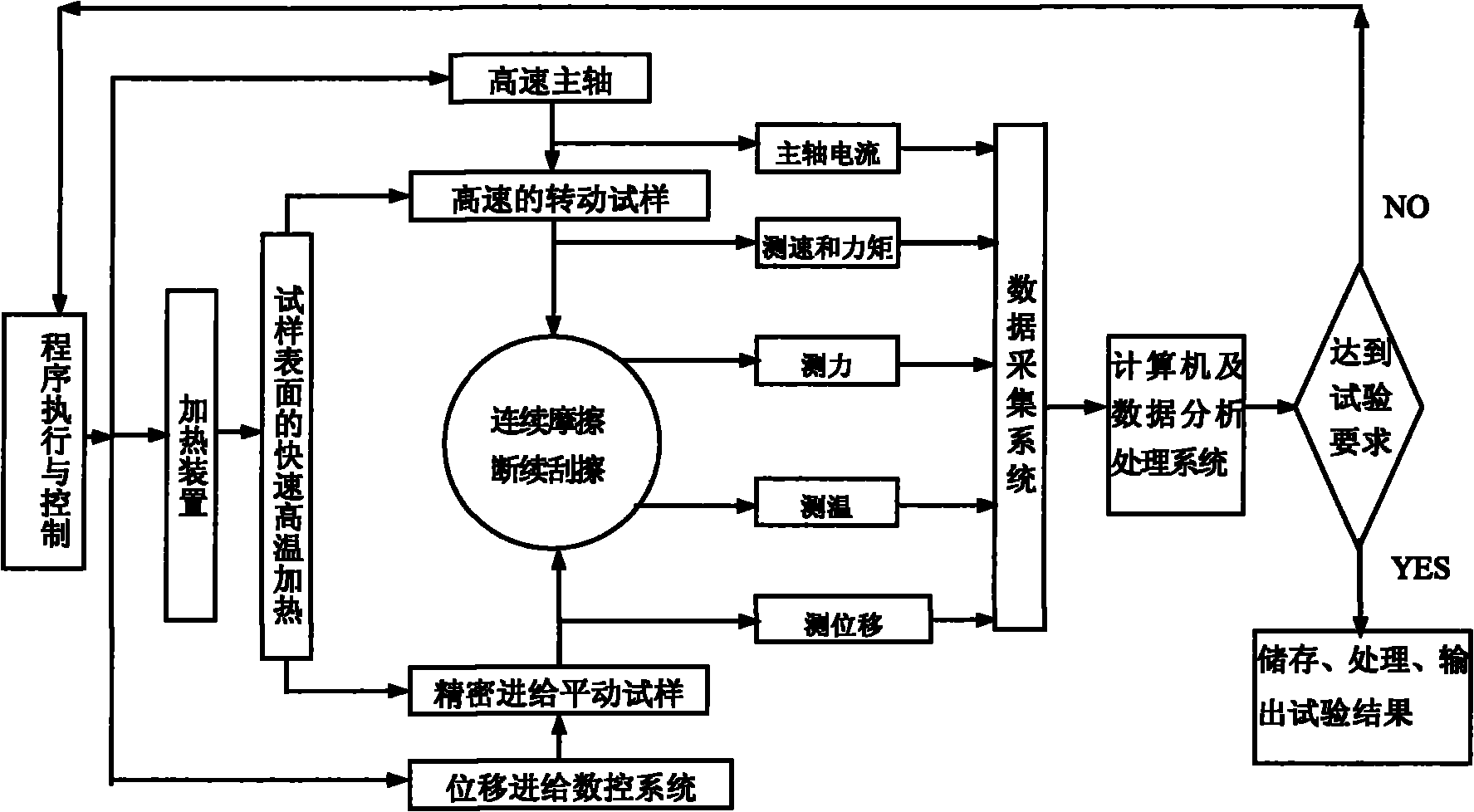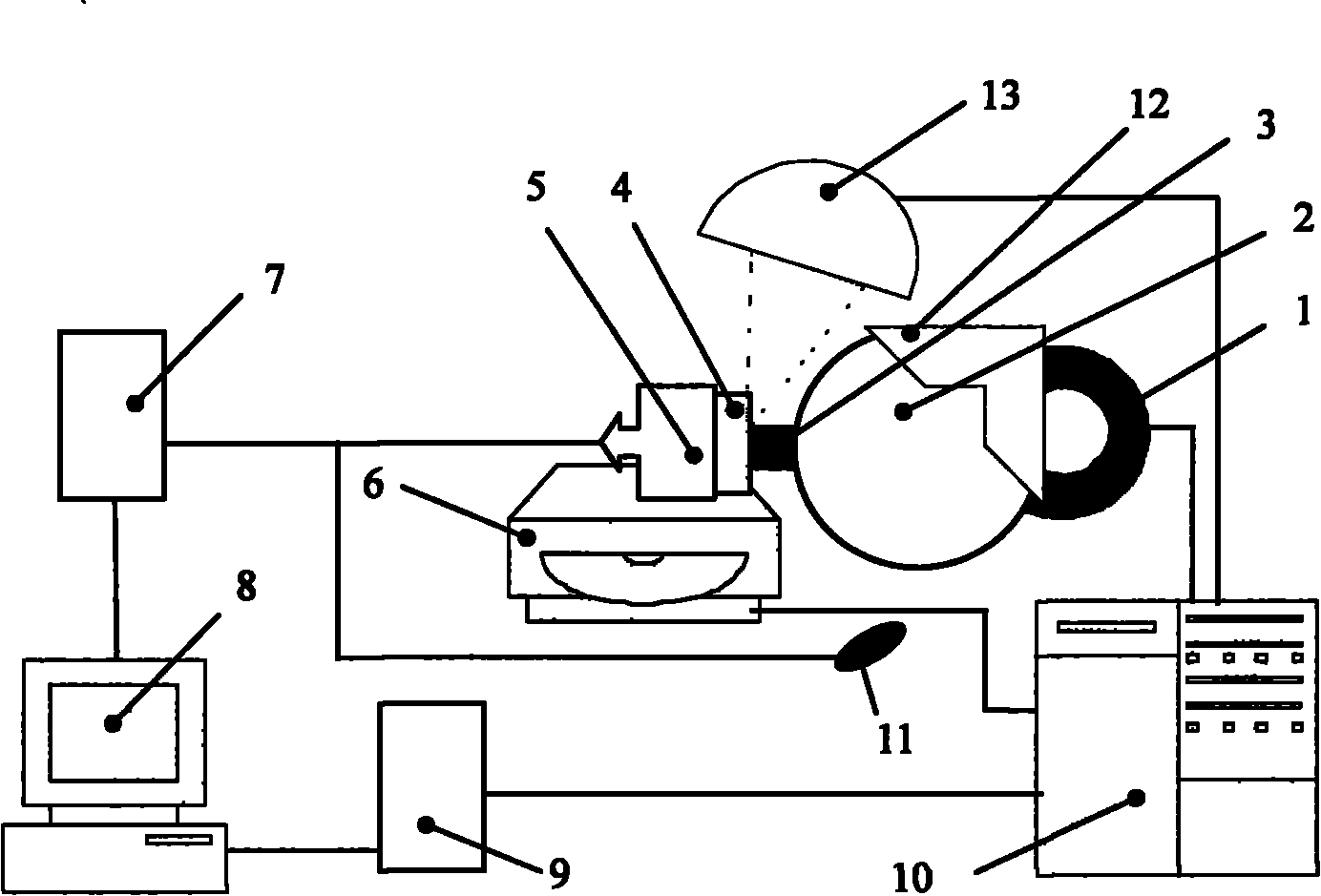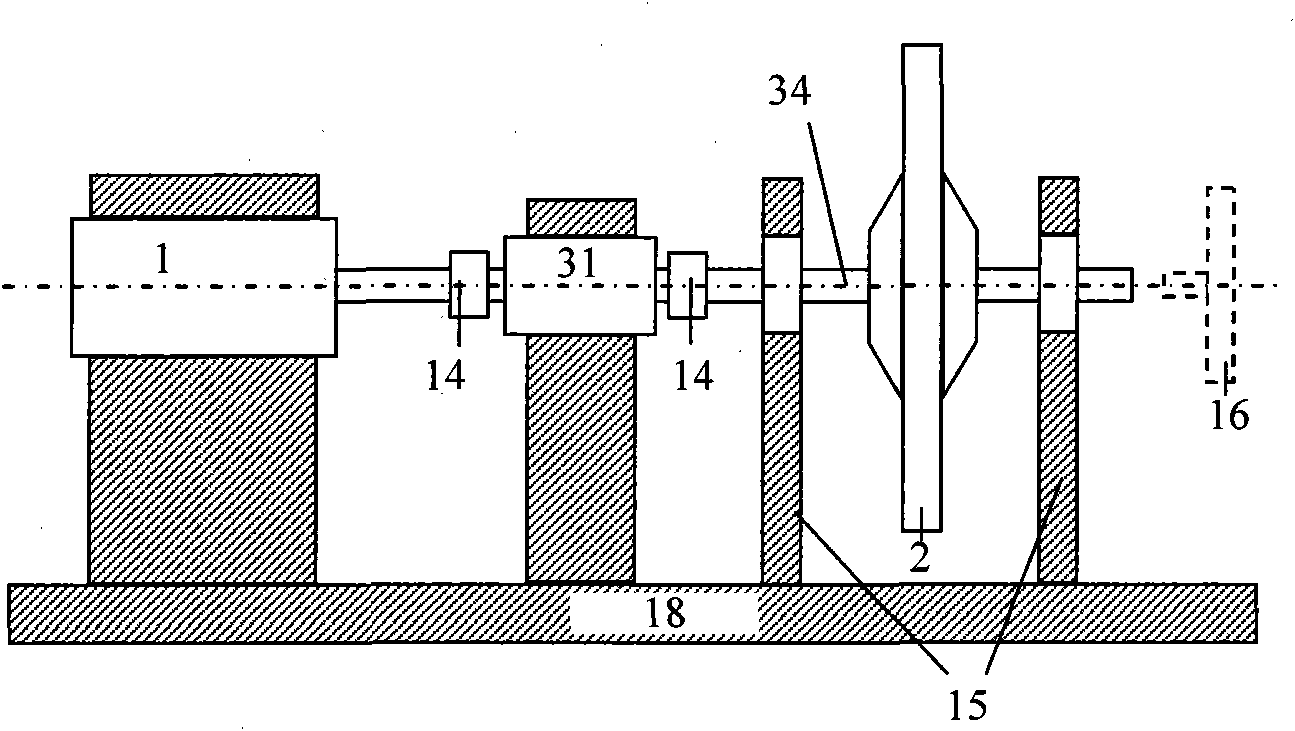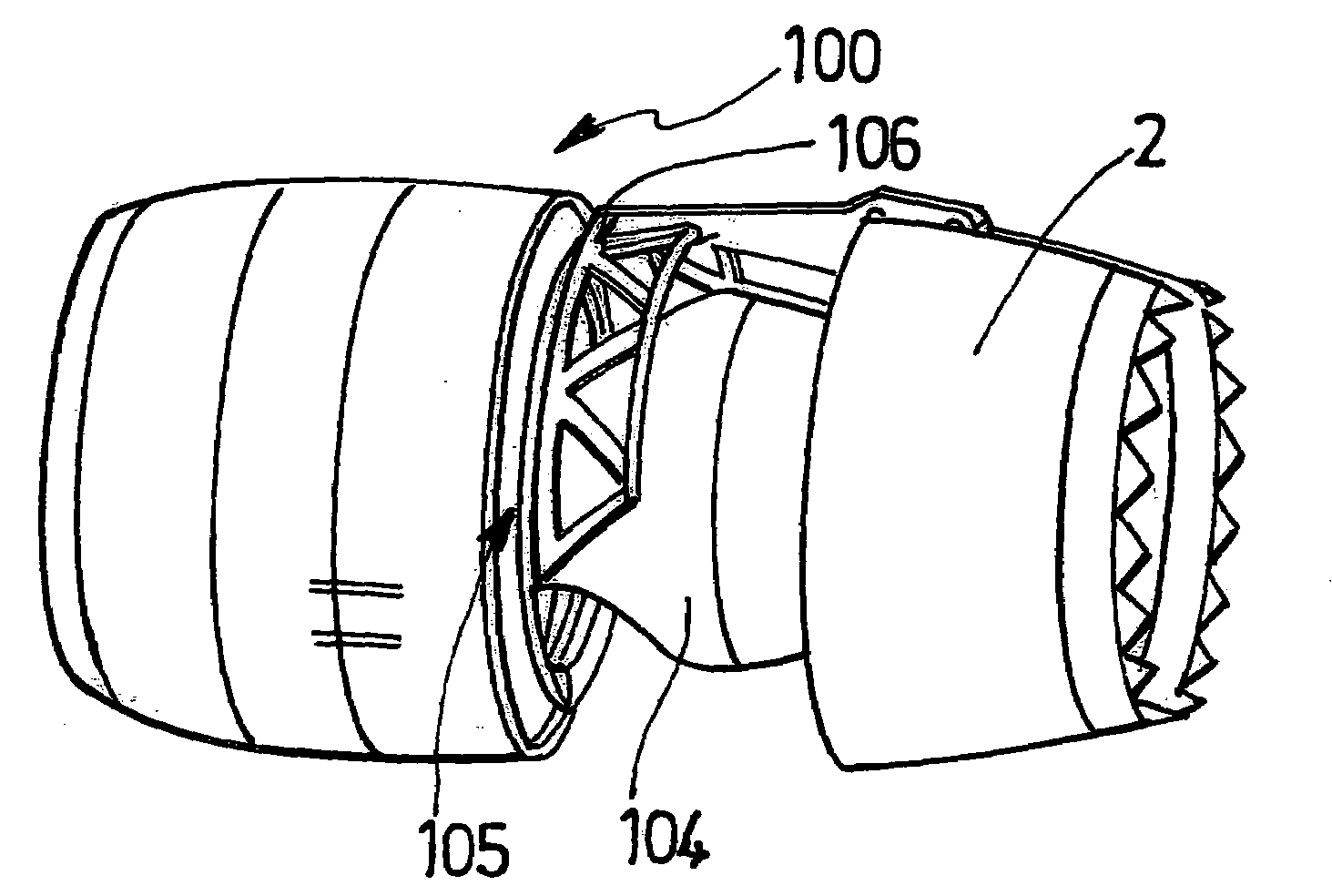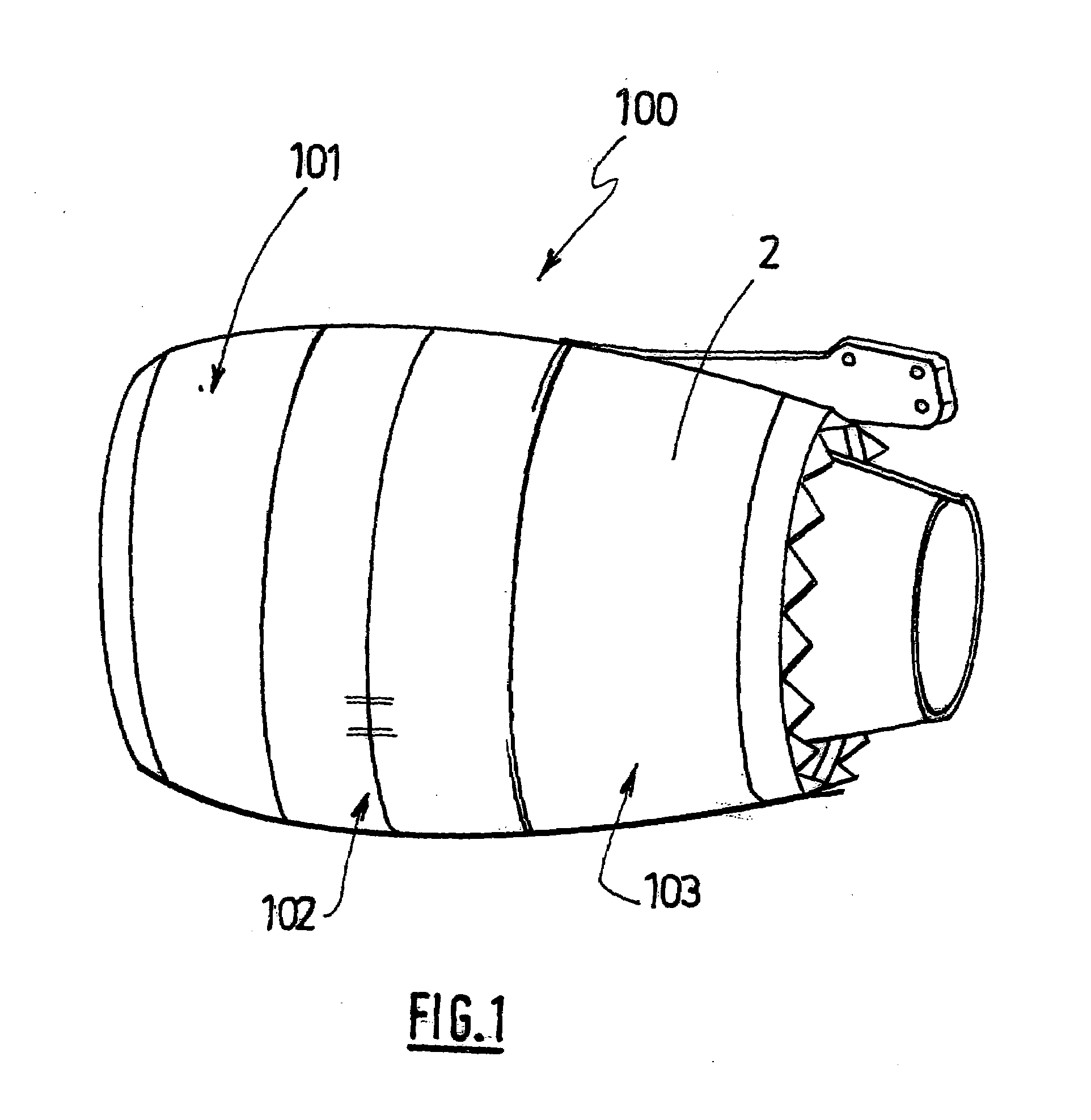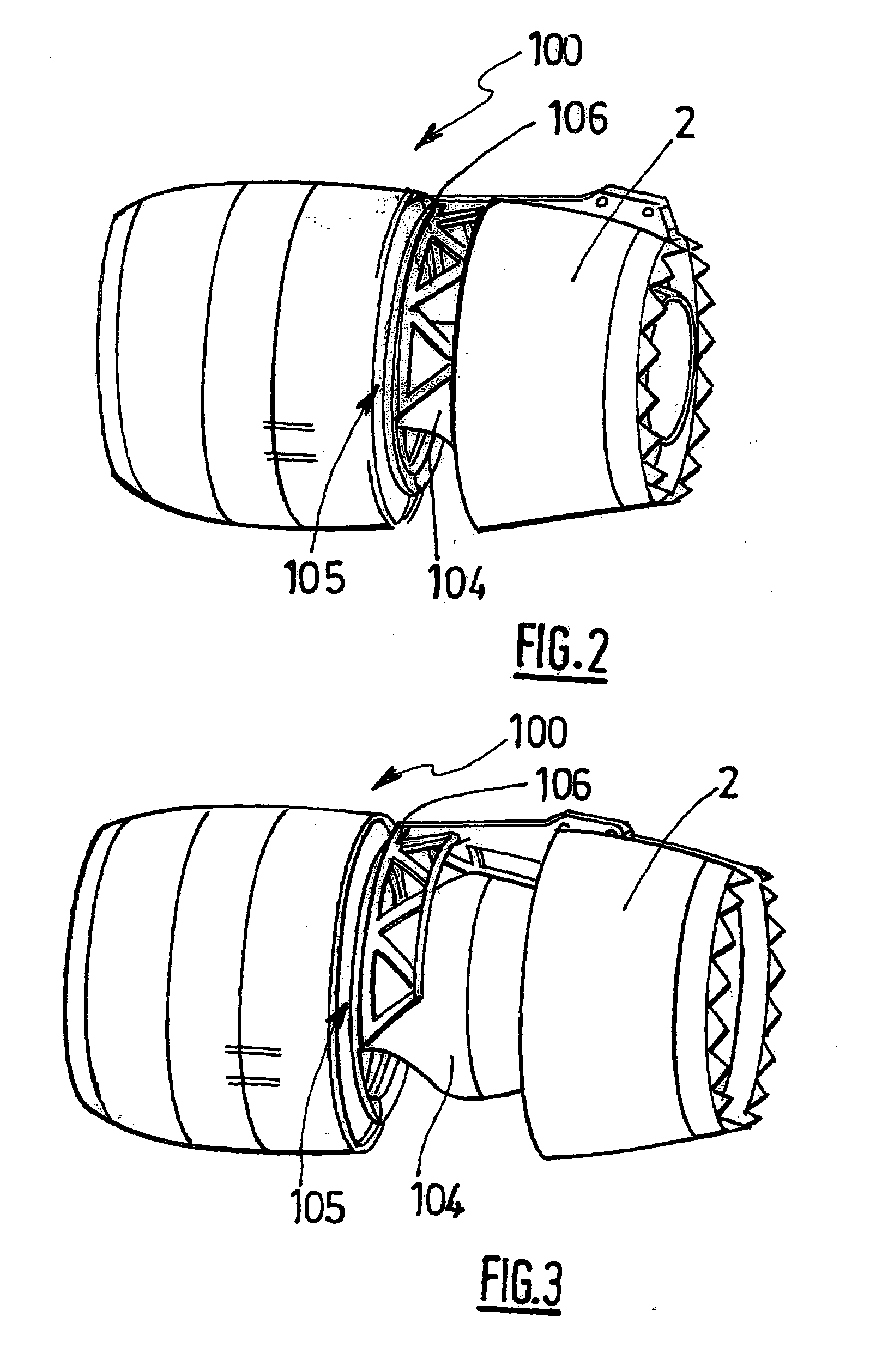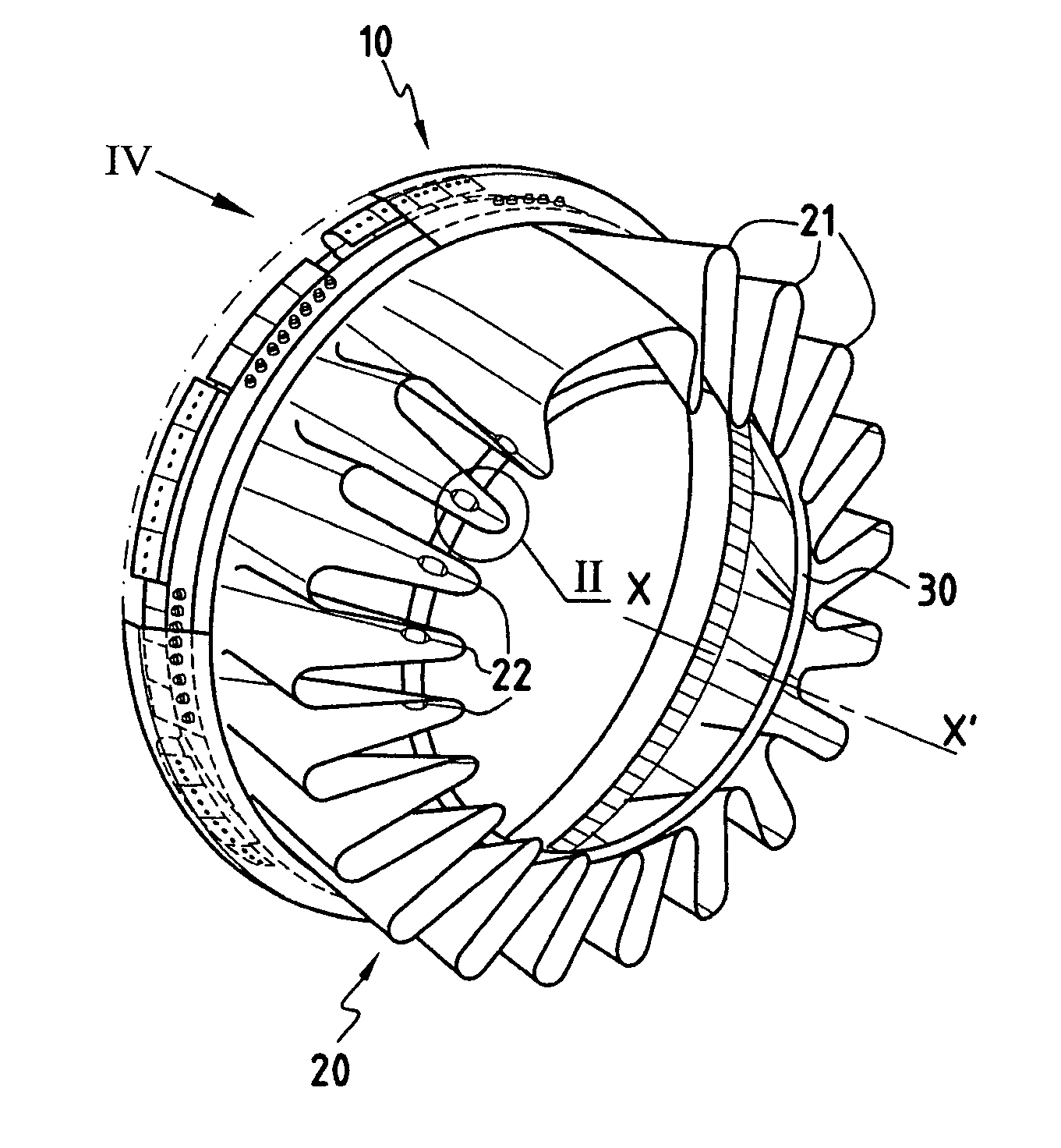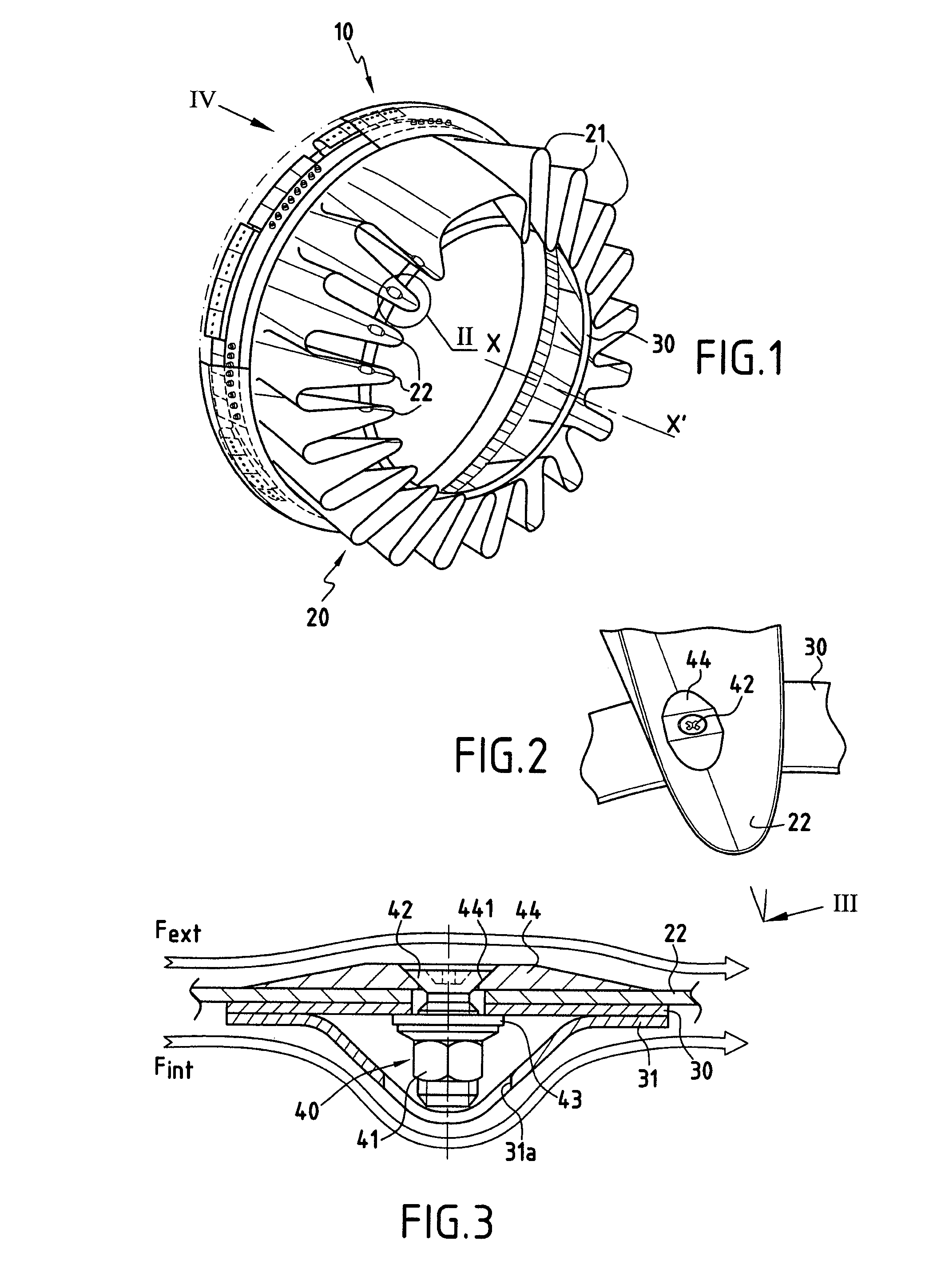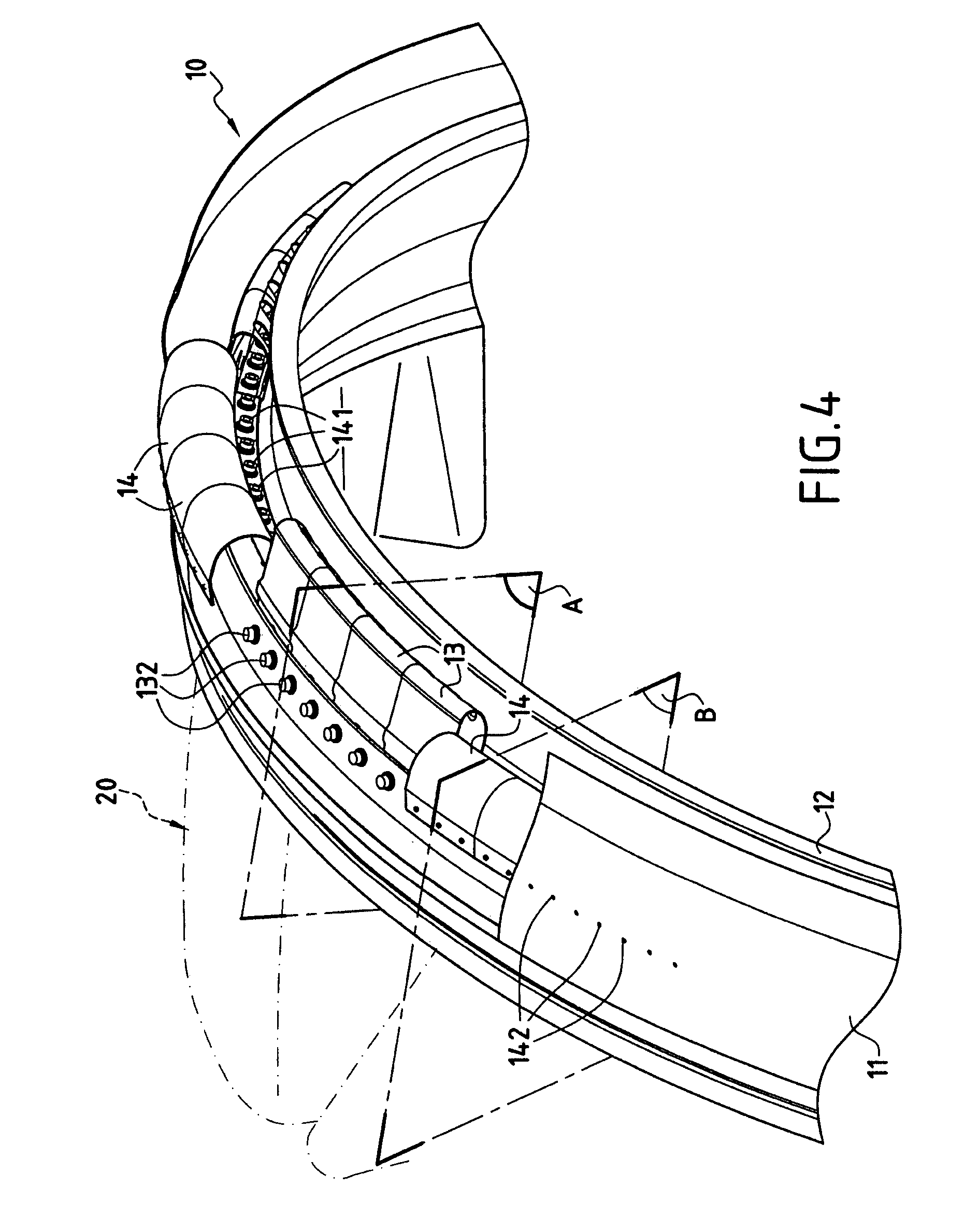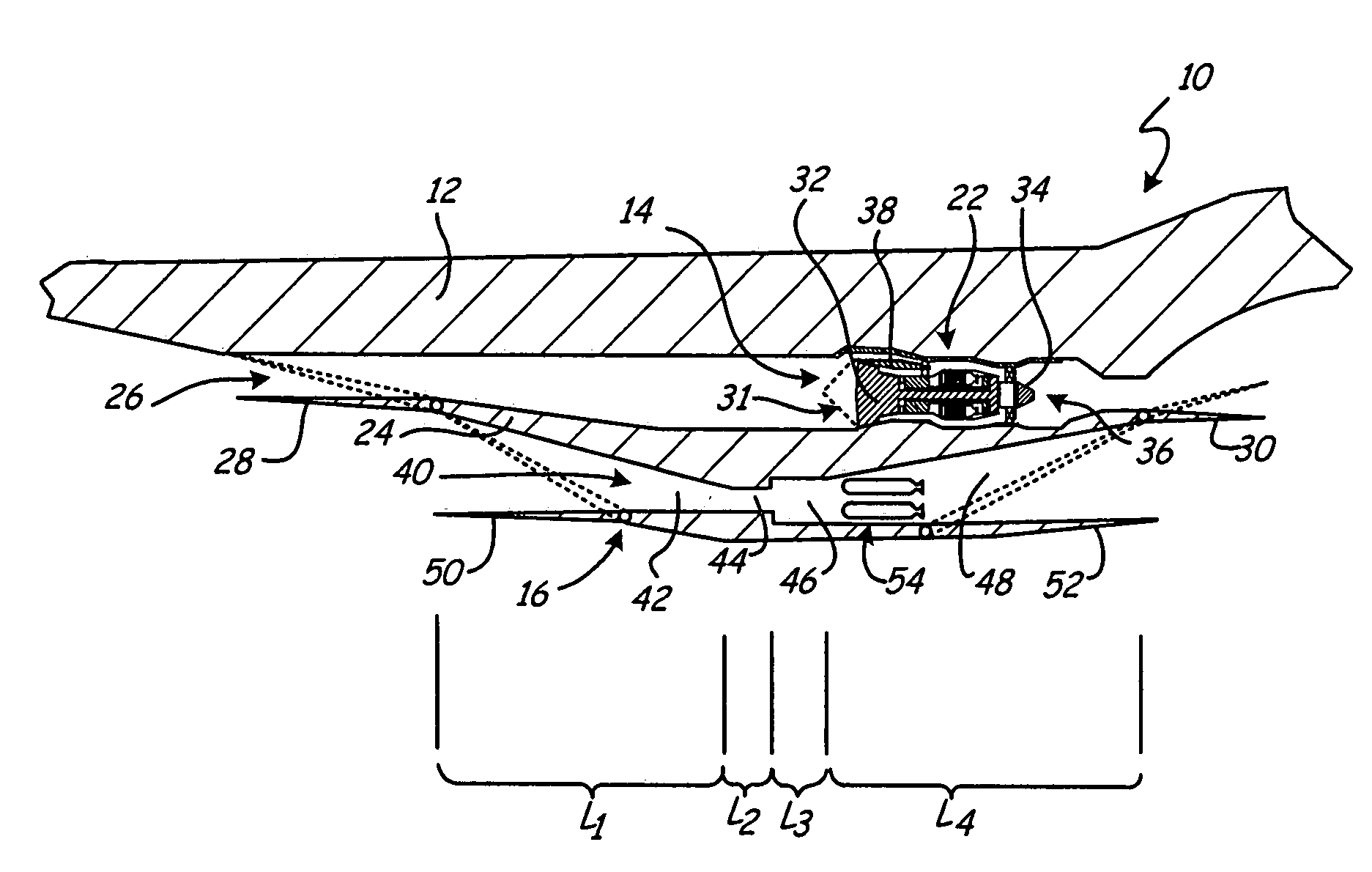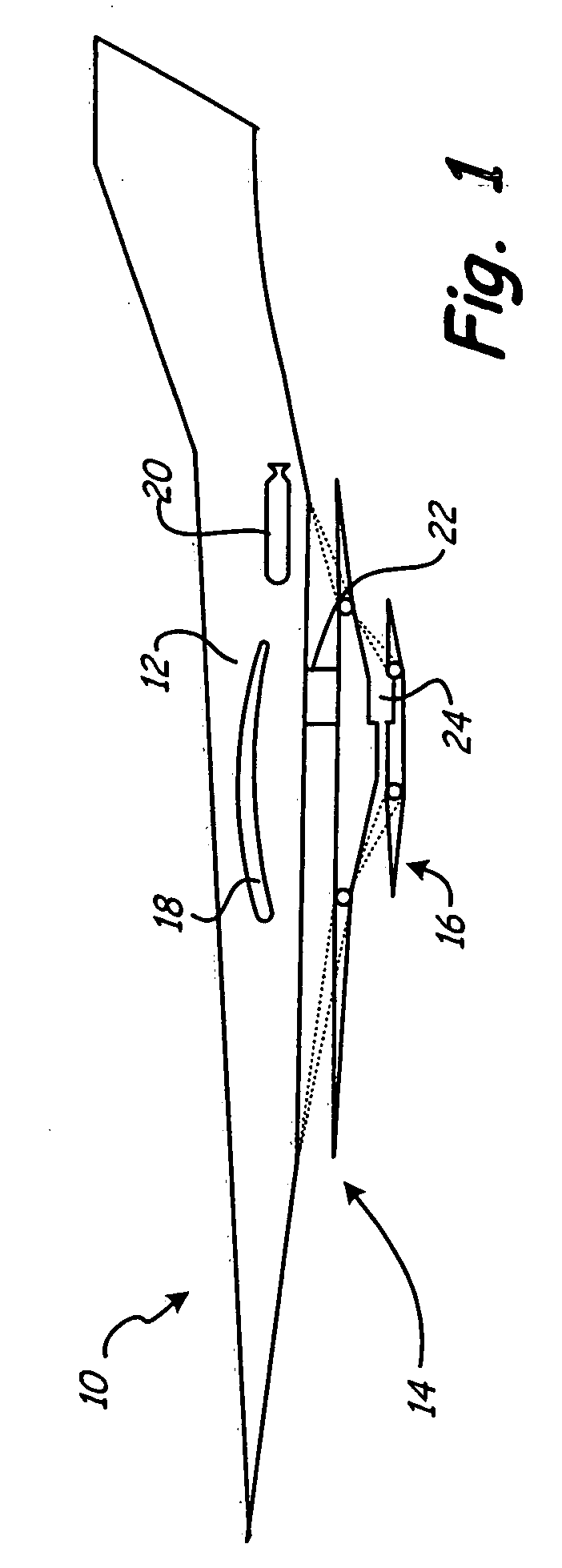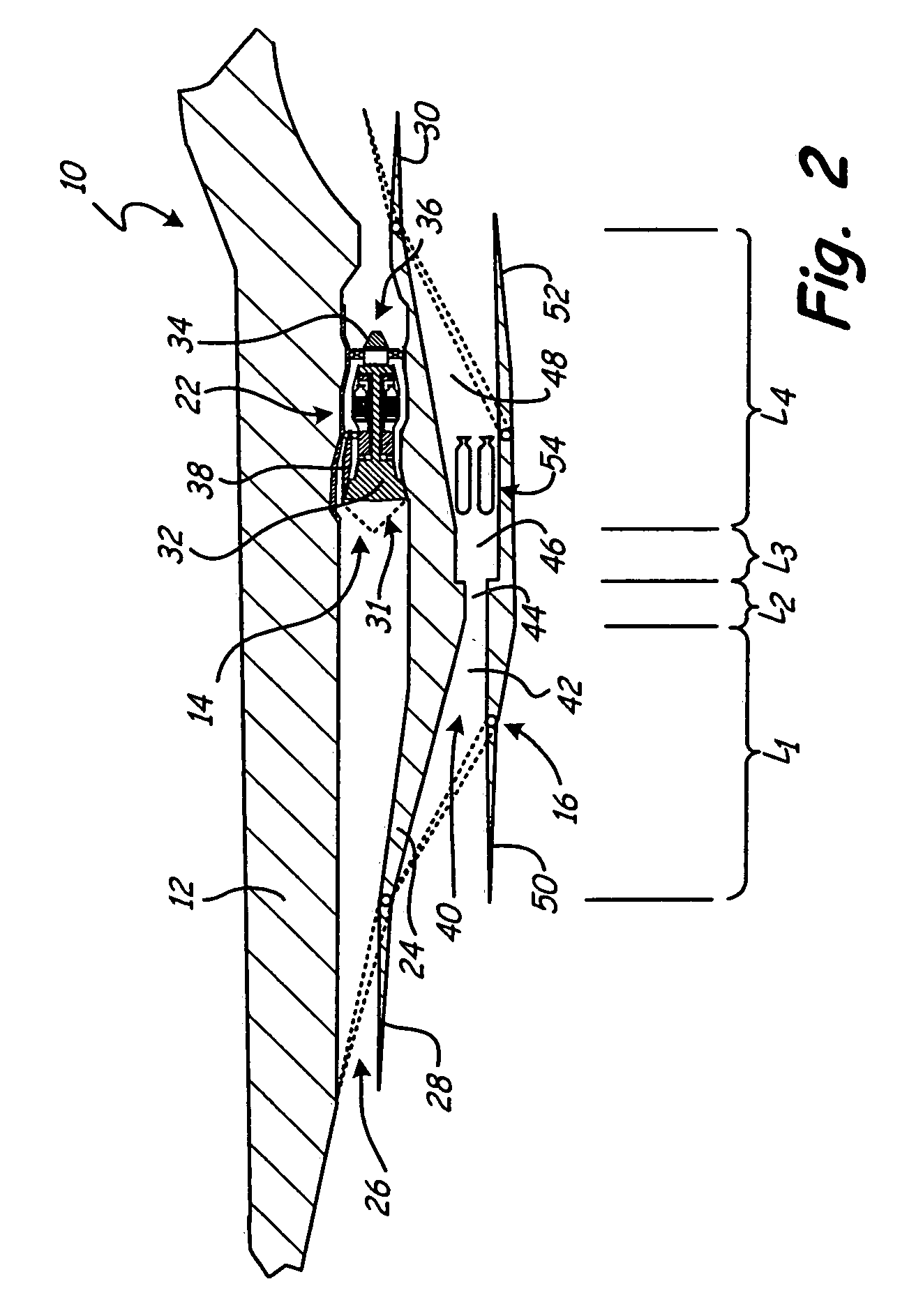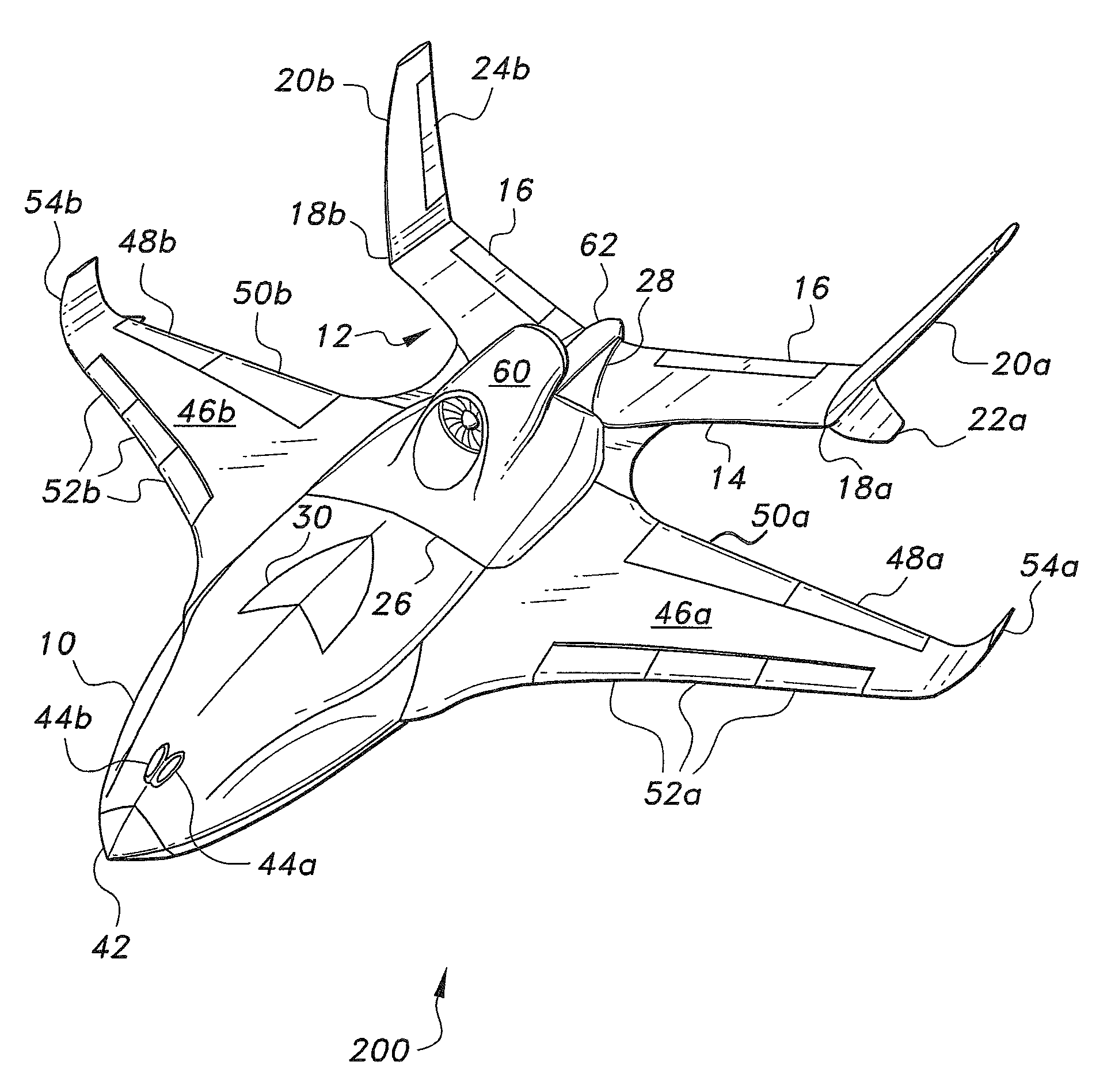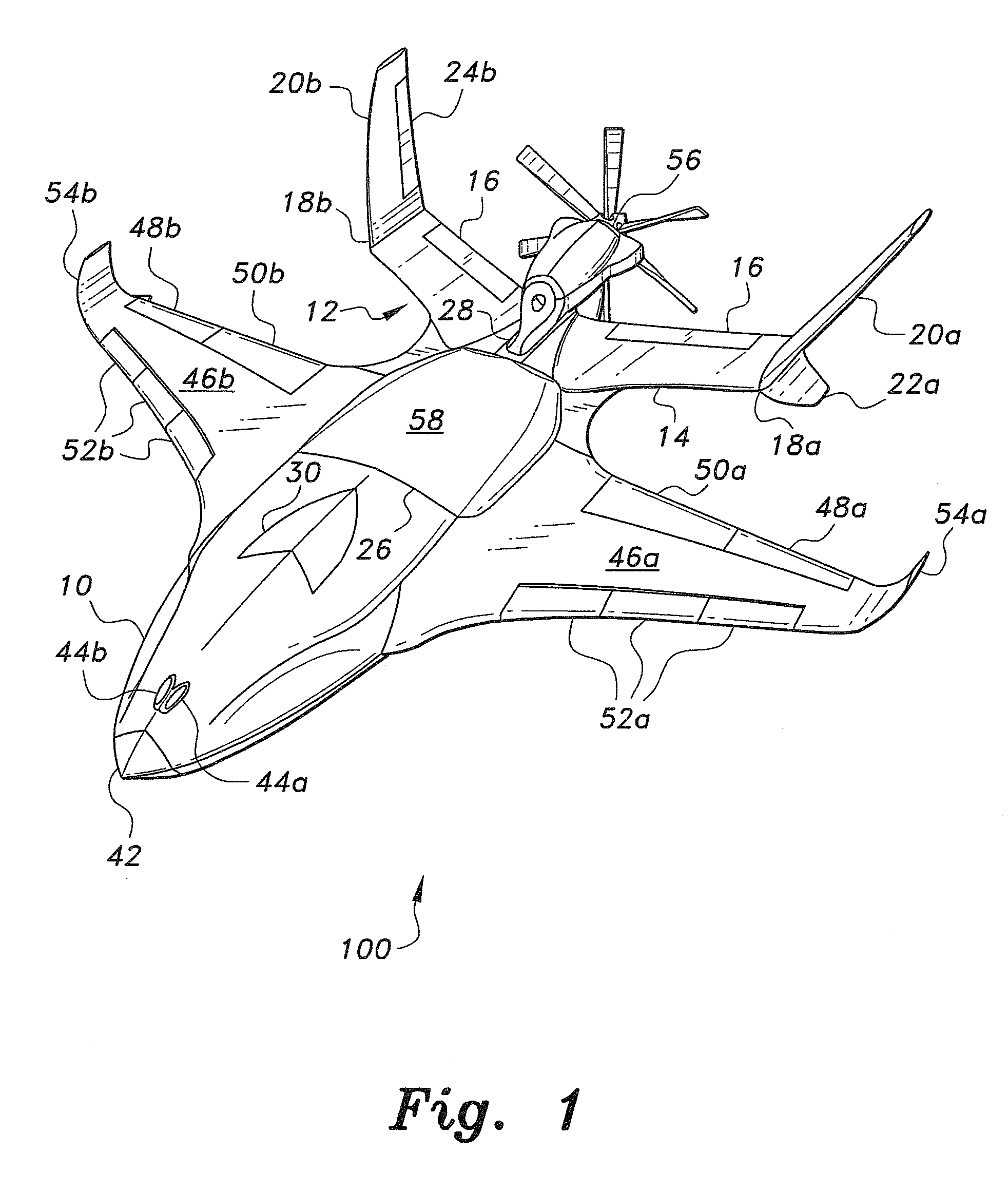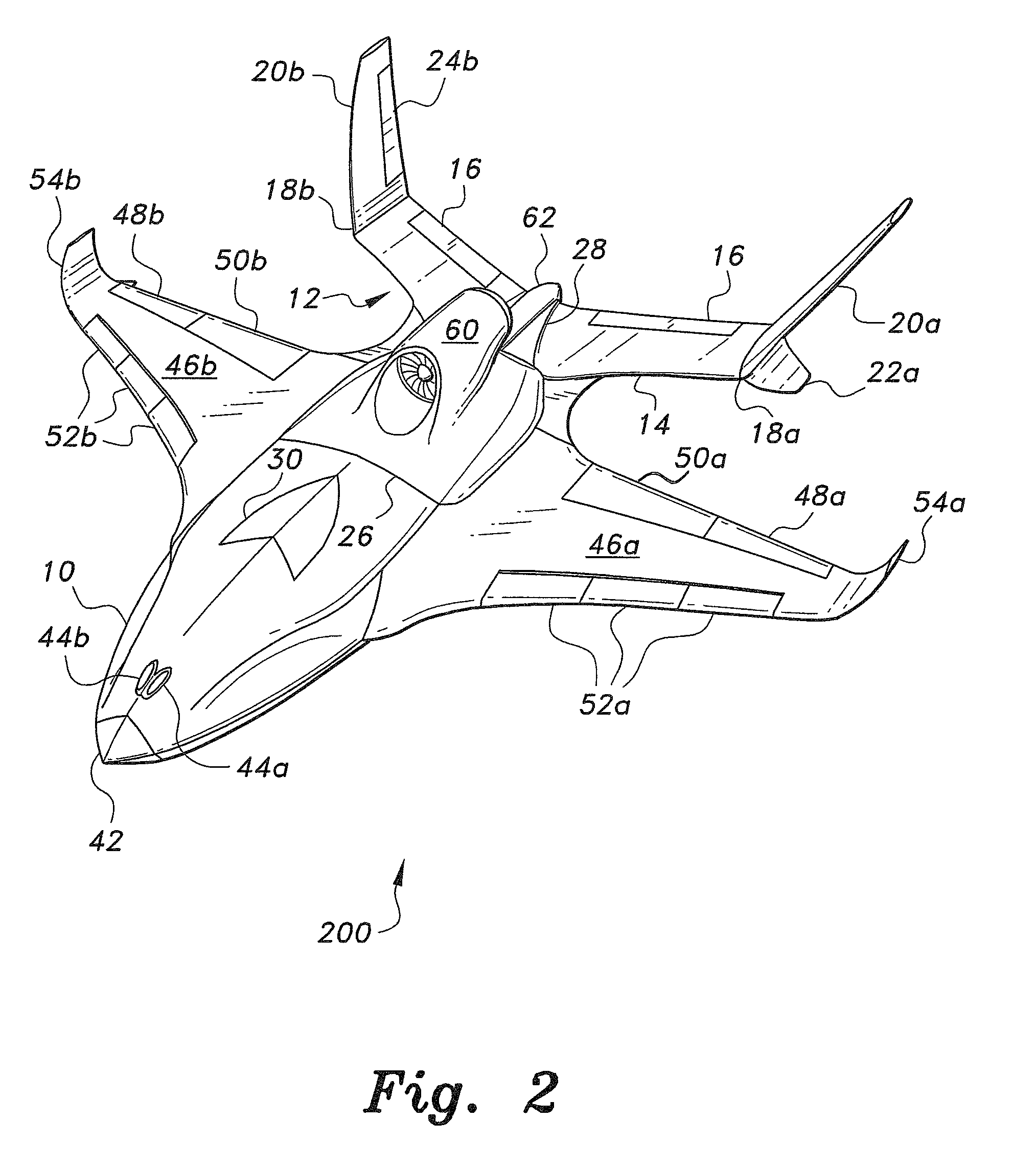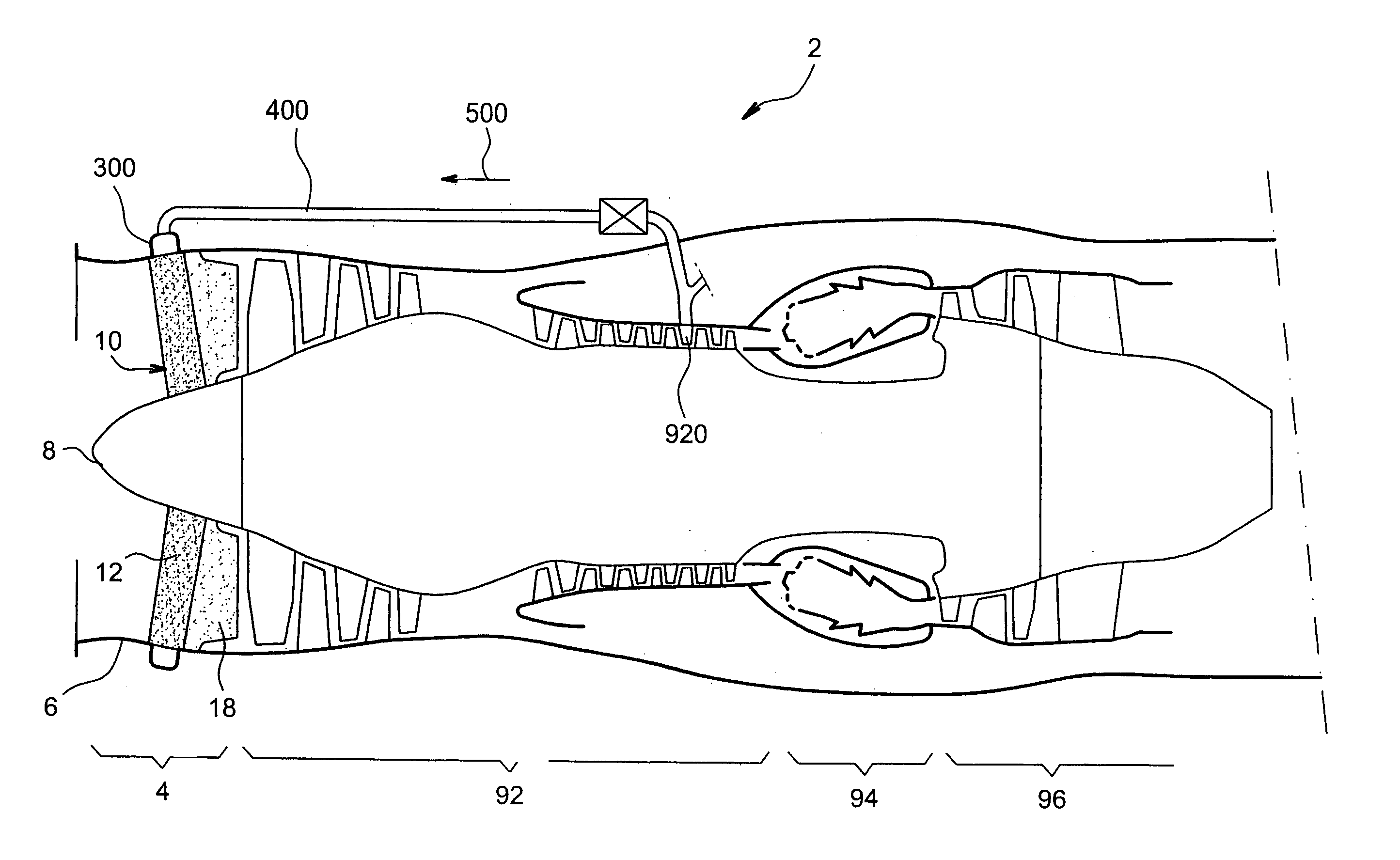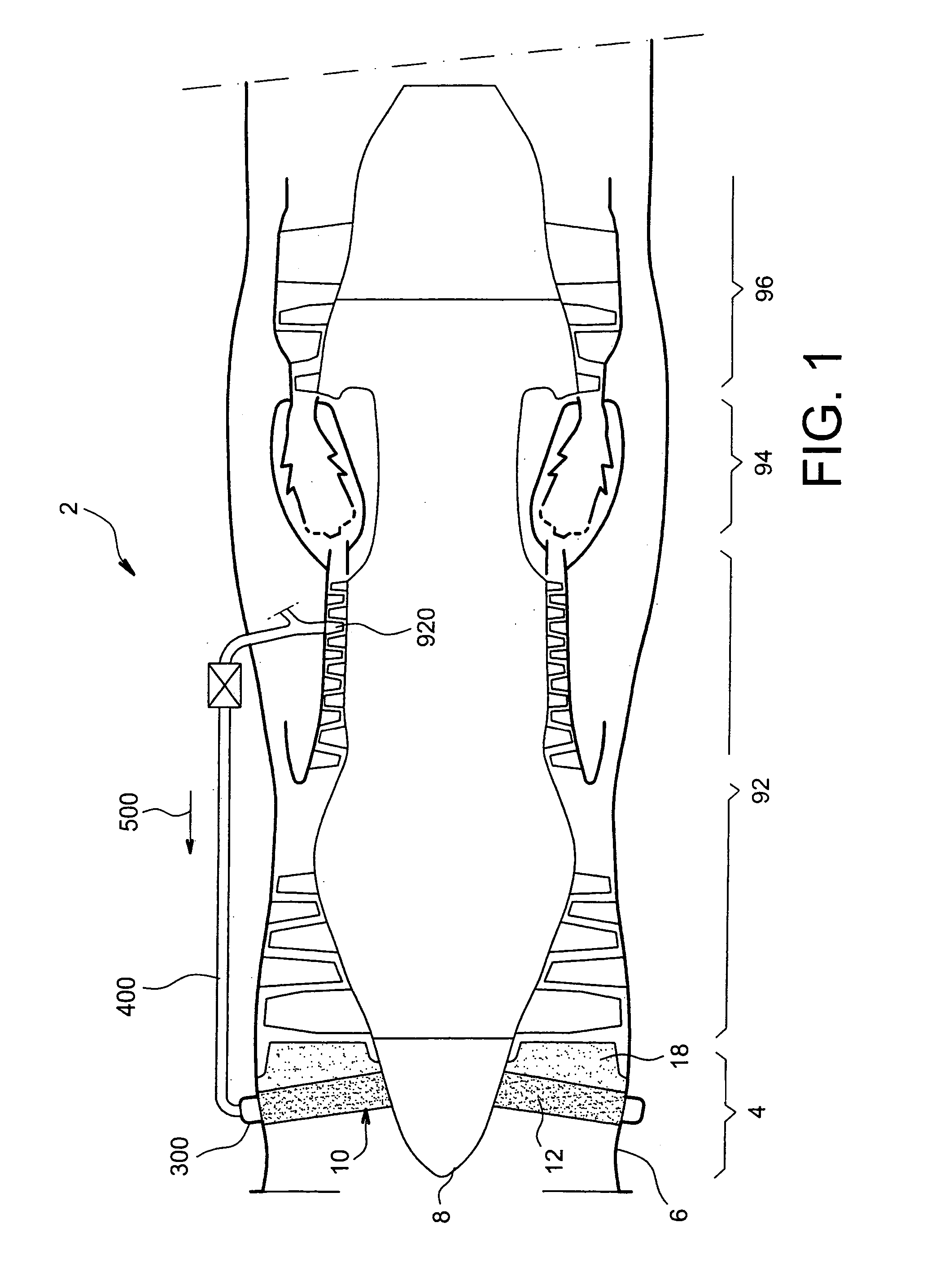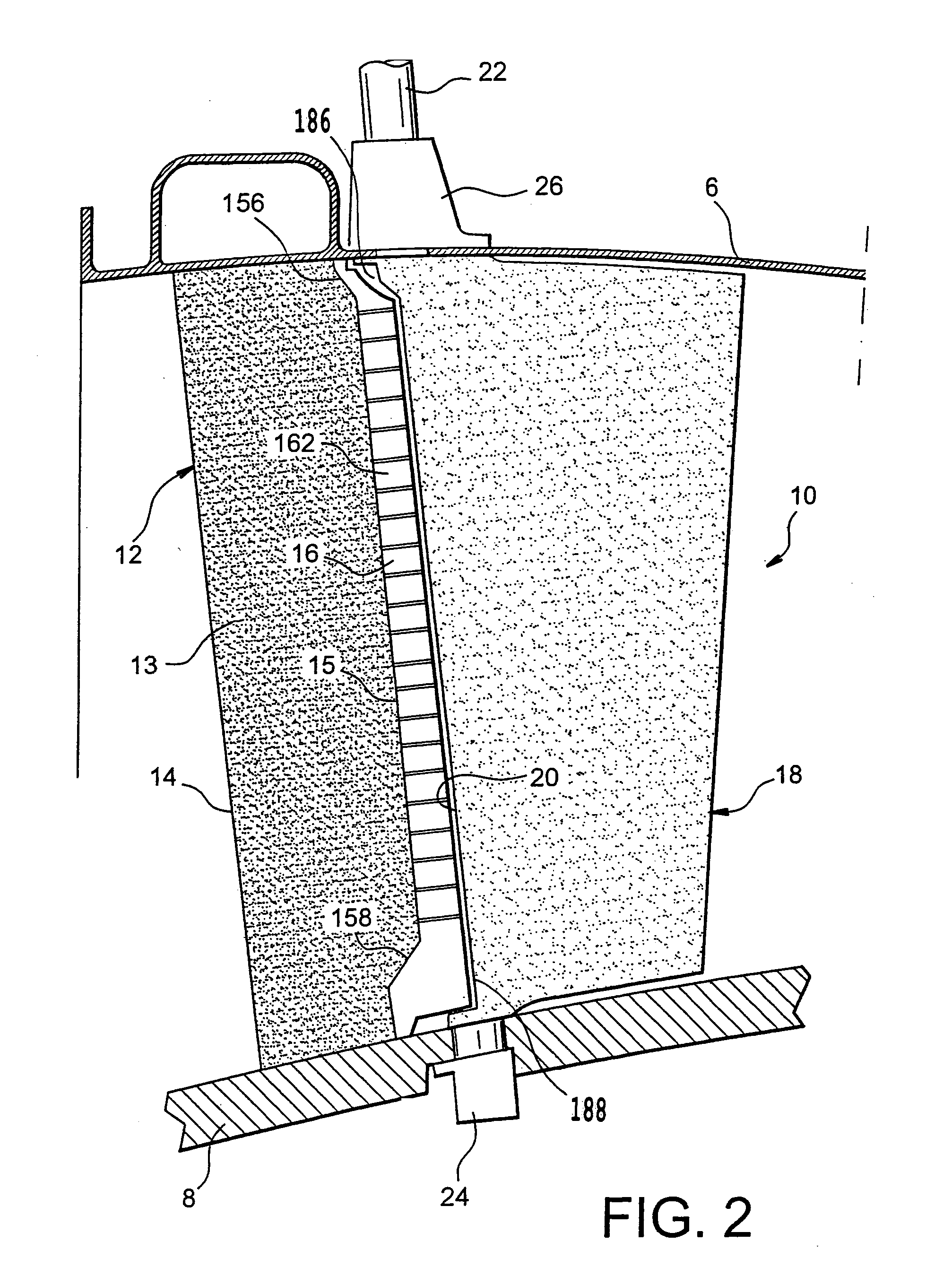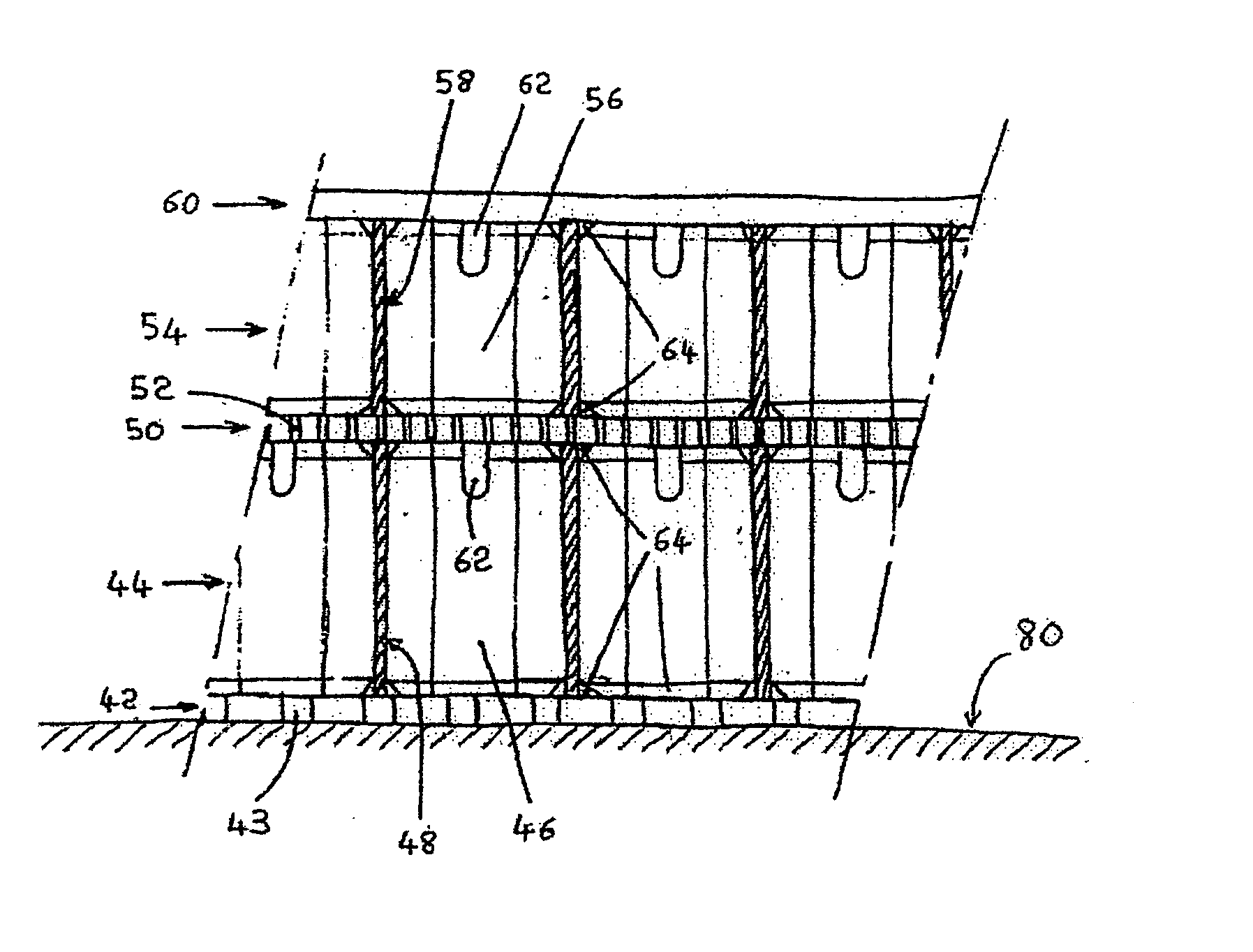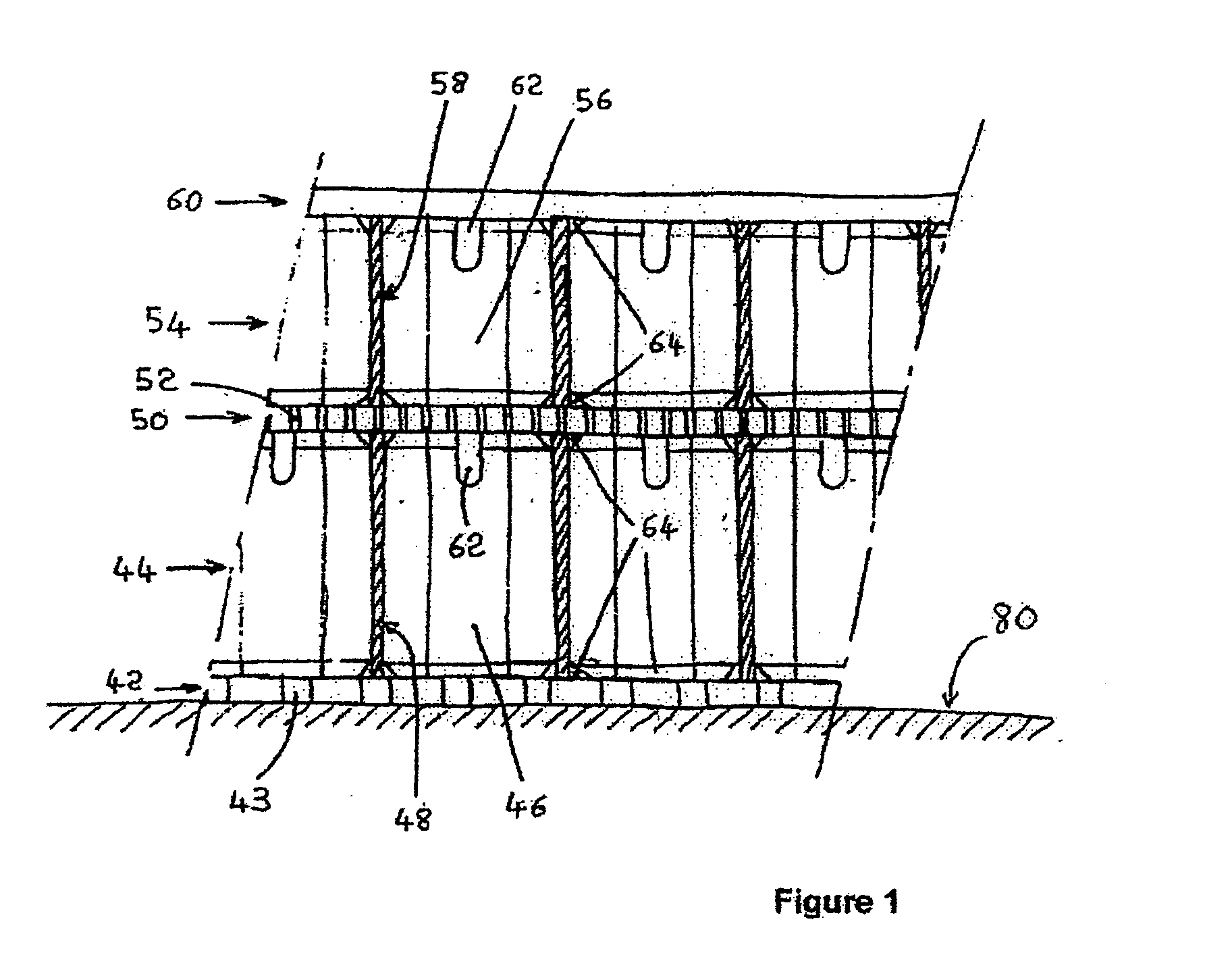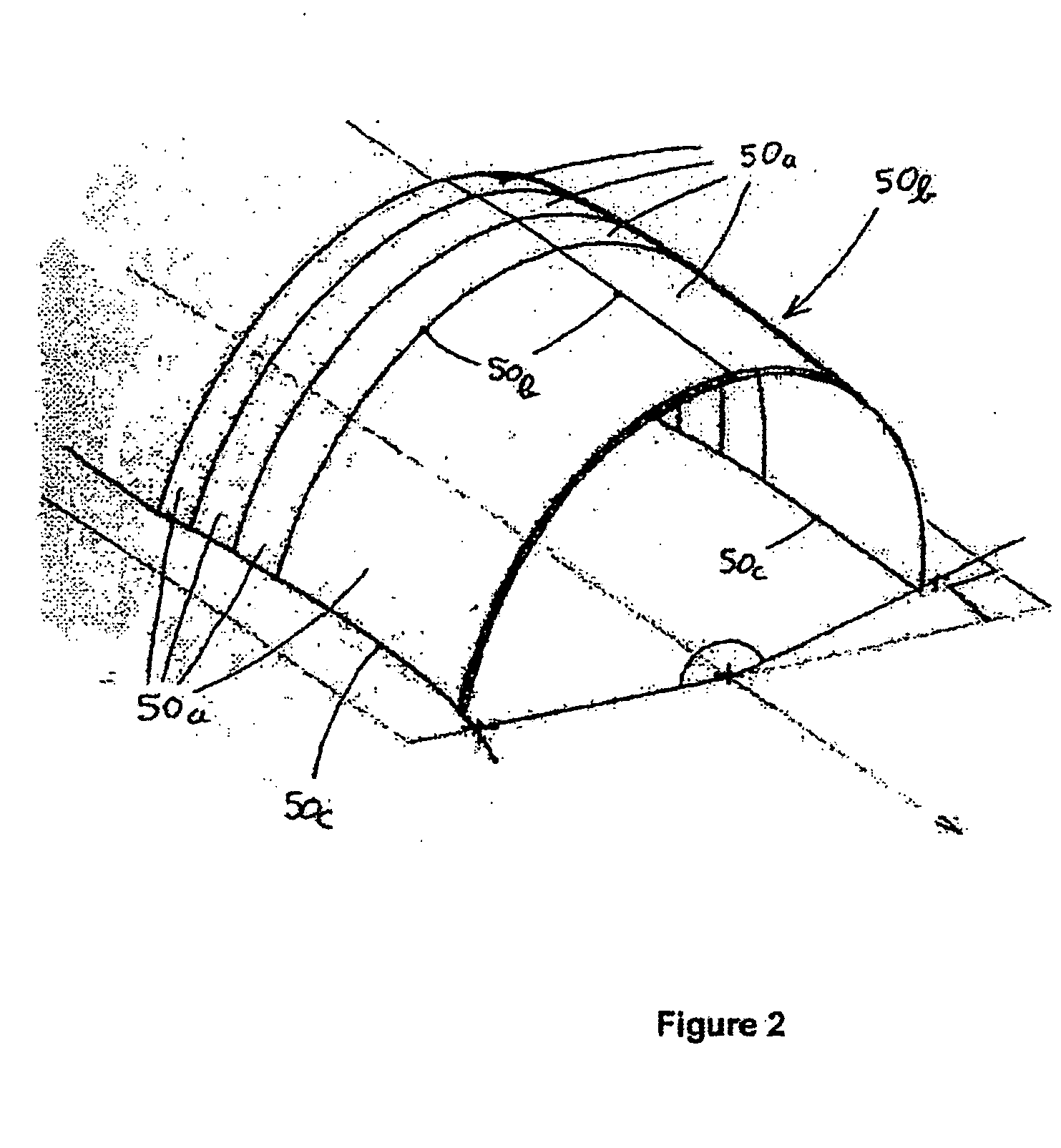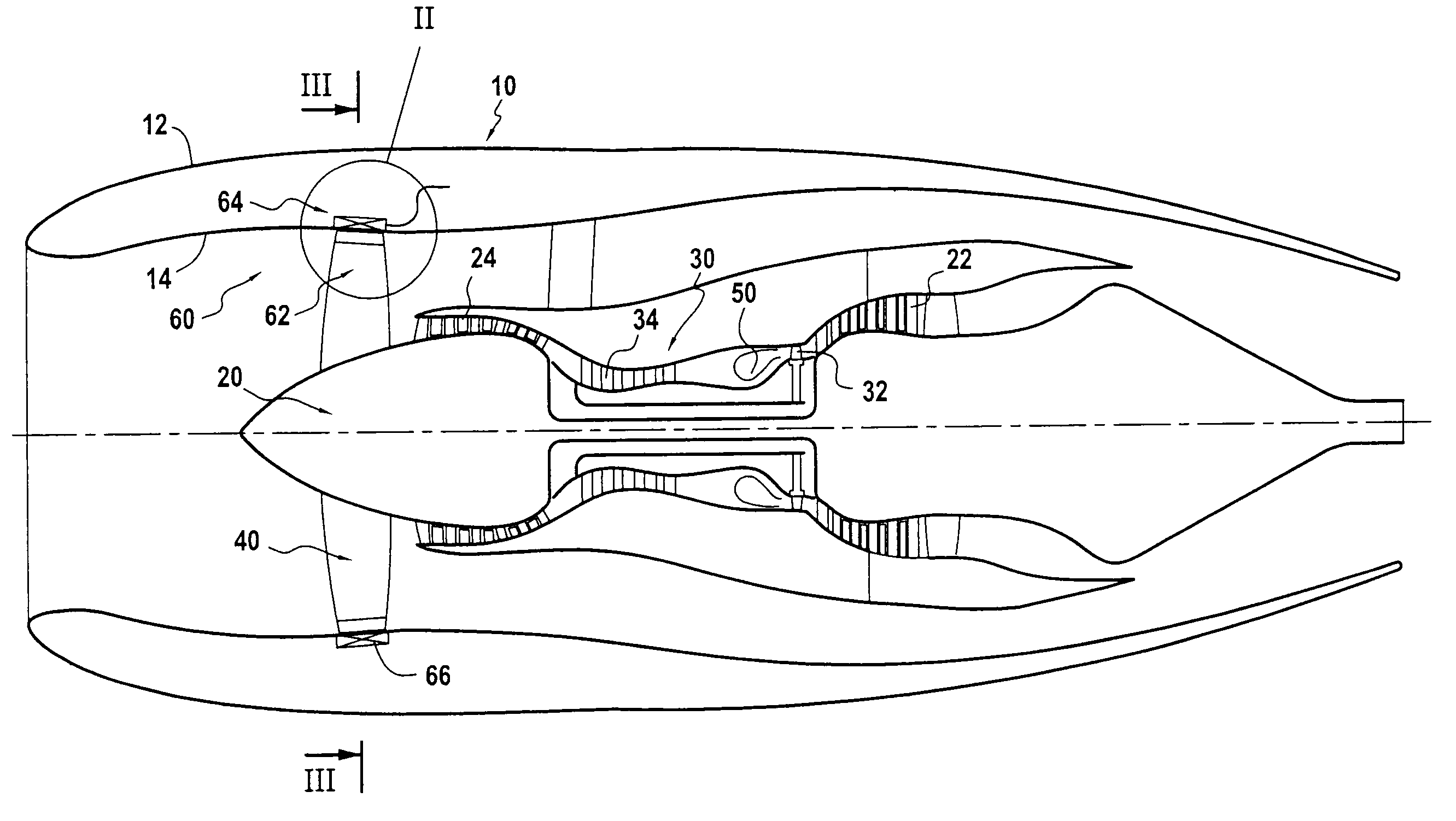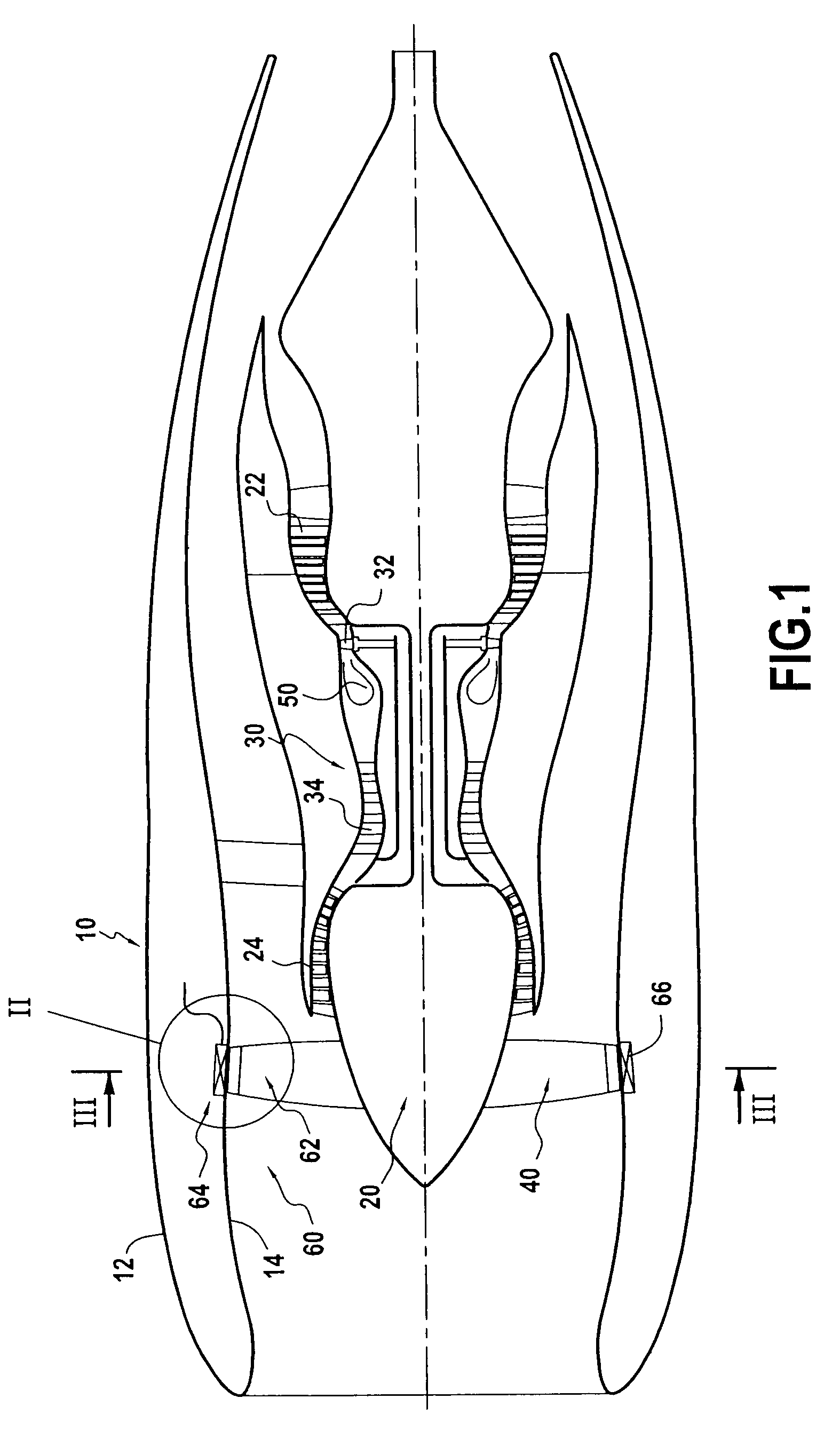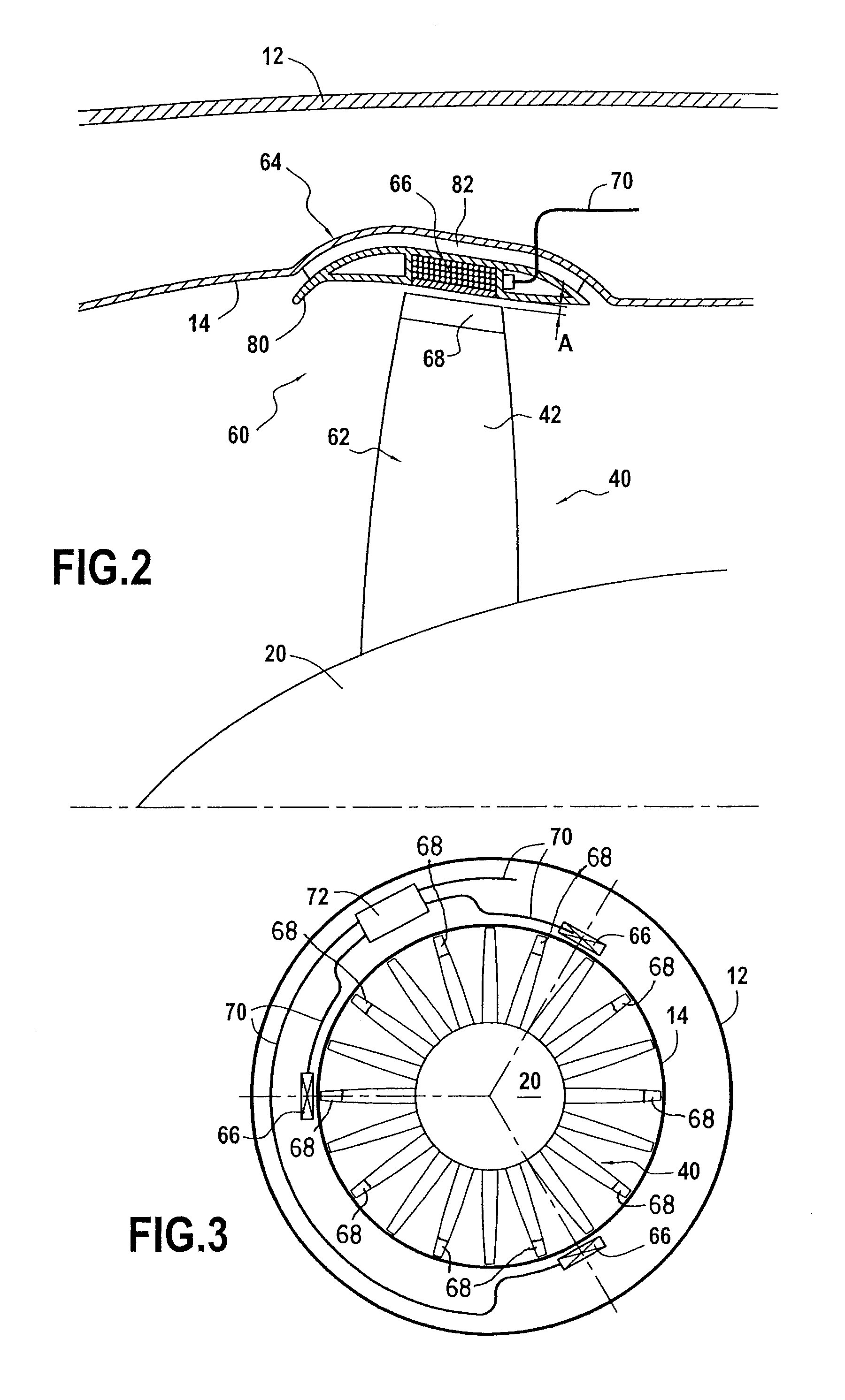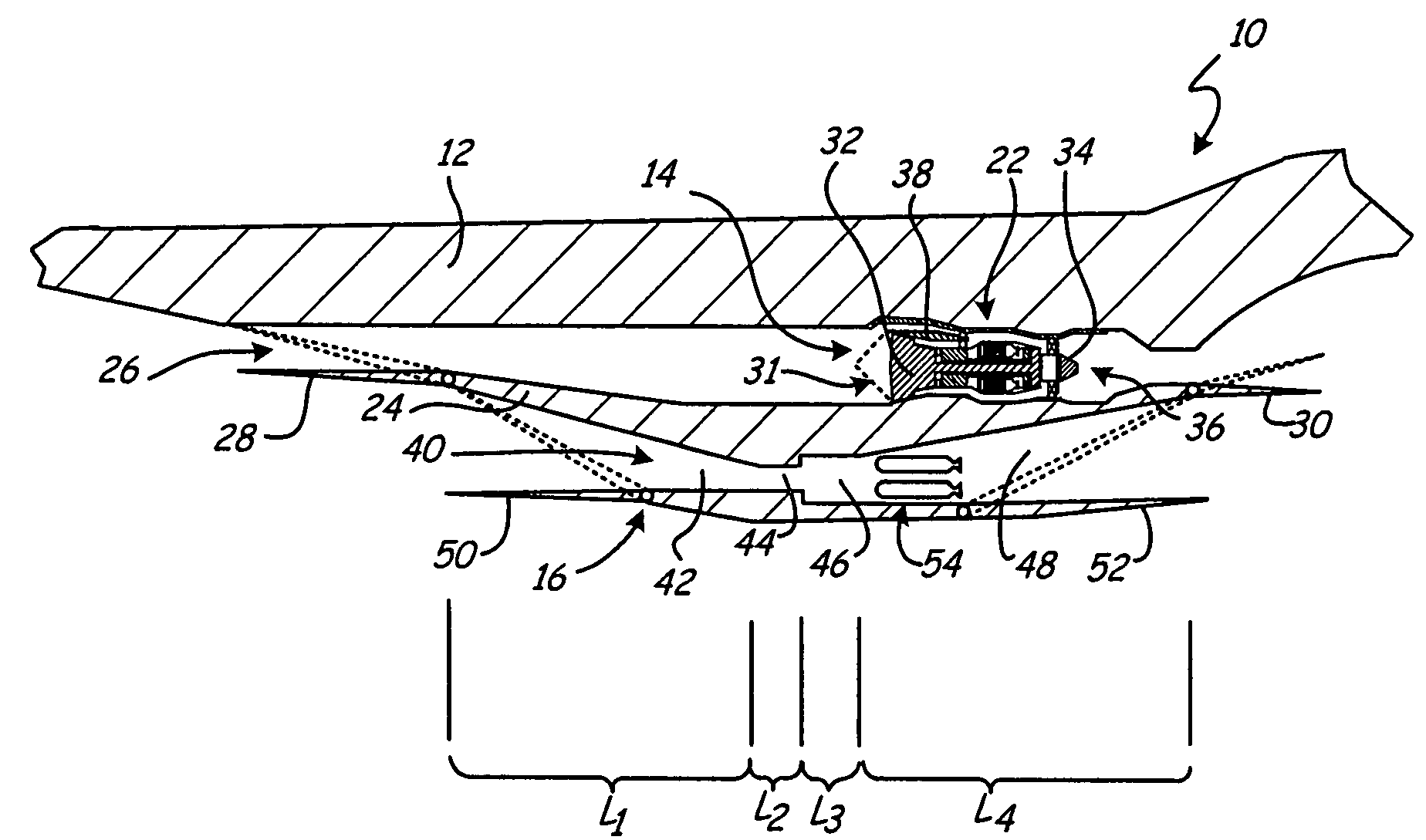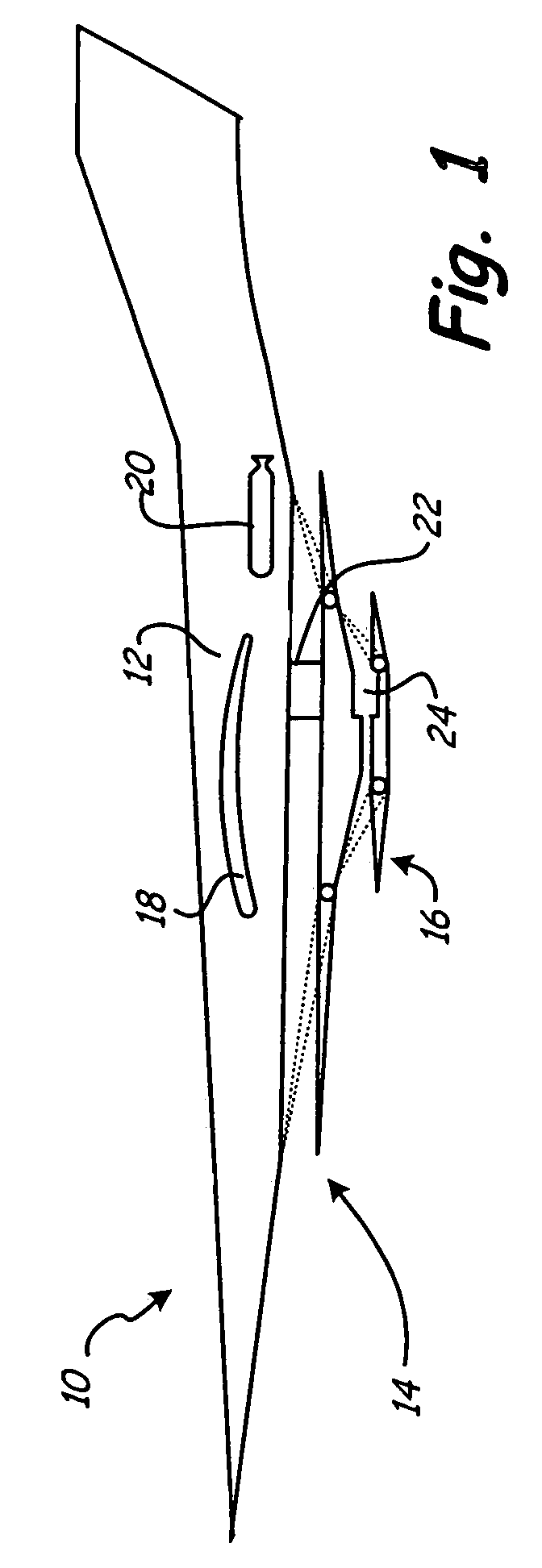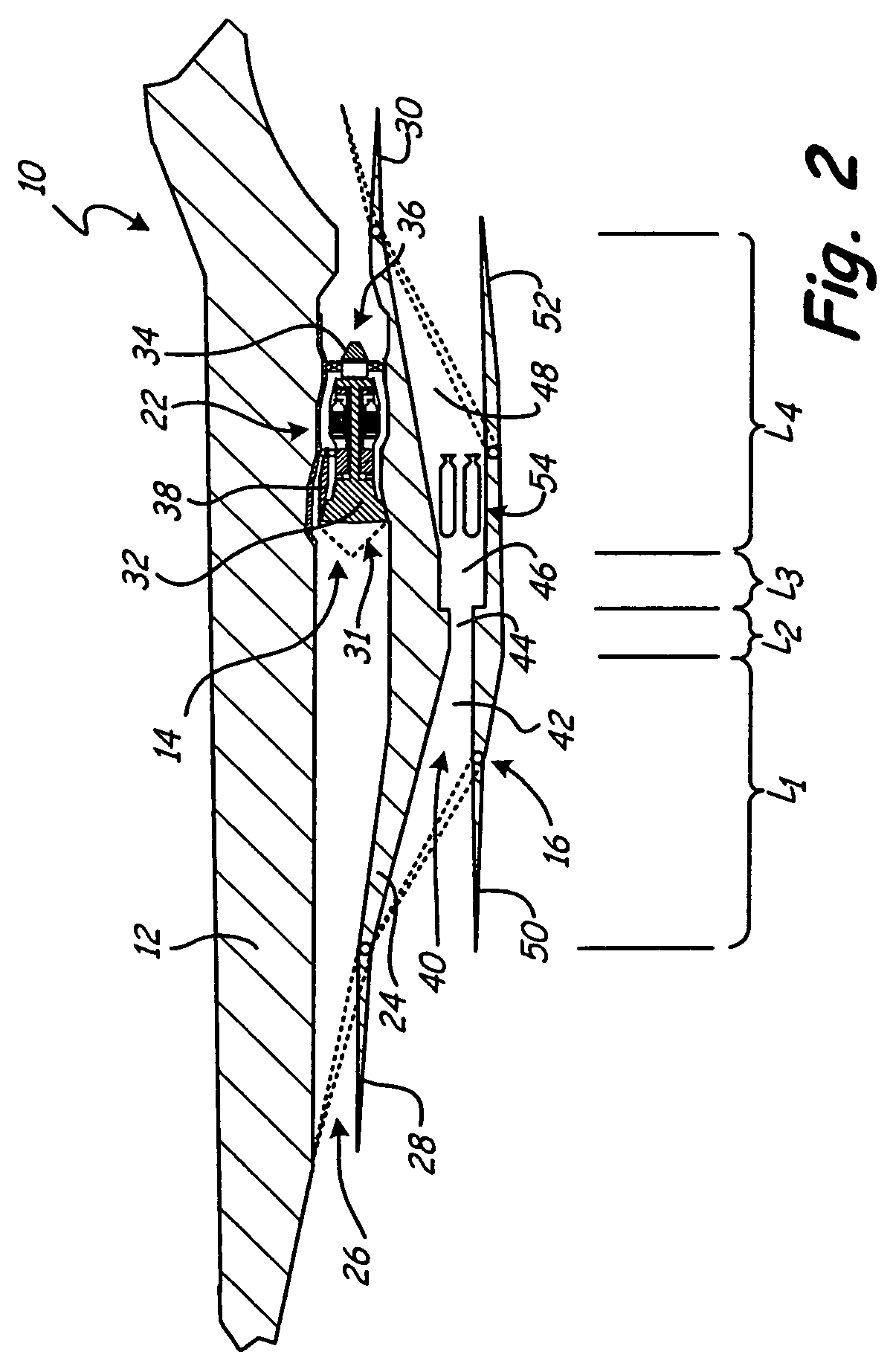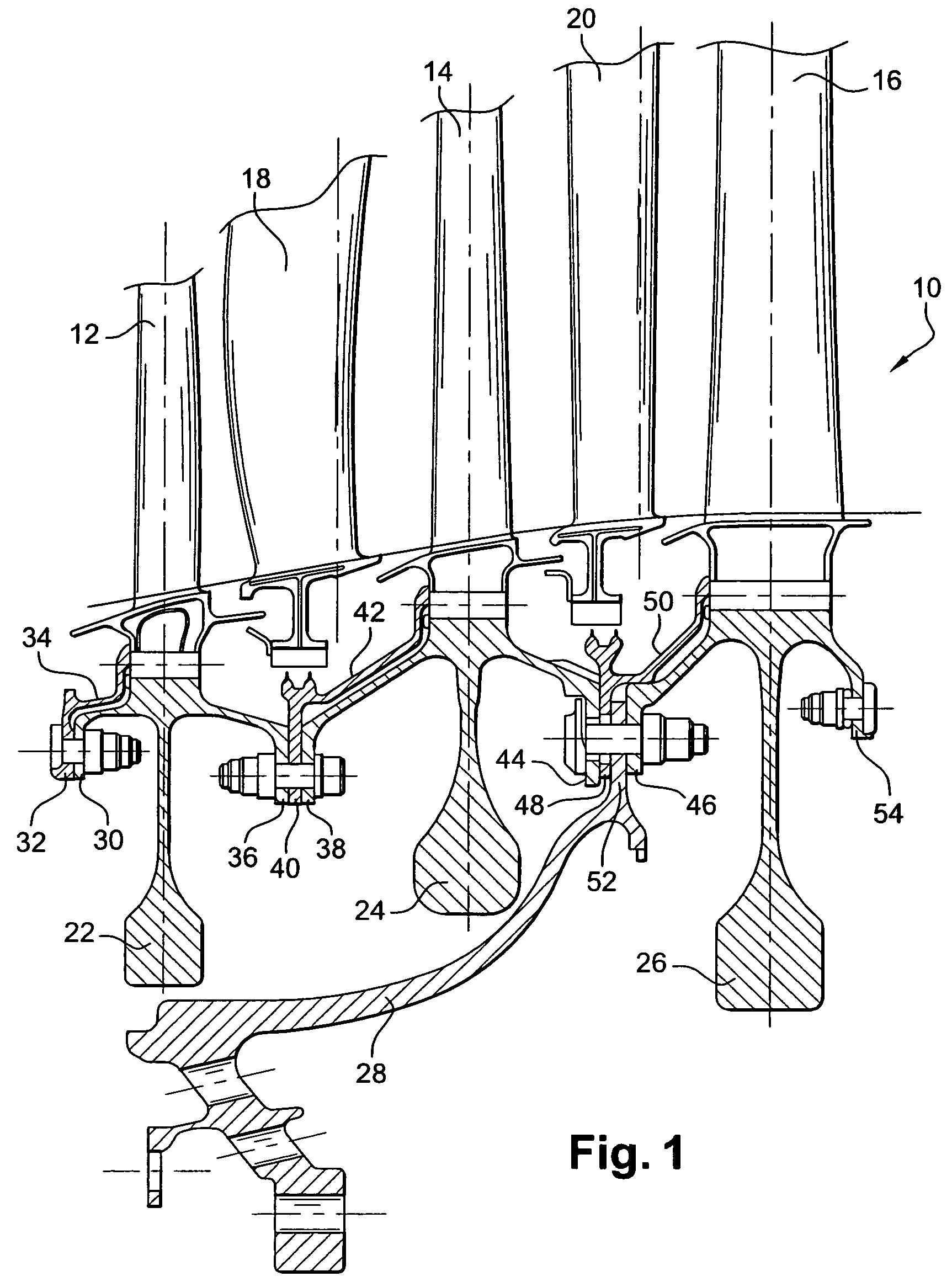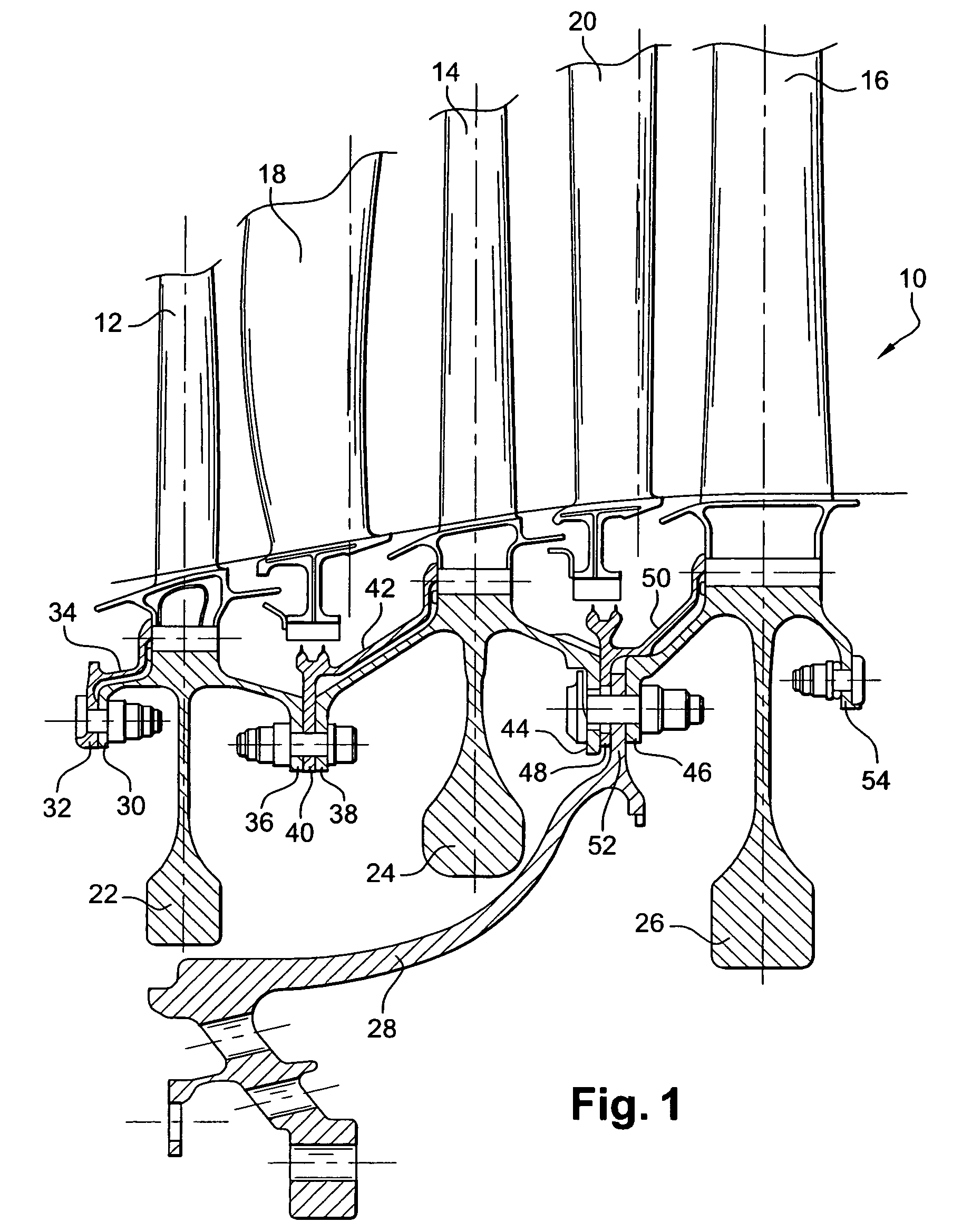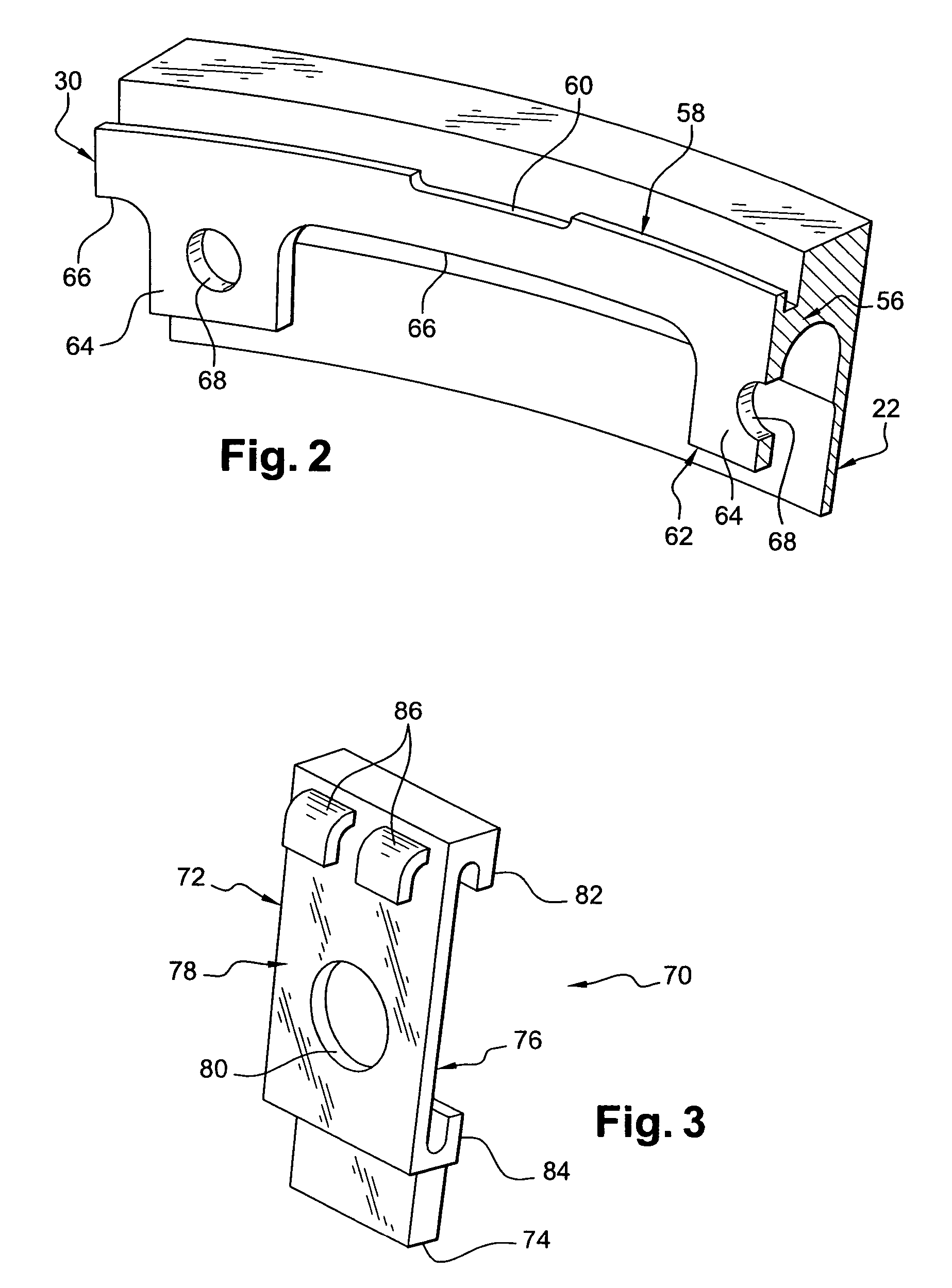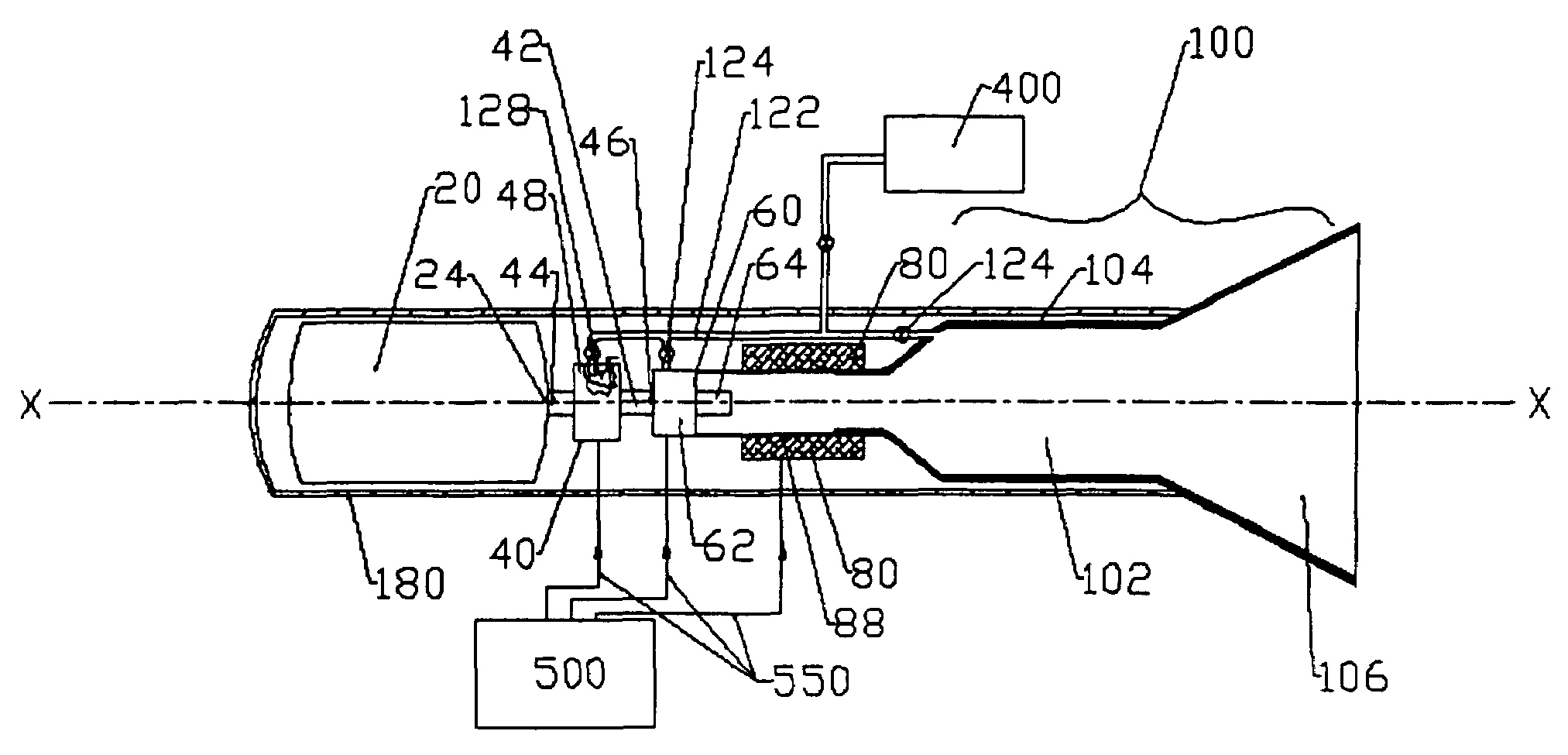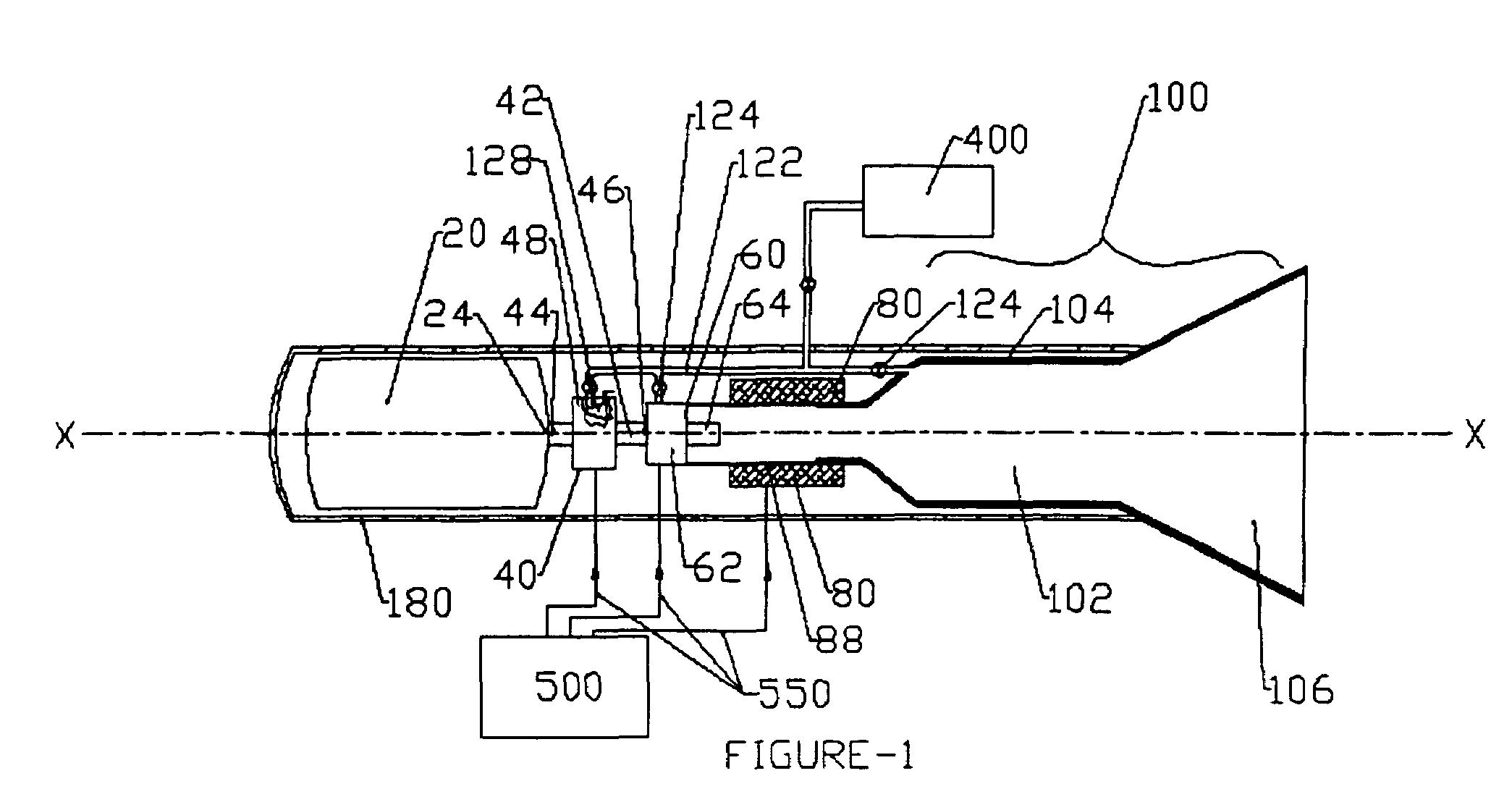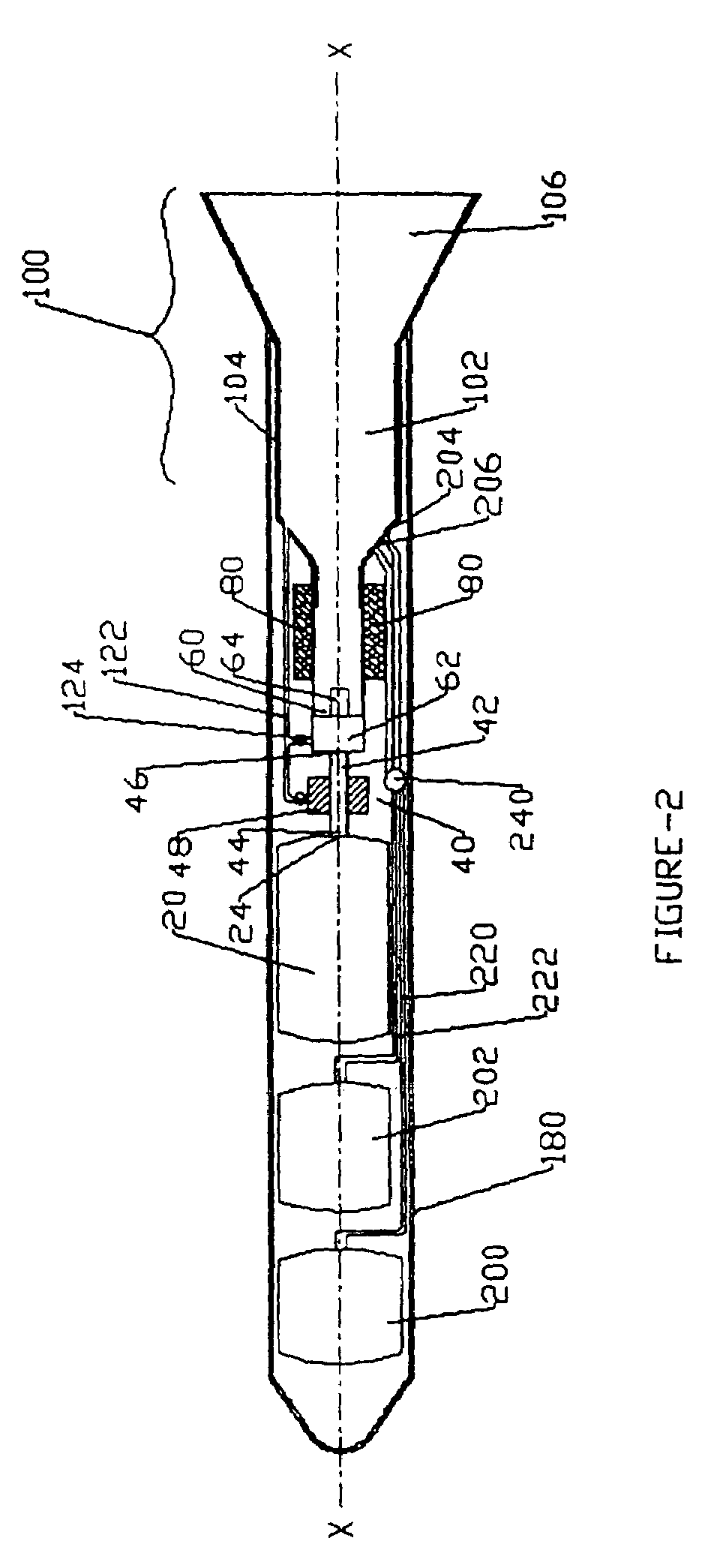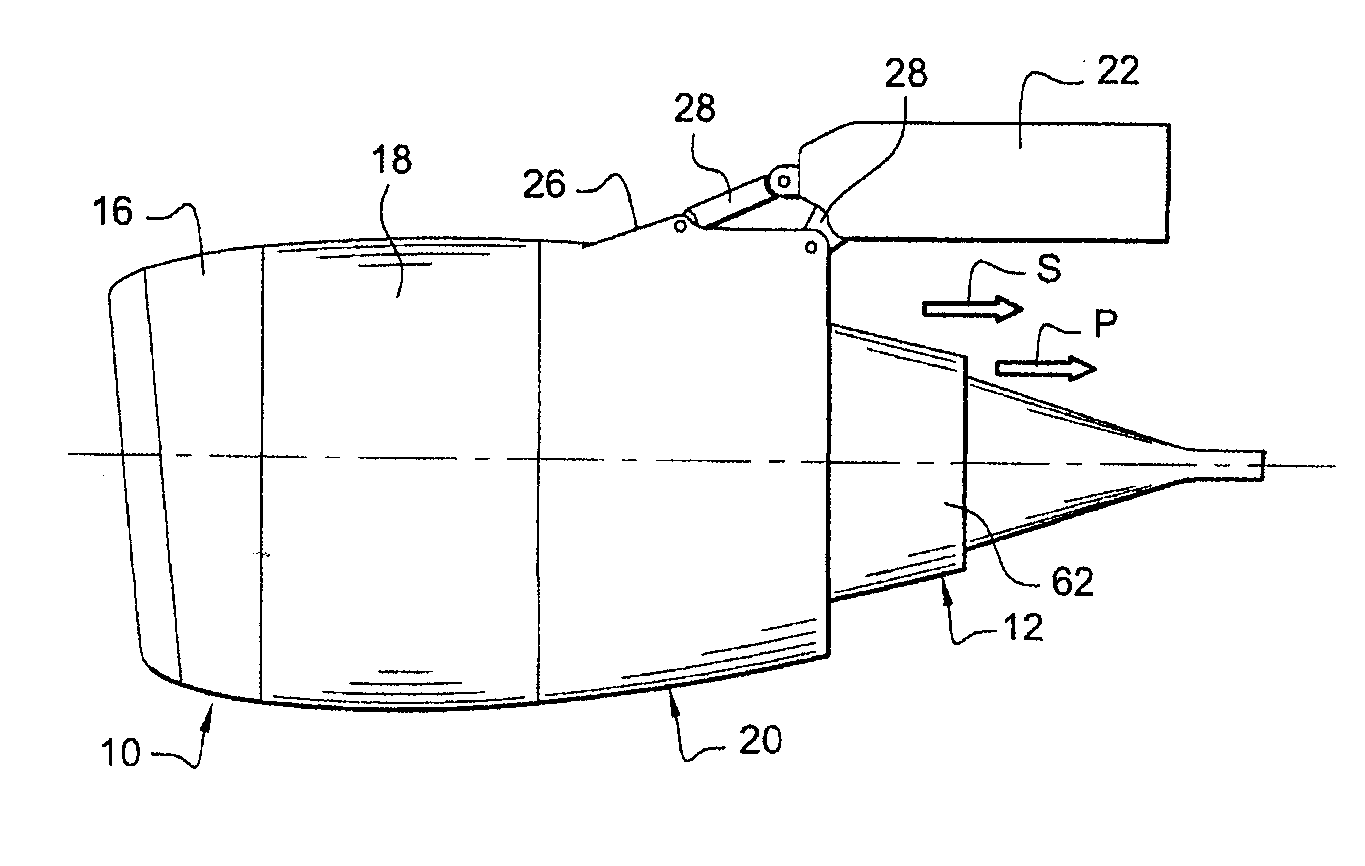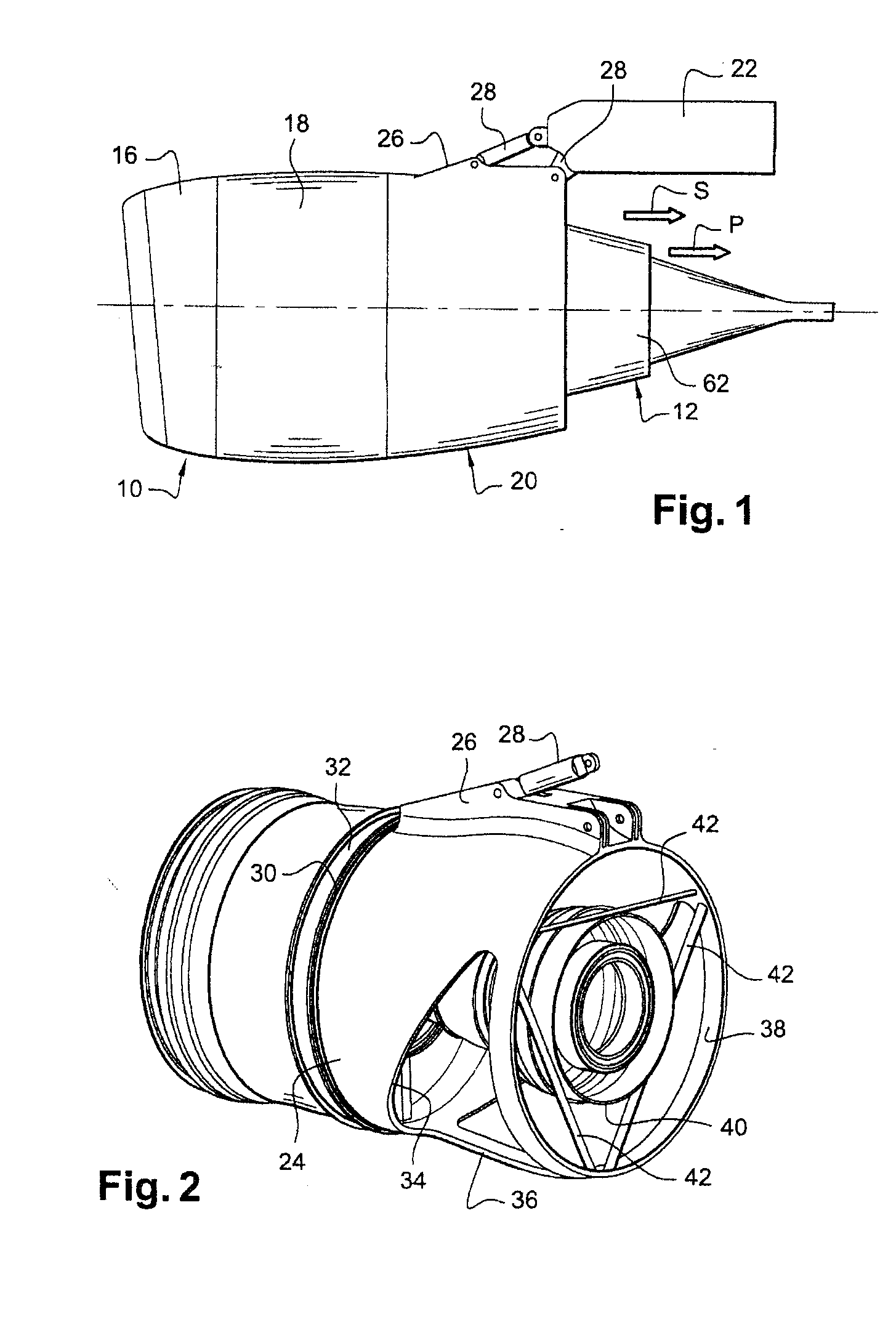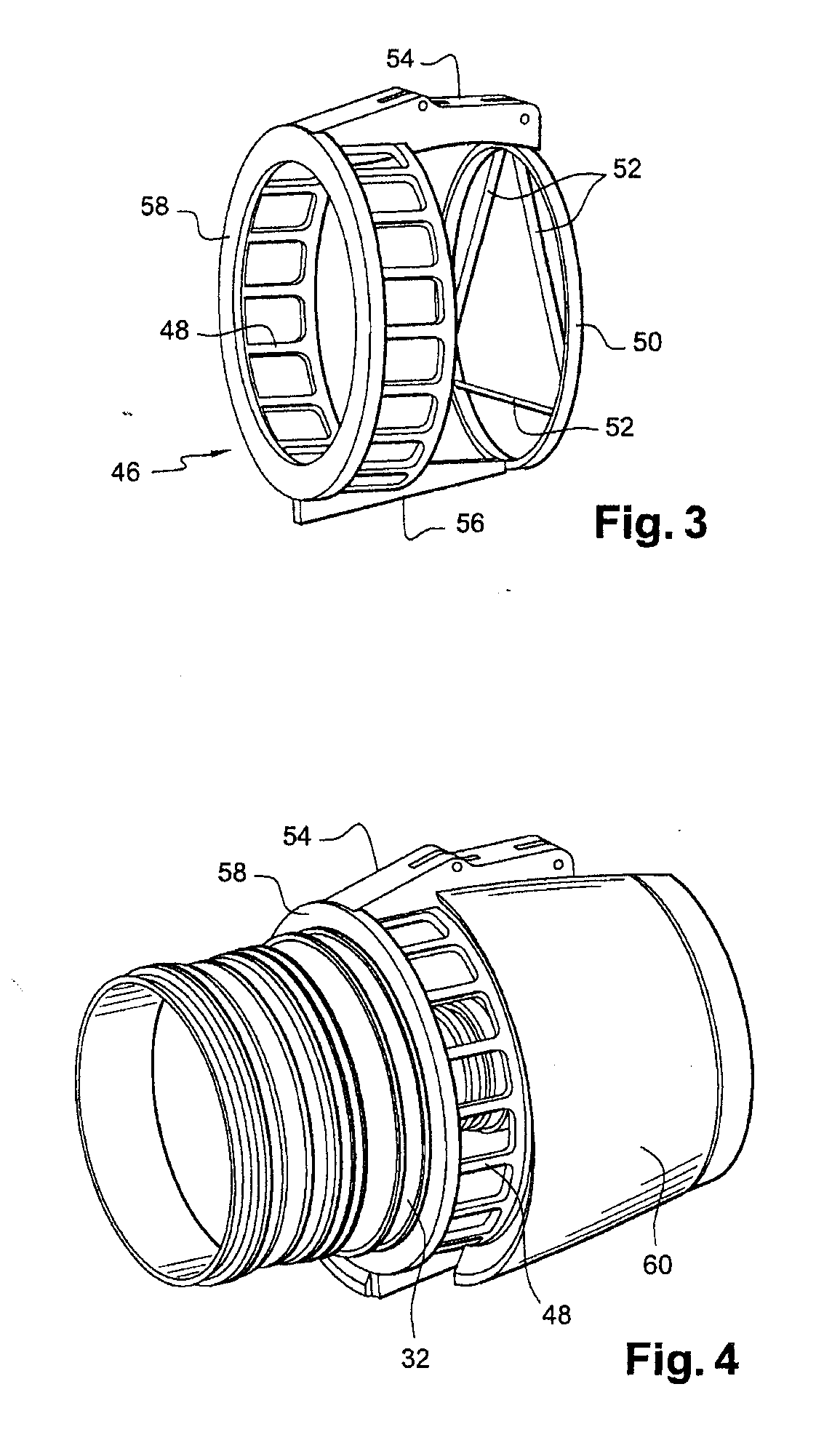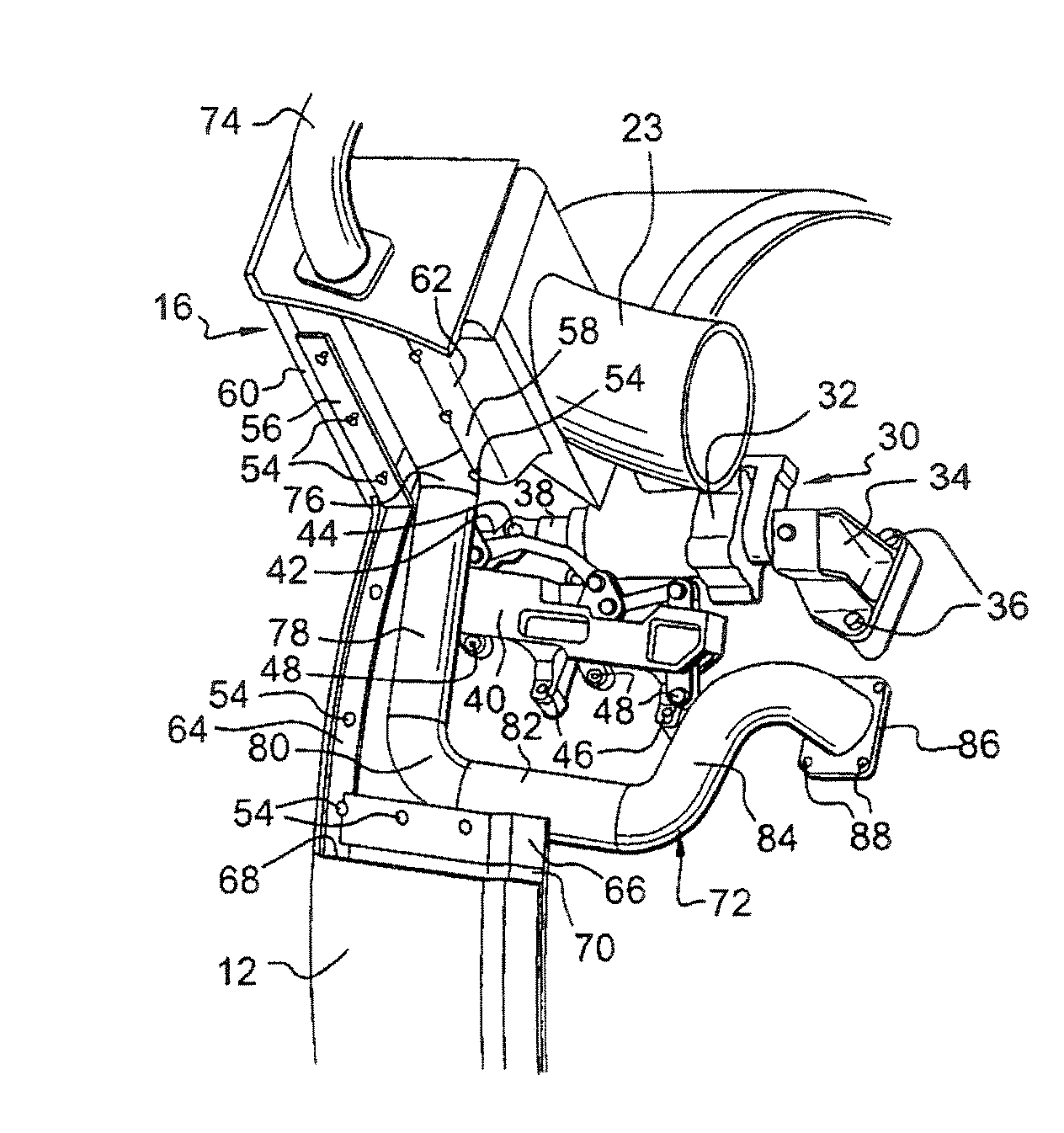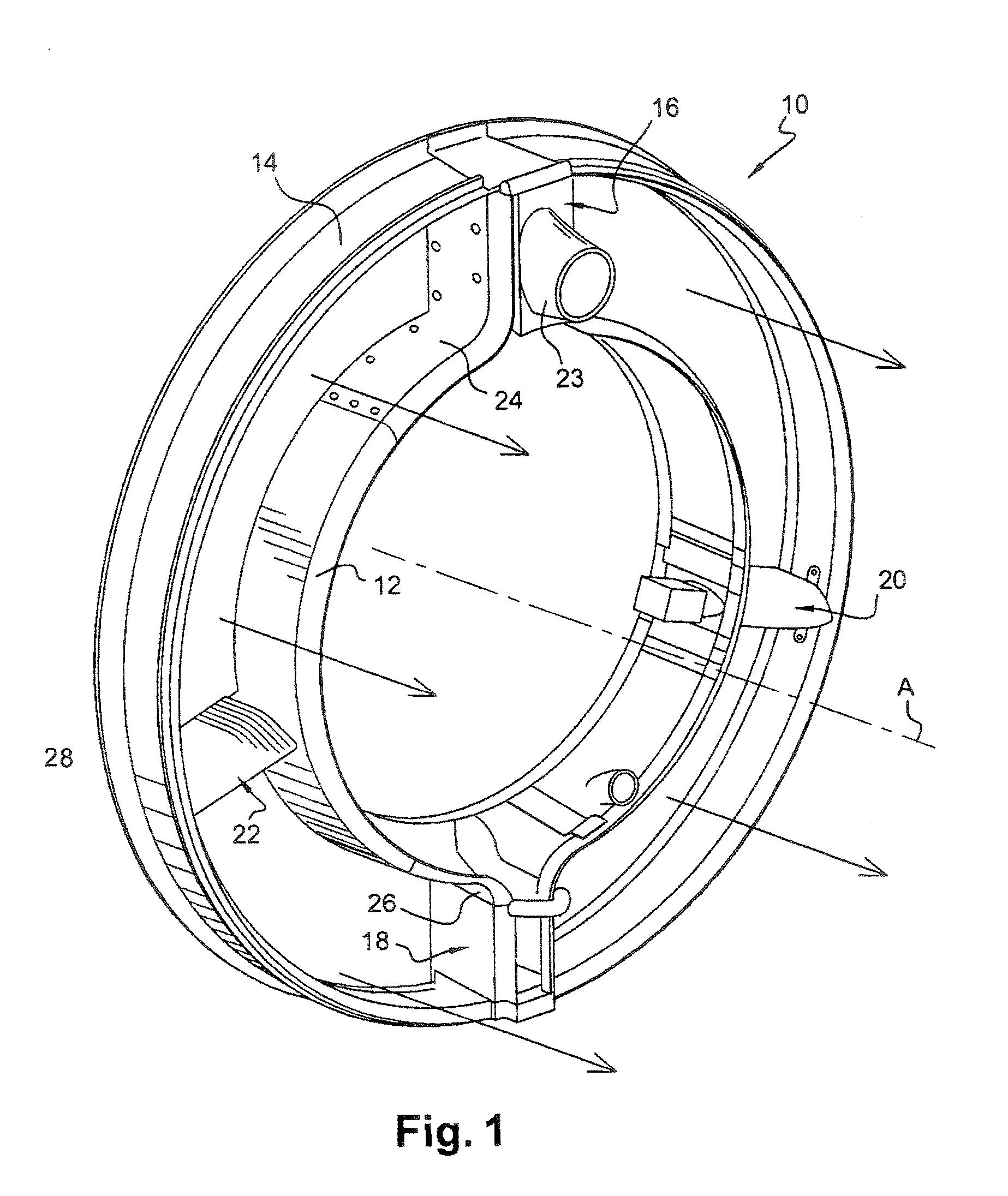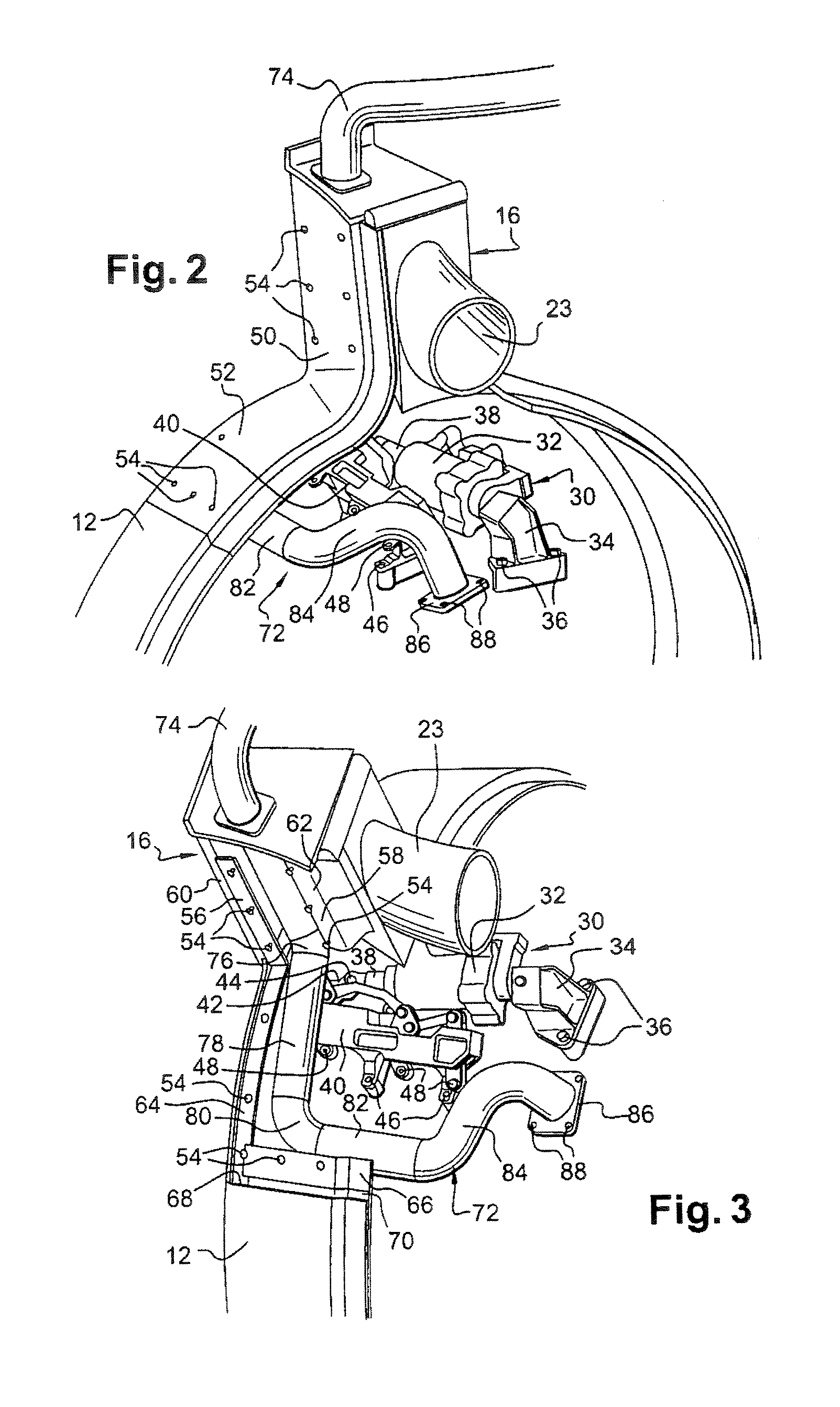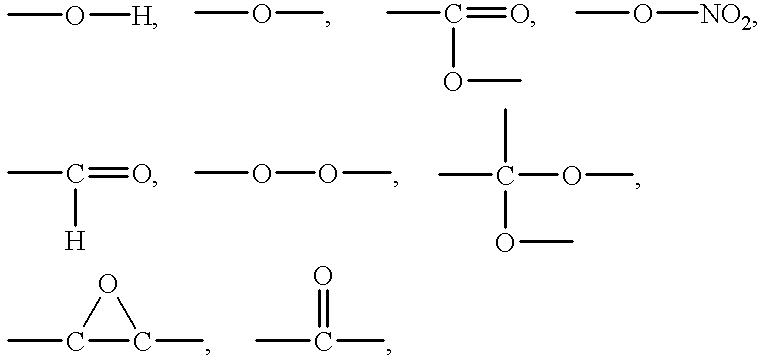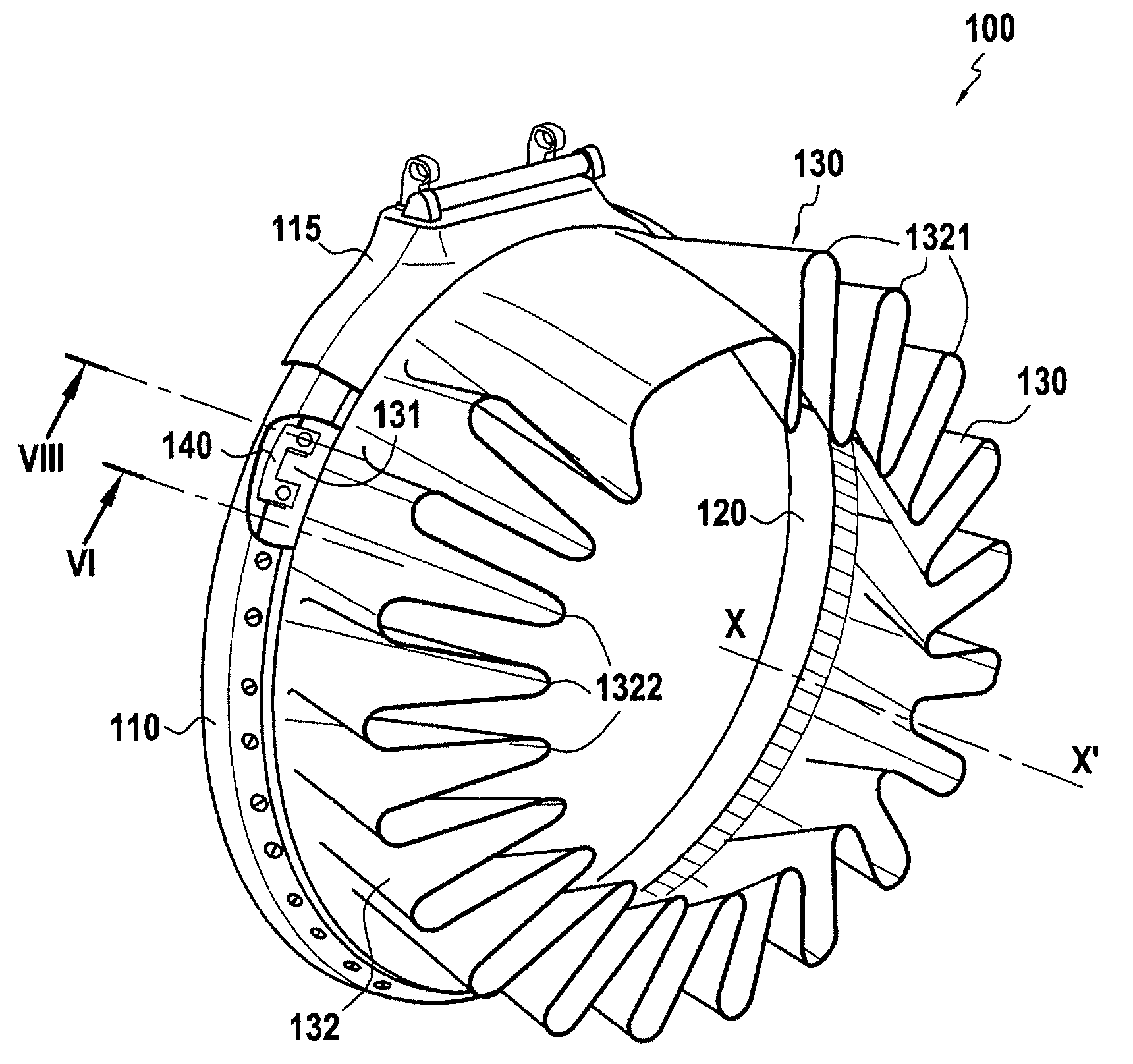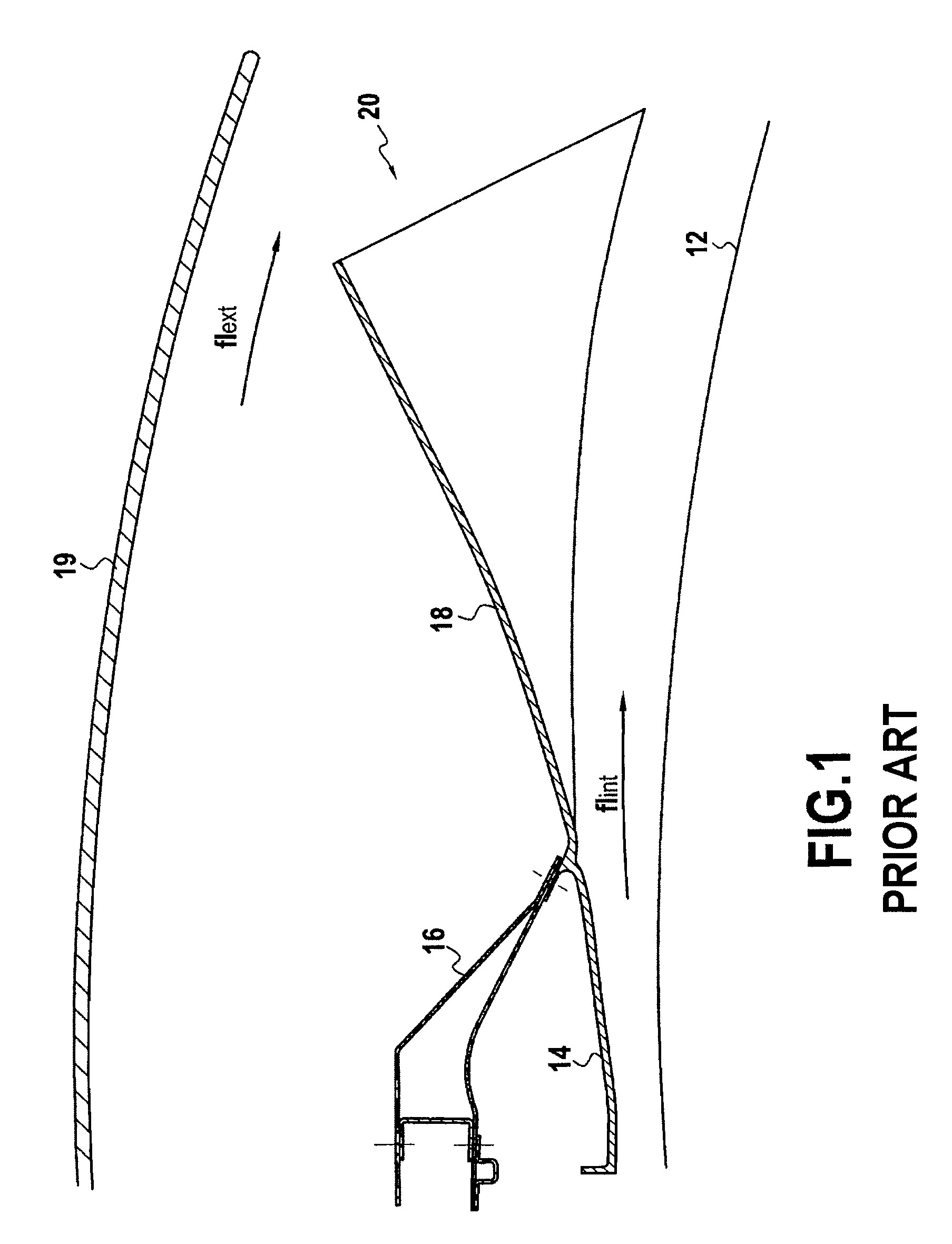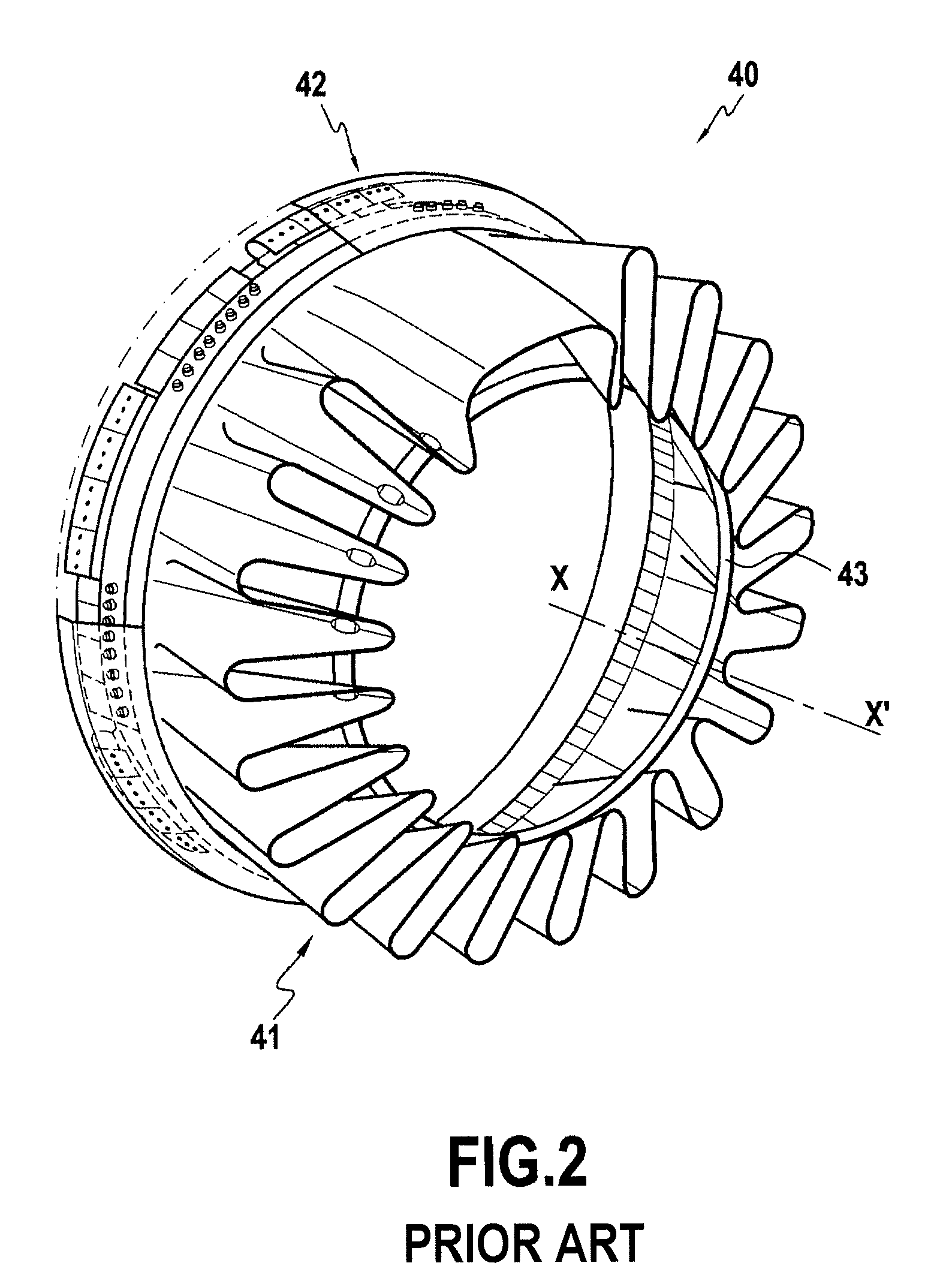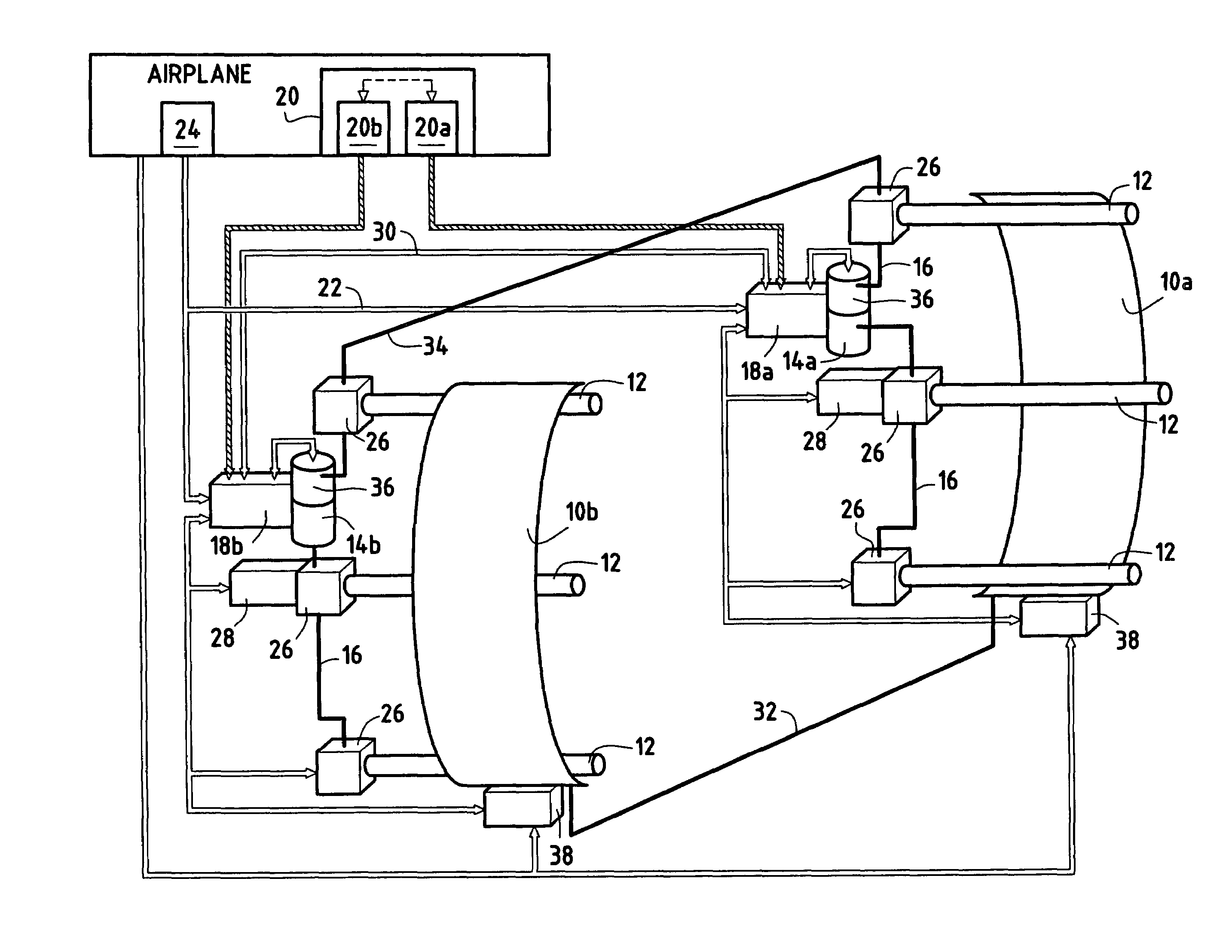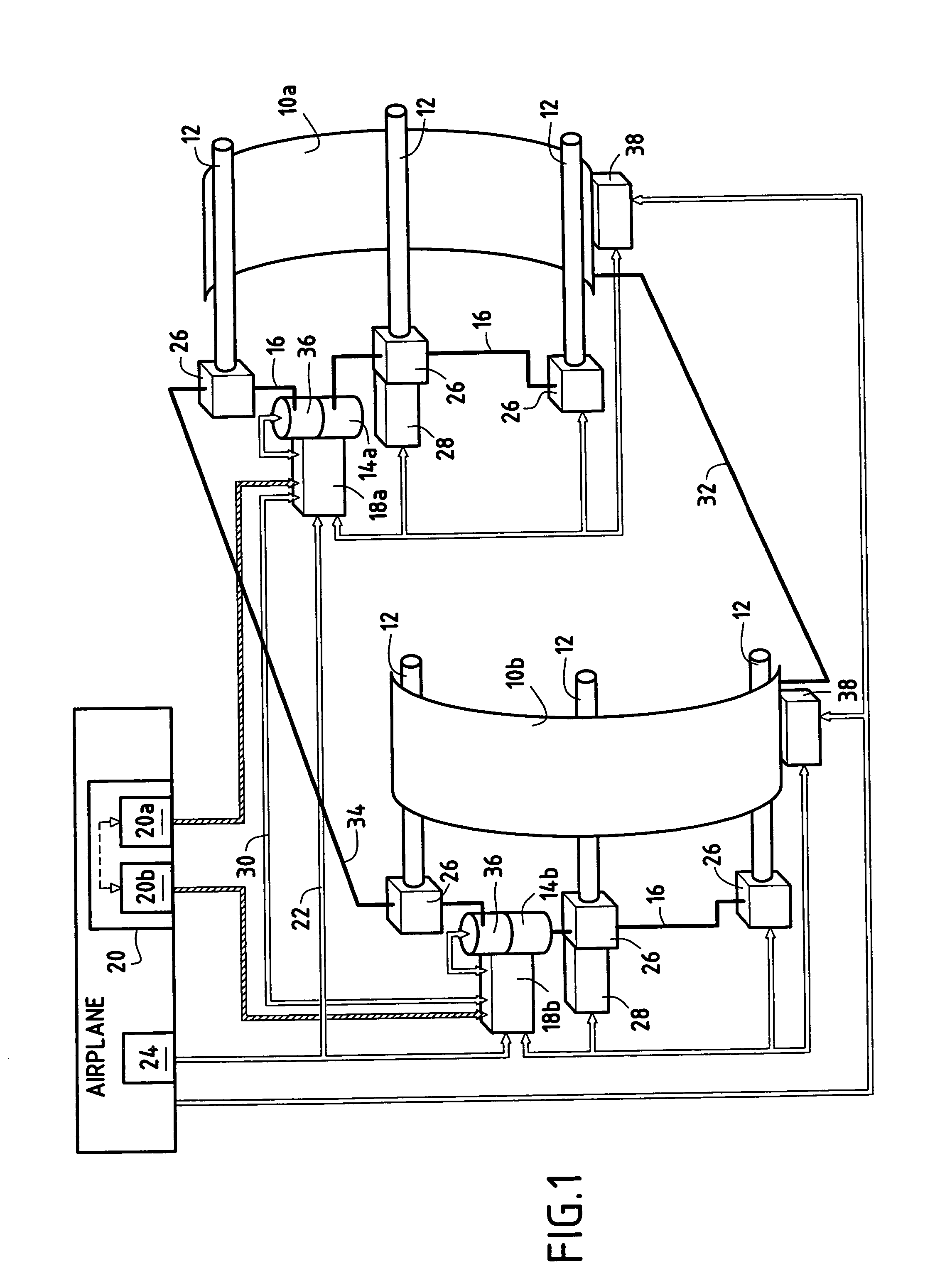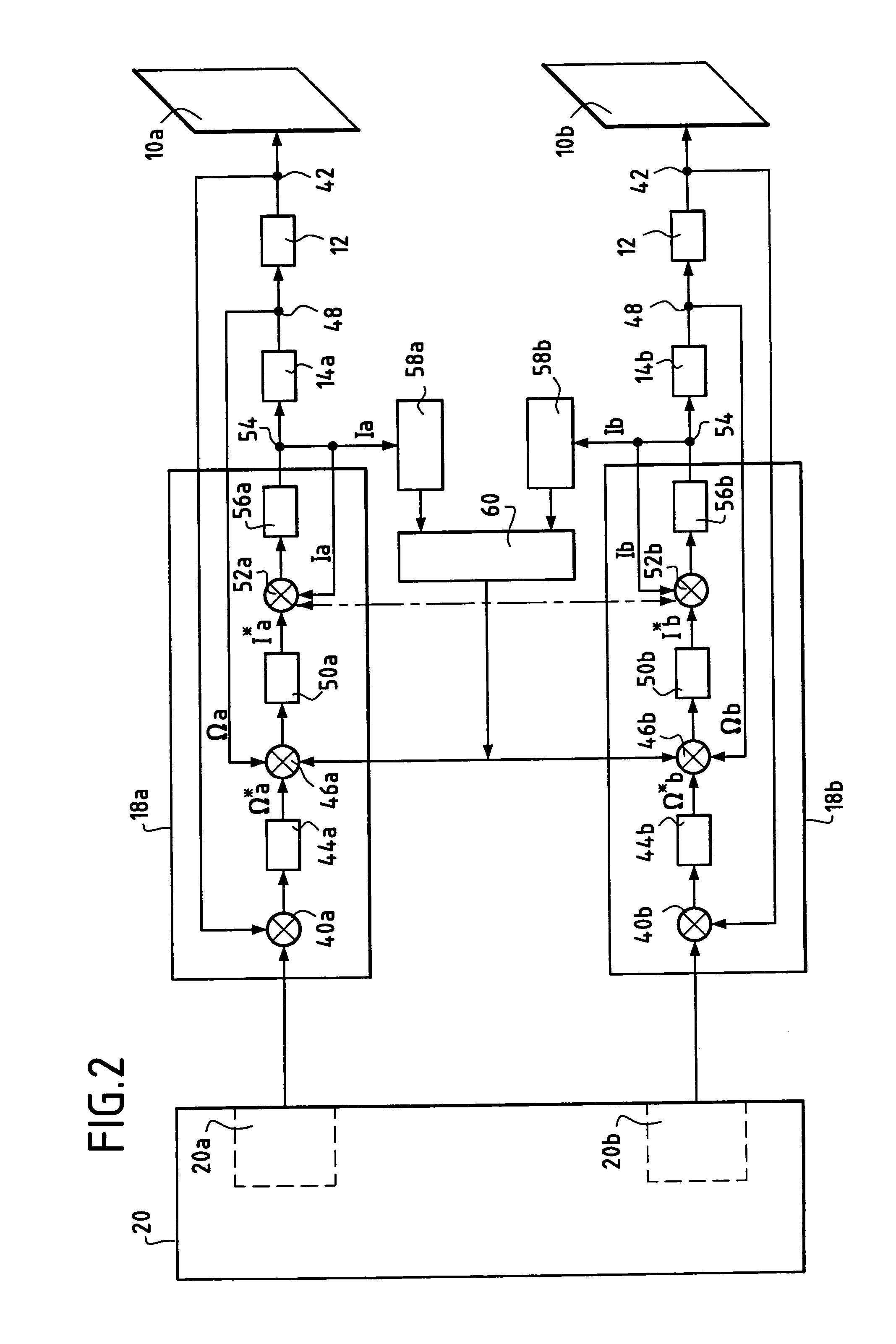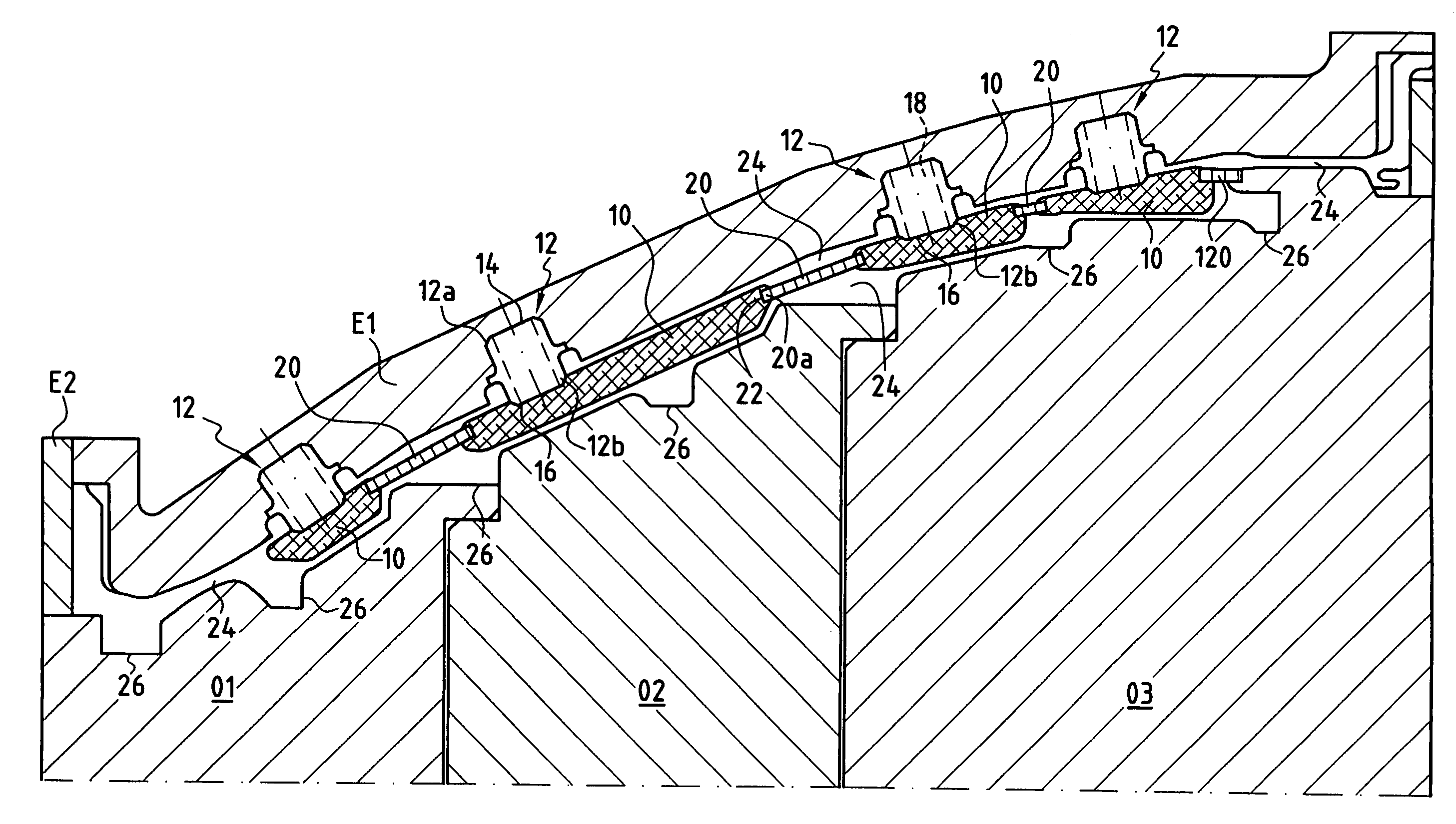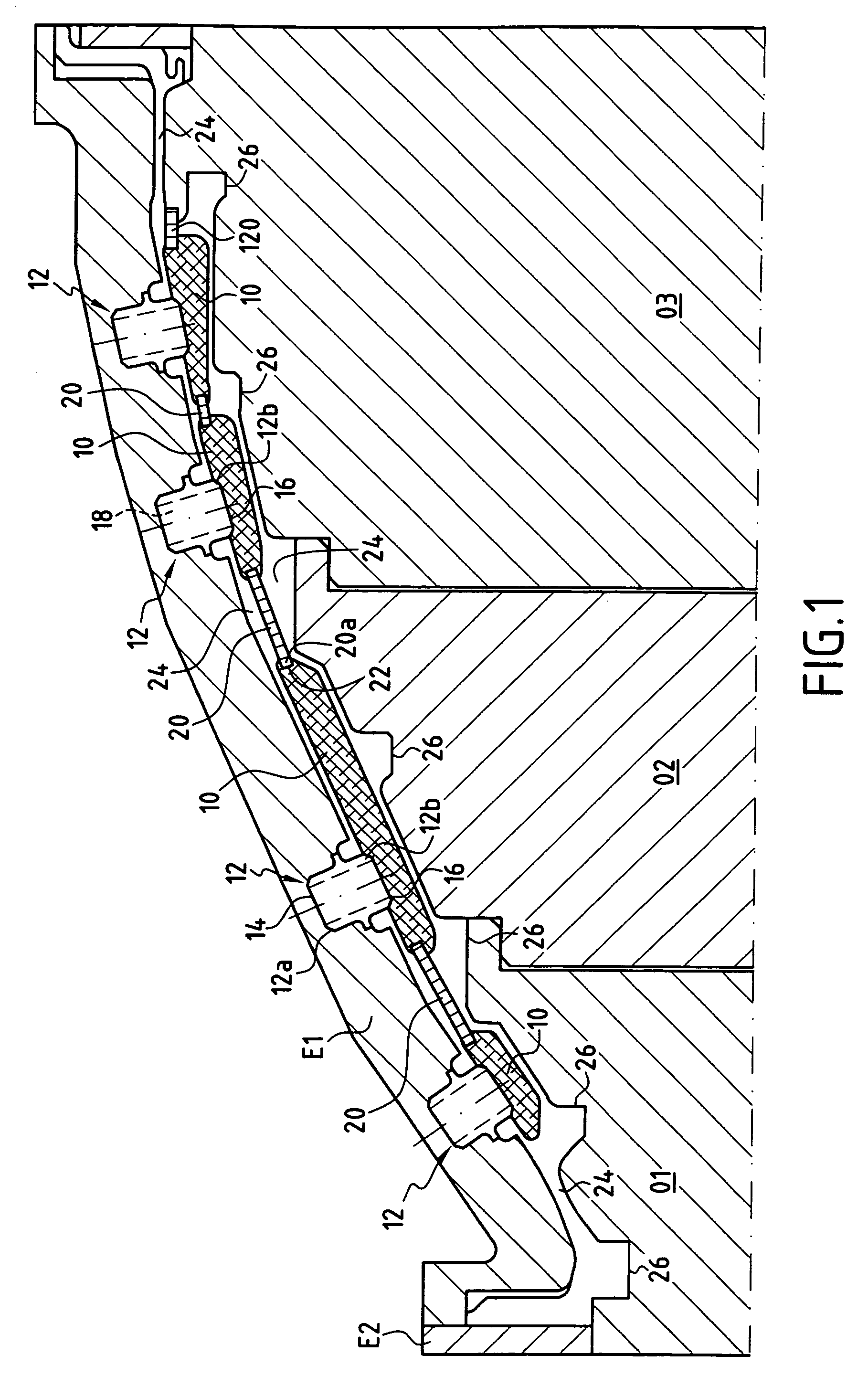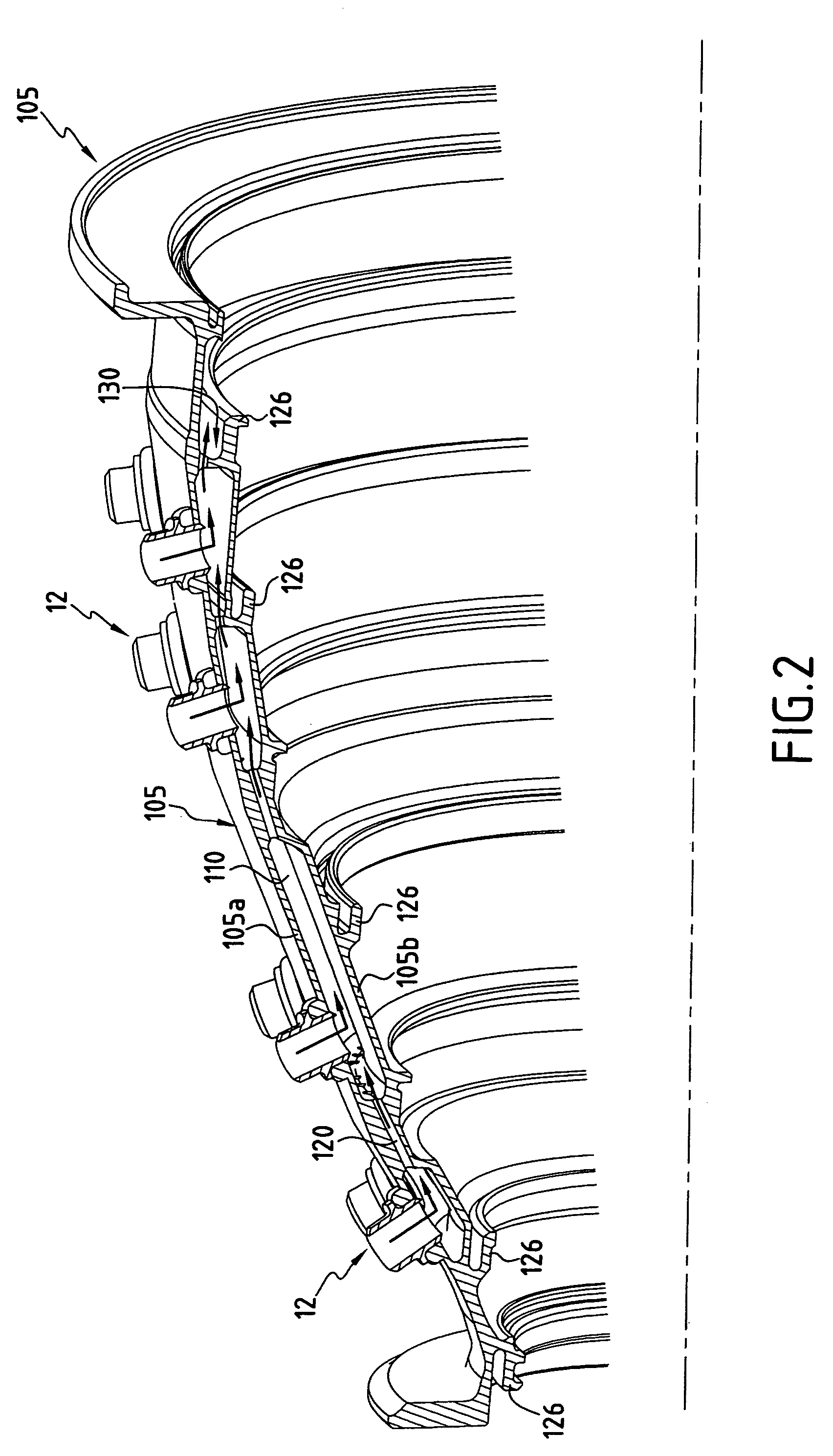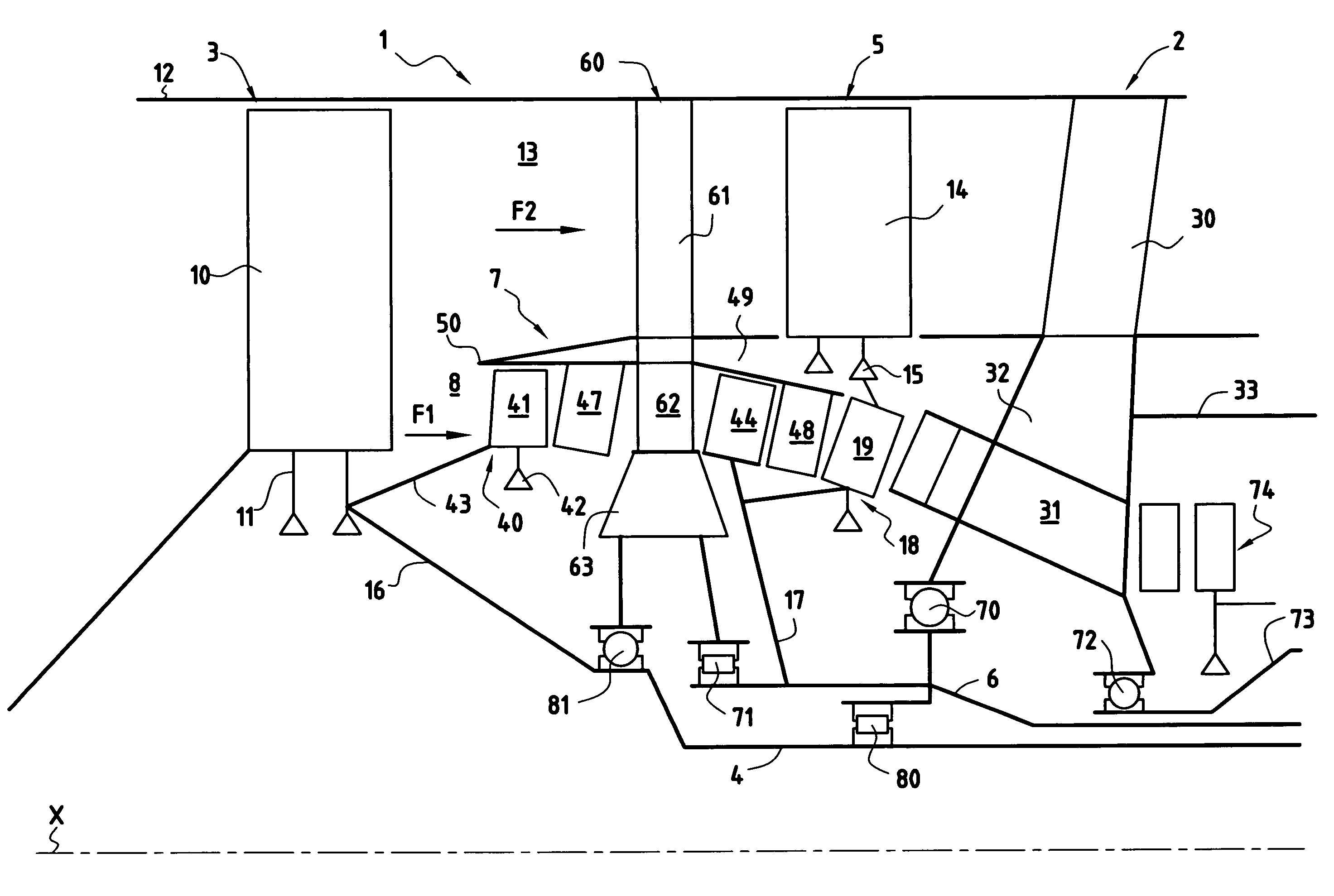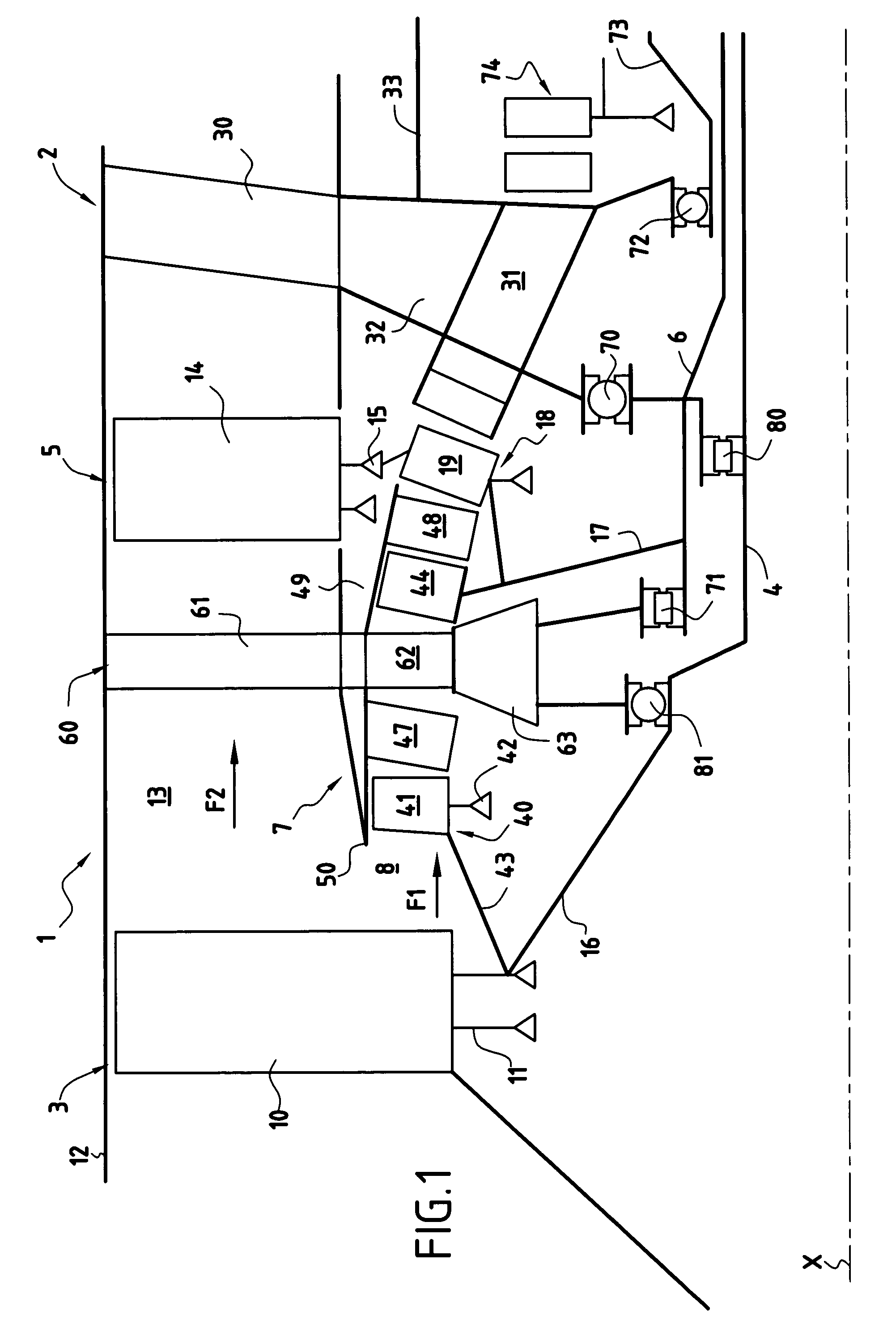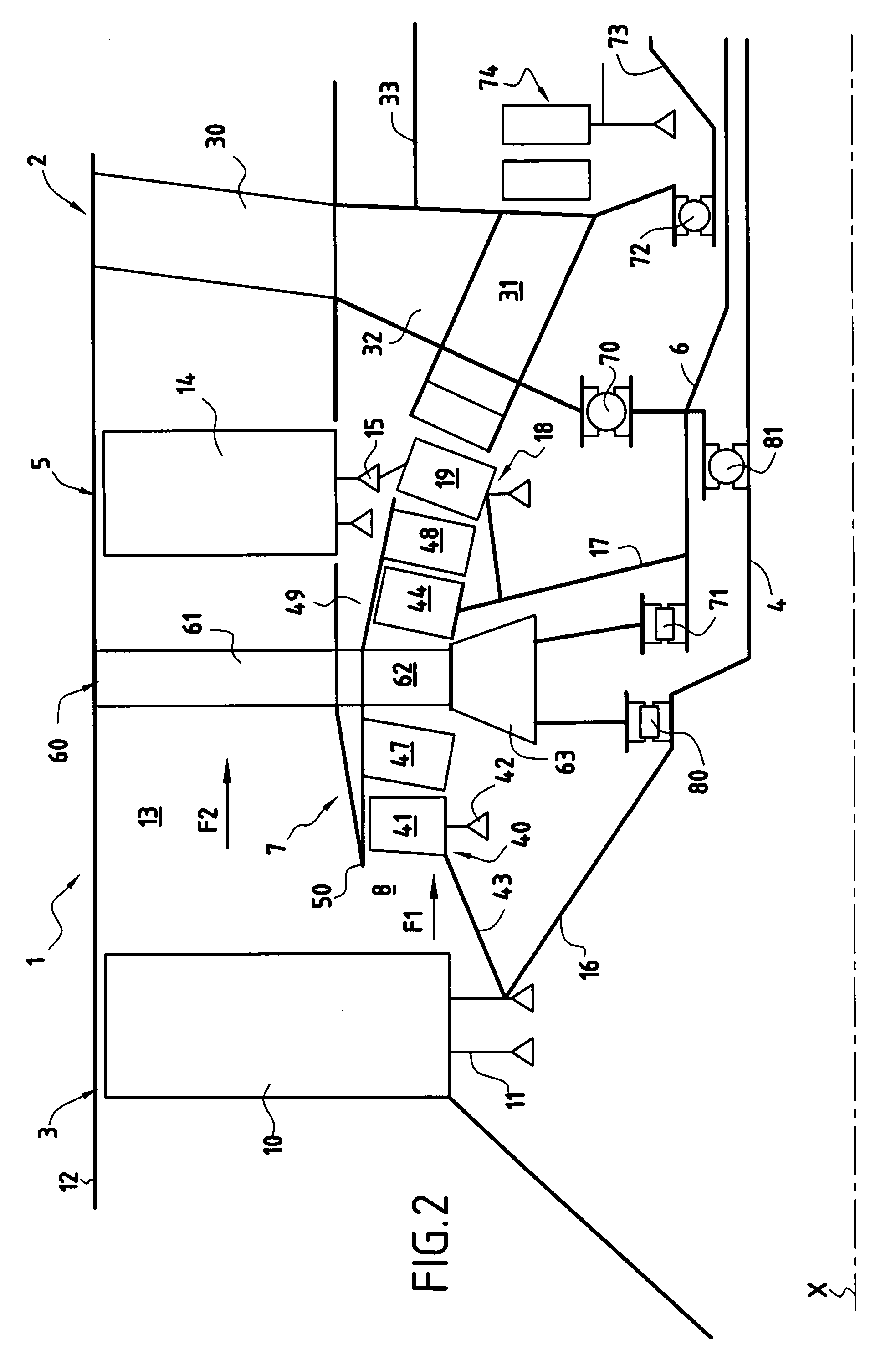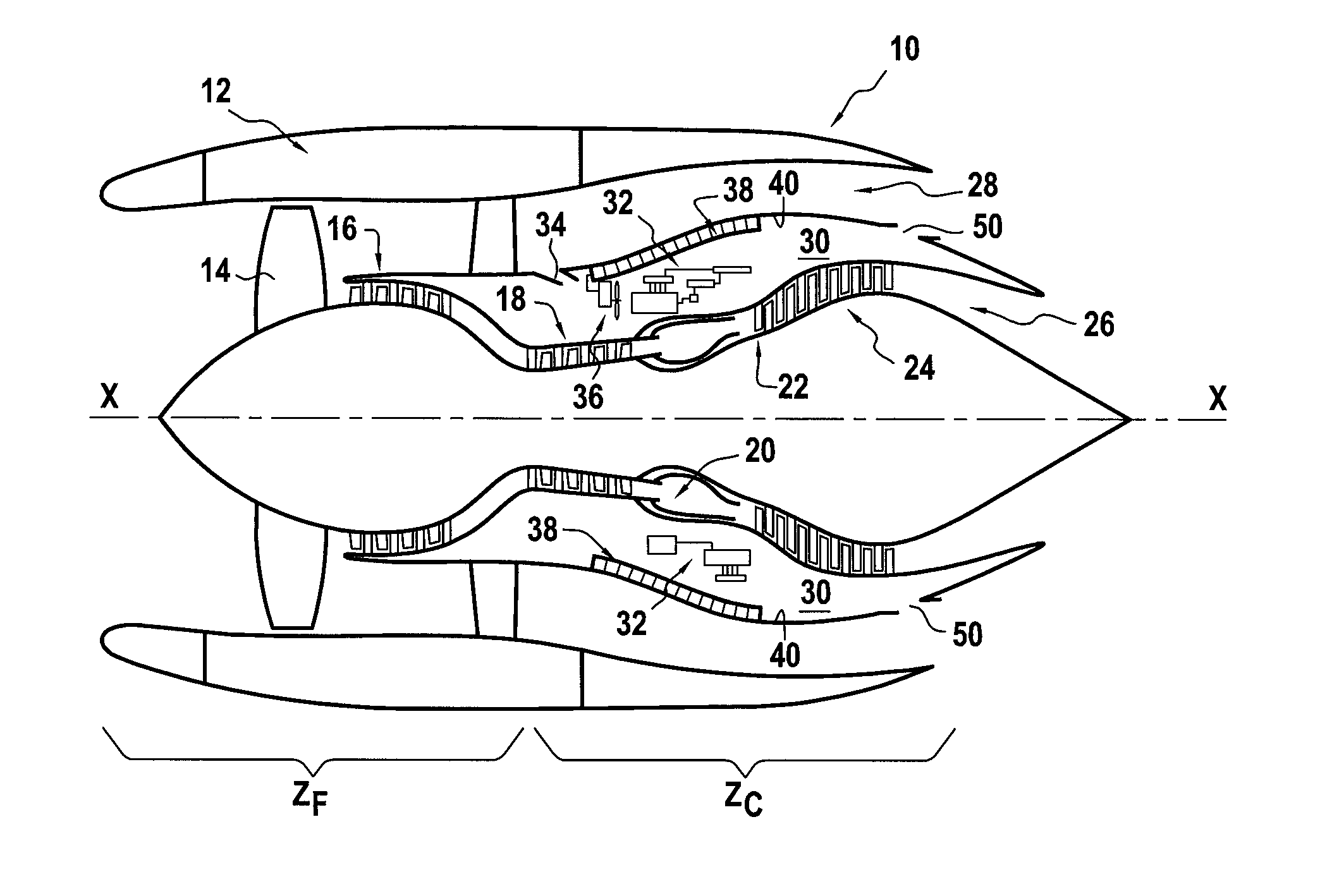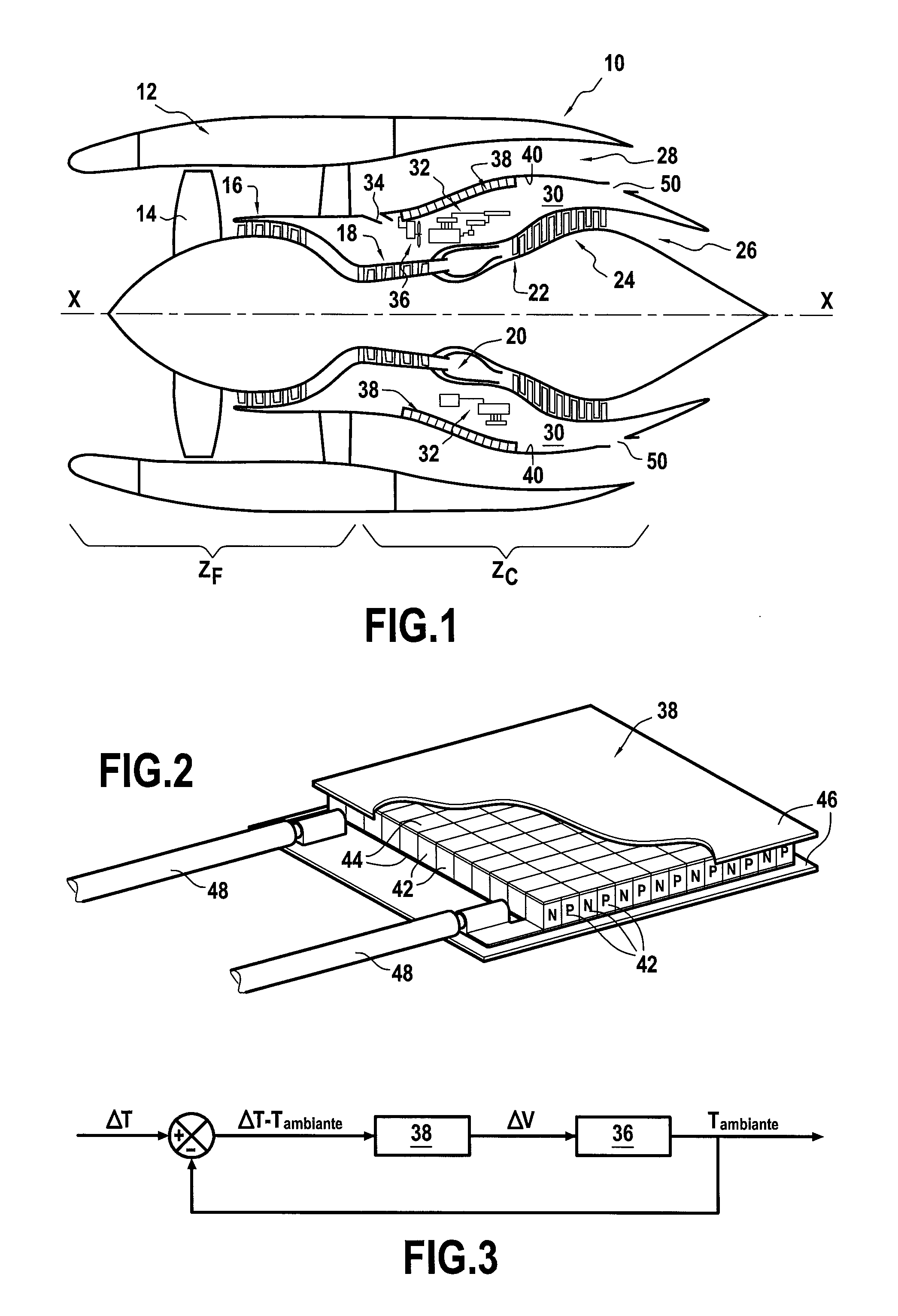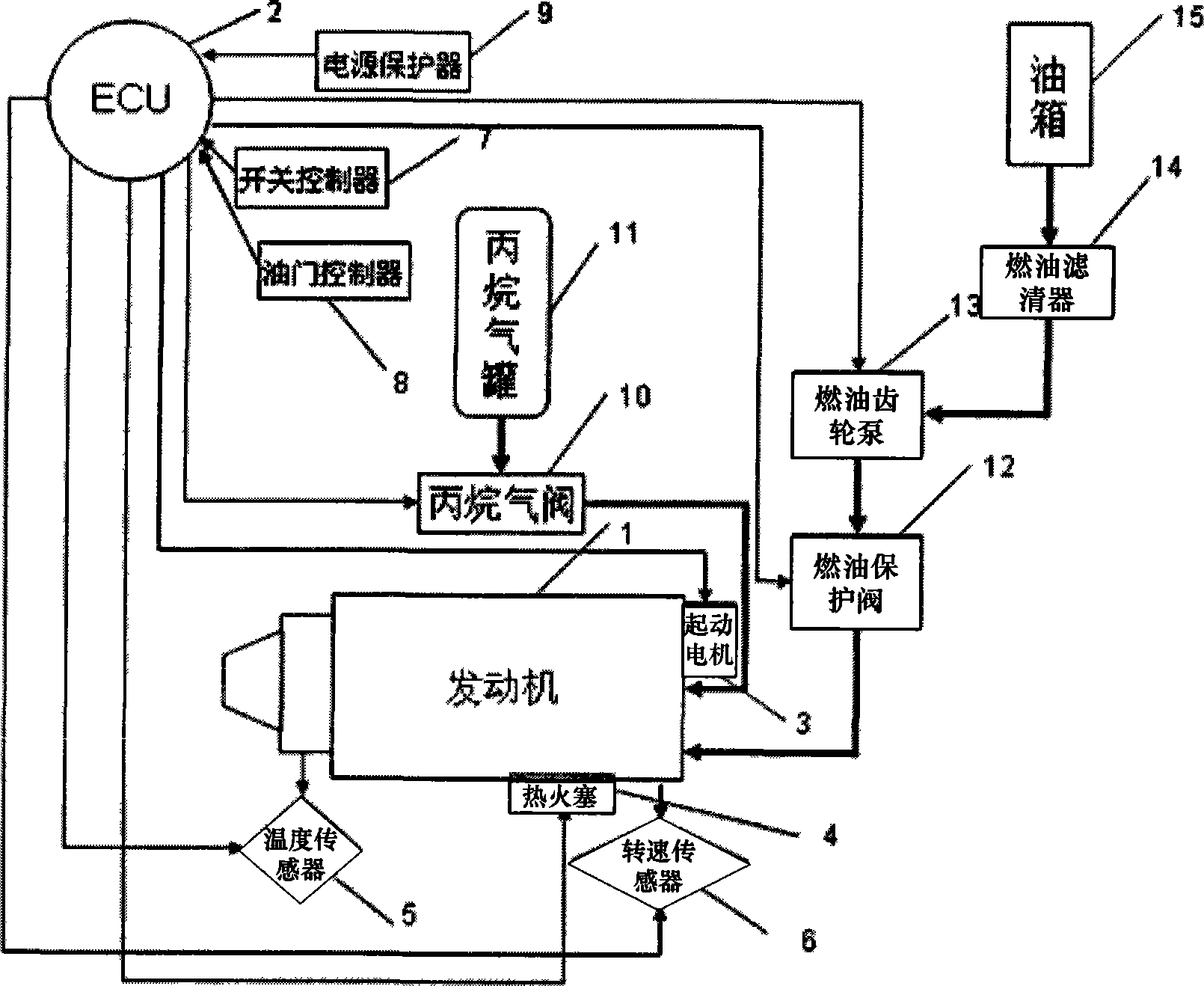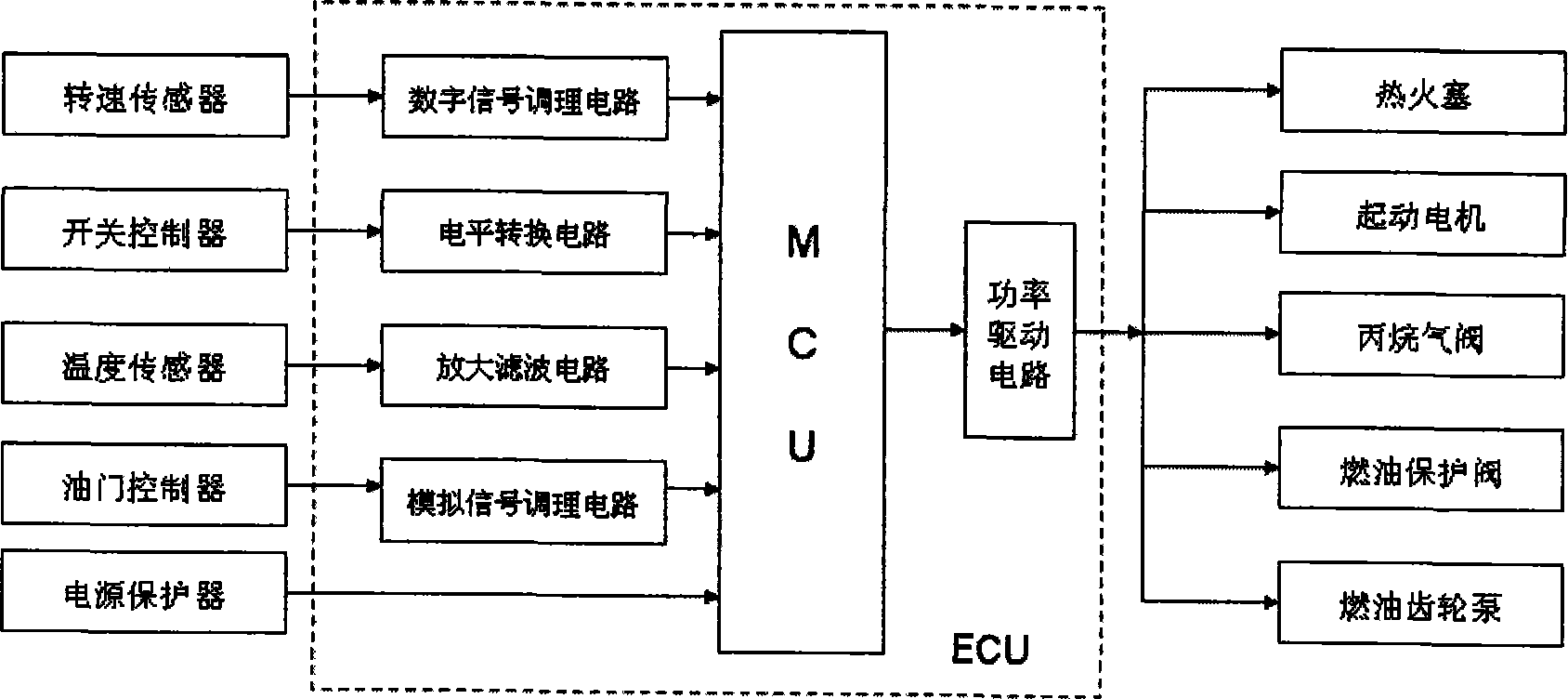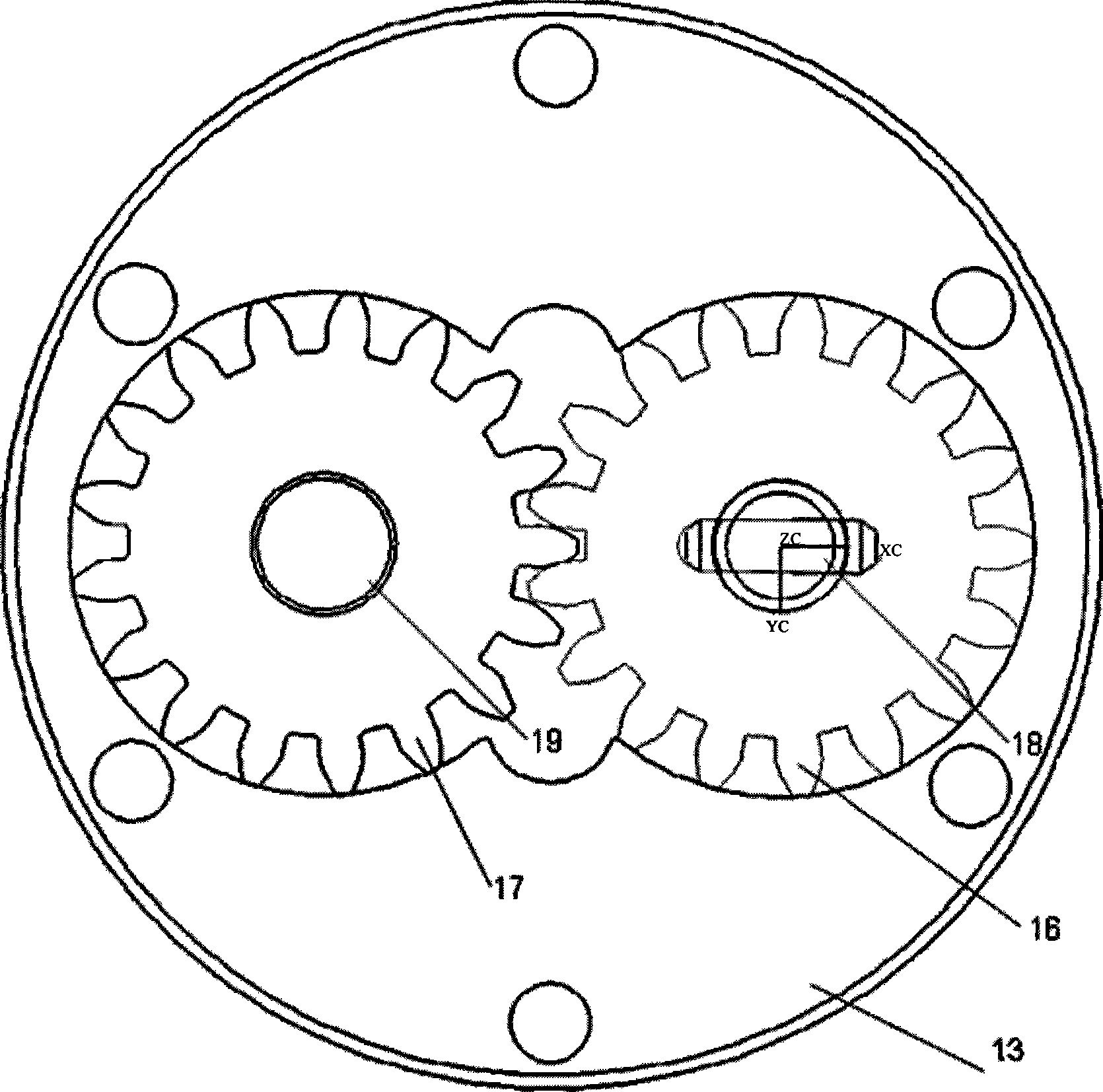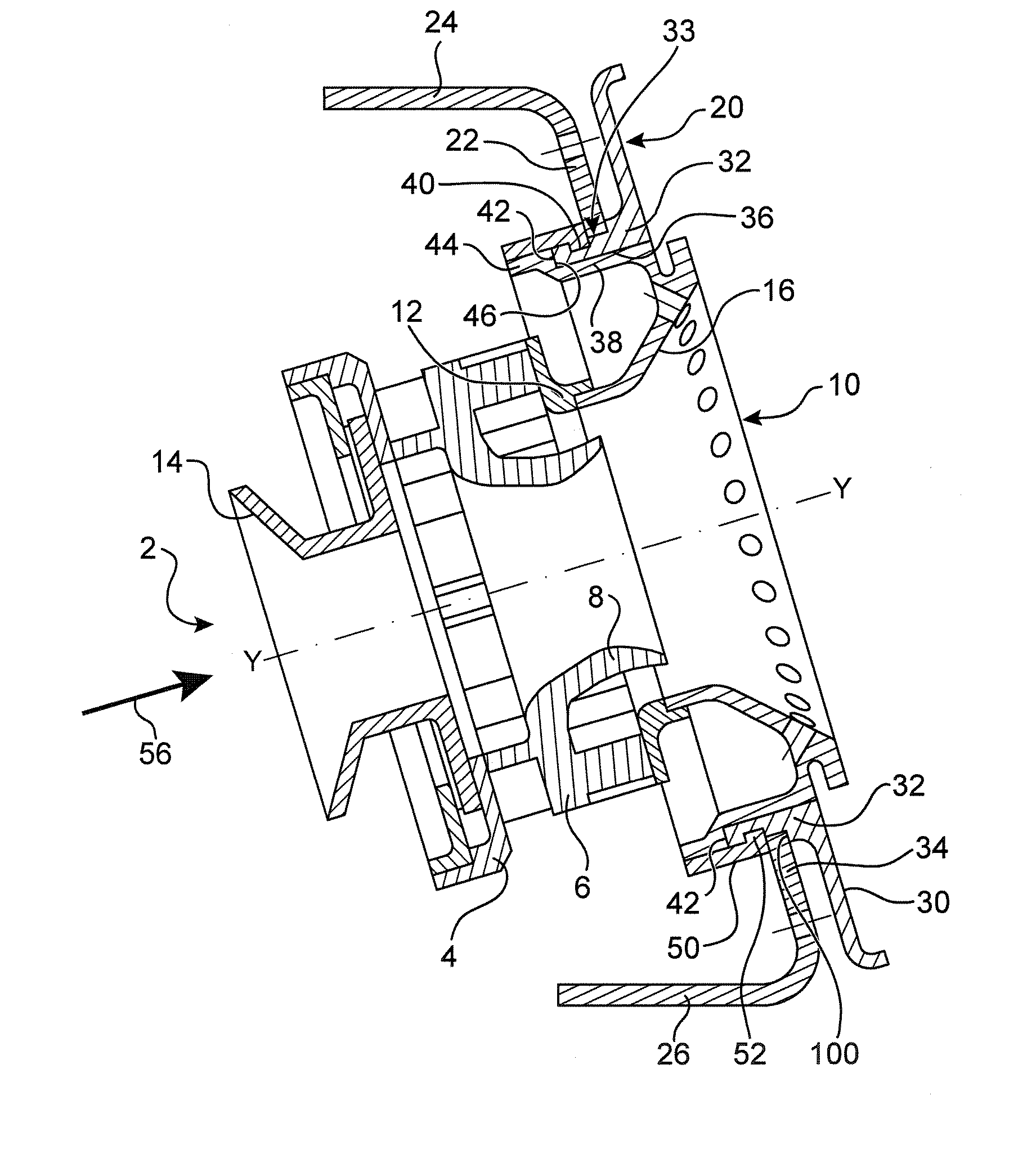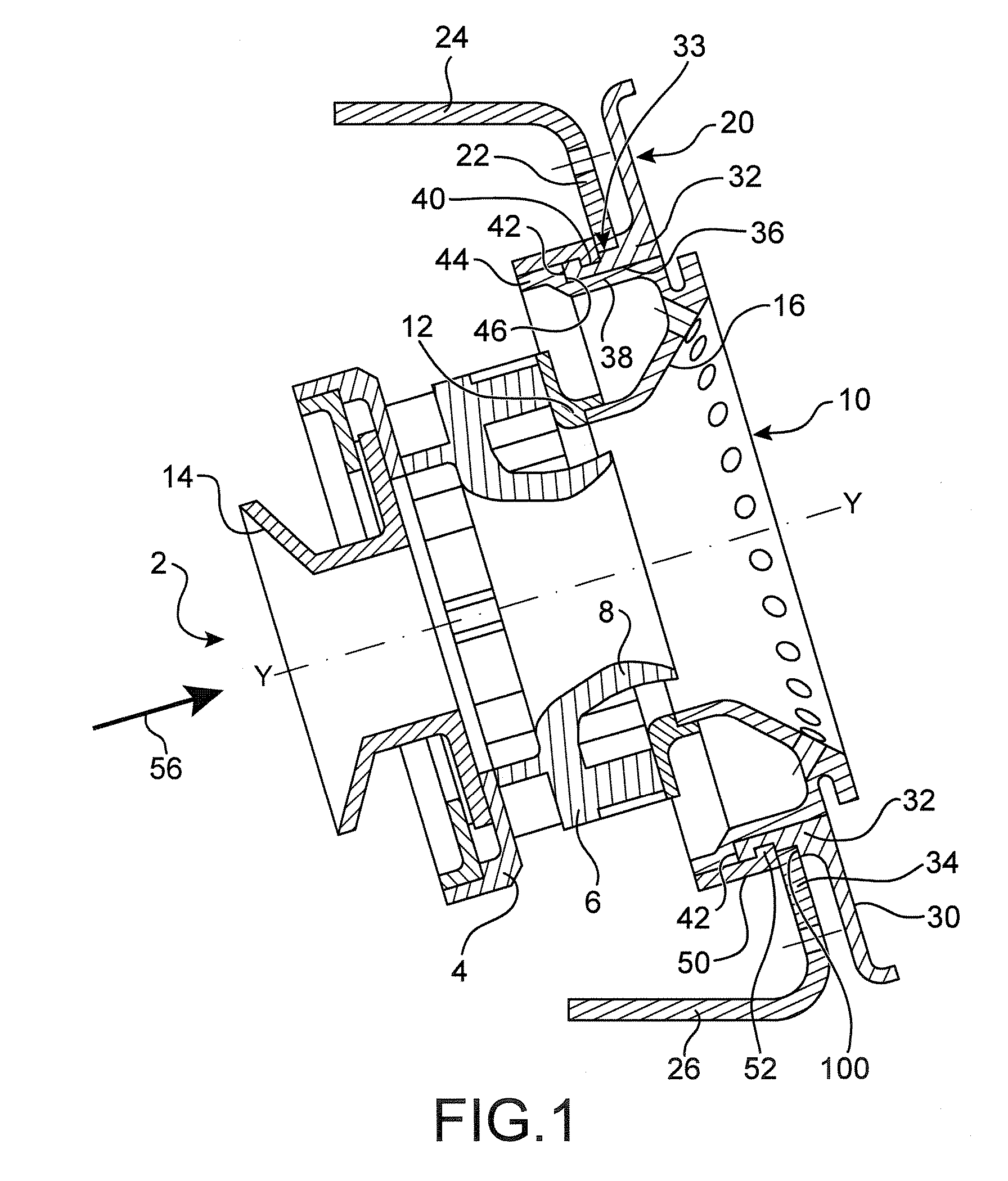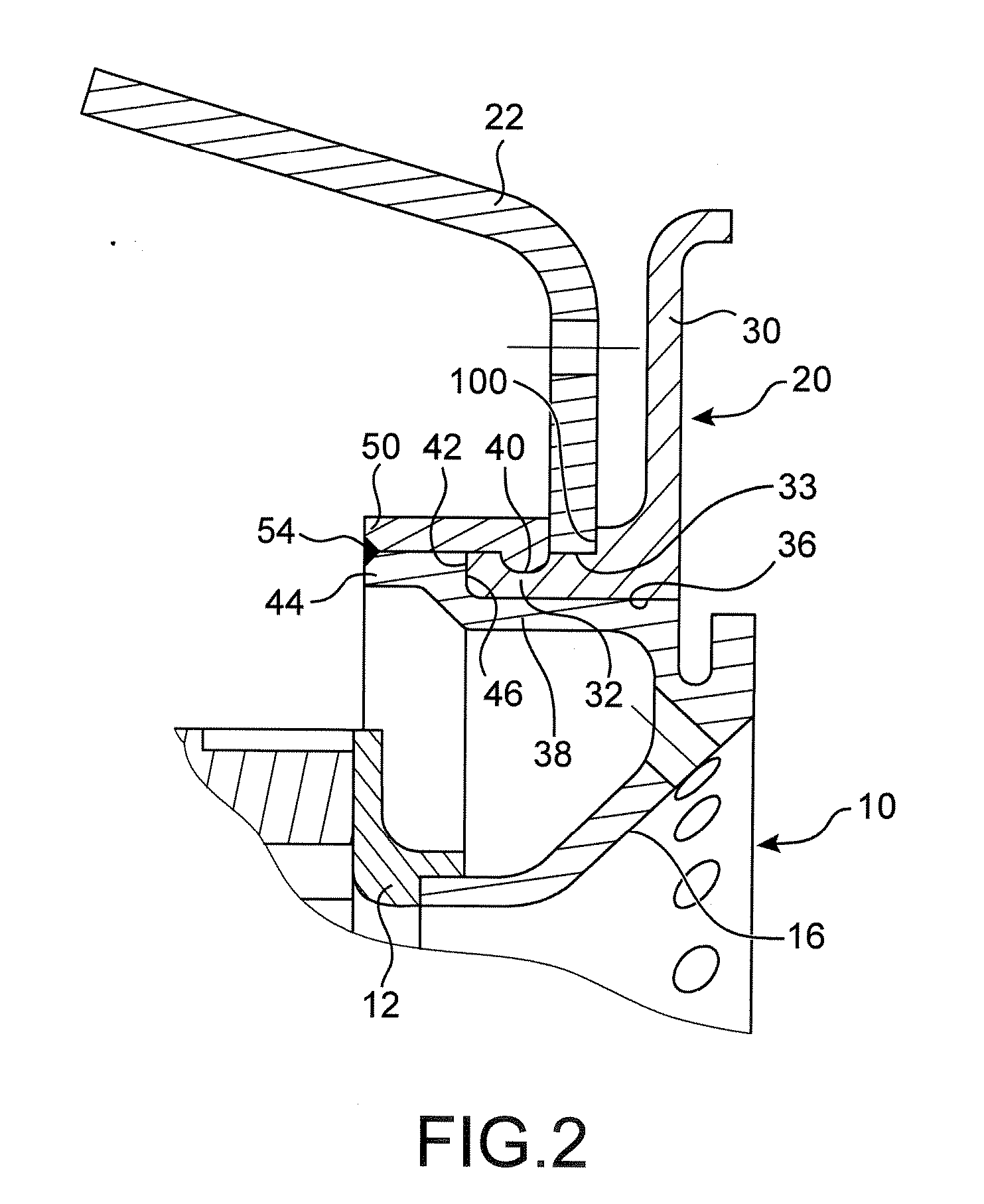Patents
Literature
457 results about "Turbojet" patented technology
Efficacy Topic
Property
Owner
Technical Advancement
Application Domain
Technology Topic
Technology Field Word
Patent Country/Region
Patent Type
Patent Status
Application Year
Inventor
The turbojet is an airbreathing jet engine, typically used in aircraft. It consists of a gas turbine with a propelling nozzle. The gas turbine has an air inlet, a compressor, a combustion chamber, and a turbine (that drives the compressor). The compressed air from the compressor is heated by the fuel in the combustion chamber and then allowed to expand through the turbine. The turbine exhaust is then expanded in the propelling nozzle where it is accelerated to high speed to provide thrust. Two engineers, Frank Whittle in the United Kingdom and Hans von Ohain in Germany, developed the concept independently into practical engines during the late 1930s.
Turbomachine blade, in particular a fan blade, and its method of manufacture
The composite turbomachine blade of the present invention comprises a preform made of yarns or fibers woven in three dimensions and a binder maintaining the relative disposition between the yarns of the preform. Said preform is made up of warp yarns and of weft yarns, the direction of the warp yarns forming the longitudinal direction of the preform. In characteristic manner, said preform comprises at least a first portion made using a first weave forming the airfoil of the blade, and a second portion made using a second weave forming the root of the blade, and the first and second portions are united by a transition zone in which the first weave is progressively modified to end up with the second weave, thereby obtaining a reduction at least in the thickness of the blade between the second portion and the first portion. The invention is applicable to making a fan blade for a turbojet.
Owner:SN DETUDE & DE CONSTR DE MOTEURS DAVIATION S N E C M A
Air-oil heat exchanger placed at the location of the air separator nose of a turbojet, and a turbojet including such an air-oil heat exchanger
InactiveUS20090165995A1Prevent freezingWithout significantly disturbing the air streamExhaust apparatusTurbine/propulsion engine coolingLeading edgeJet engine
The invention relates to an air-oil heat exchanger located at the inner shroud of the secondary duct of a turbojet. In characteristic manner, it comprises an oil circuit placed inside the separator nose and fins placed outside the top wall of the separator nose, between the leading edge of the separator nose and the outlet guide vanes.
Owner:TECHSPACE AERO
Turbomachine blade, in particular a fan blade, and its method of manufacture
Owner:SN DETUDE & DE CONSTR DE MOTEURS DAVIATION S N E C M A
Turbojet pod with laminar flow
InactiveUS6179249B1Good aerodynamic shapeKeep shapeAircraft power plant componentsDe-icing equipmentsEngineeringTurbojet
The bay (12) of a turbofan engine (10) comprises a front structural element (30), whose external surface is continuous and extends over at least 50% of the geometrical chord of the bay. Said element (30) is installed on maintaining and guiding members (44), such as slides, which prevent a significant deformation in flight and allow a sliding to the front of the element (30) for maintenance purposes. A laminar air flow around the front half of the bay (12) is consequently ensured.
Owner:SOC NATIONALE INDUSTRIELLE AEROSPATIALE SA
Heat exchanger on a turbine cooling circuit
ActiveUS7000404B2Avoid cloggingAvoid large quantitiesPump componentsEngine fuctionsCombustion chamberPlate heat exchanger
Owner:SN DETUDE & DE CONSTR DE MOTEURS DAVIATION S N E C M A
Emergency device for relighting a windmilling turbojet
InactiveUS6672049B2Continuous operationMitigate such drawbackTurbine/propulsion engine ignitionTurbine/propulsion engine startersHigh pressureTurbine
An emergency device for relighting a windmilling turbojet, the jet comprising a fan driven by a low-pressure turbine via a first shaft and a compressor driven by a high-pressure turbine via a second shaft disposed coaxially around the first shaft, a differential interconnecting said first and second shafts while compensating for their different speeds of rotation in normal operation or the turbojet, and a braking system connected to the differential so as to enable it to be slowed down or blocked when the turbojet shuts down, thereby enabling the first shaft to entrain the second shaft so that it reaches a speed that favors relighting of the turbojet.
Owner:SN DETUDE & DE CONSTR DE MOTEURS DAVIATION S N E C M A
Hybridisation of the compressors of a turbojet
PendingUS20170226934A1Optimising surge marginReduce constraintsEfficient propulsion technologiesGas turbine plantsCombustion chamberJet engine
twin-flow, double body turbojet includes a fan that is positioned upstream from a gas generator and delimits primary and secondary flows. The gas generator is traversed by the primary flow and includes a low-pressure compressor, a high-pressure compressor, a combustion chamber, a high-pressure turbine and a low-pressure turbine. The low-pressure turbine is linked to the low-pressure compressor by a low-pressure rotating shaft, and the high-pressure turbine is linked to the high-pressure compressor by a high-pressure rotating shaft. The turbojet has an electric motor for injecting mechanical power into at least one of the rotating shafts. The turbojet also has a device for removing power from at least one of the rotating shafts and transforming the excess power into electrical energy. An electric storage means is positioned between the device for removing power and the electric motor.
Owner:SN DETUDE & DE CONSTR DE MOTEURS DAVIATION S N E C M A
Mixer For Separate-Stream Nozzle
InactiveUS20080115484A1Reduce mechanical loadReduce weightPower plant exhaust arrangementsEngine fuctionsEngineeringTurbojet
A mixer for a separate-stream turbojet nozzle, the mixer comprising along a longitudinal axis (X-X′) both a fastener shroud (10) for connecting said mixer to the exhaust casing of the nozzle, and a lobe structure (20) presenting a succession of inner and outer lobes (22 and 21) distributed circumferentially around the longitudinal axis (X-X′) of the mixer. The lobe structure (20) is made of a ceramic matrix composite material and further comprises a stiffener ring (30) that forms a connection between at least some of the lobes of said structure. Thus, the major portion of the mixer, i.e. the lobe structure, is made of a ceramic matrix composite material, thereby significantly reducing the weight of the mixer, and consequently reducing the weight of the nozzle.
Owner:SAFRAN CERAMICS SA
Three-spool by-pass turbojet with a high by-pass ratio
ActiveUS7299621B2Optimize matching of the rear fan to different engine speedsEfficient propulsion technologiesGas turbine plantsDrive shaftTurbojet
The invention relates to aerodynamically matching the rear fan of a turbojet having two fans and a low-pressure compressor at the front of the intermediate casing, said fans being driven by two independent shafts. Said compressor is disposed between the blades of the two fans and includes at least one ring of rotor blades around the periphery of a wheel driven by the drive shaft for the front fan, and at least two grids of stator vanes disposed on either side of the ring of rotor blades and inside a grid carrier ring. A stationary outer grid and a stator of variable pitch connect the ring to the fan casing.
Owner:SN DETUDE & DE CONSTR DE MOTEURS DAVIATION S N E C M A
High-speed high-temperature multifunctional friction and abrasion tester
InactiveCN102116722AHeating fastMeasured lossInvestigating abrasion/wear resistanceNumerical controlPaired samples
The invention relates to a high-speed high-temperature multifunctional friction and abrasion tester which is especially applicable to simulating the service conditions of the sealed pairs of turbojet engines and solves the problems that the friction pairs in the prior art can not meet the needs of high speed (over 100m / s) and high temperature (up to 1200DEG C) in the aspects of motion line speed and experiment temperature and can not simulate the high-speed high-temperature friction and abrasion conditions of the gas path sealing of the turbojet engines and the like. The tester is provided with a rotation main shaft, a rotation disc, a numerical control sliding table and heating devices, wherein the rotation disc is arranged on the rotation main shaft, a rotation sample is arranged on therotation disc, the numerical control sliding table is arranged at one side of the rotation main shaft, a translation sample is arranged on the numerical control sliding table and is opposite to the rotation sample to form a friction pair; and the heating devices are arranged at the side of the rotation sample and at the side of the translation sample. By adopting the invention, the high-speed stable rotation of the rotation main shaft of the tester and the rapid heating of surface of the friction pair sample can be realized.
Owner:INST OF METAL RESEARCH - CHINESE ACAD OF SCI
Translatable thrust inverter for jet engine
InactiveUS20100001123A1Simply openedPower plant arrangements/mountingAircraft power plant componentsNacelleJet engine
Owner:SAFRAN NACELLES
Mixer for separate-flow nozzle
InactiveUS7677026B2Reduce mechanical loadReduce weightPower plant exhaust arrangementsEngine fuctionsEngineeringTurbojet
A mixer for a separate-stream turbojet nozzle, the mixer comprising along a longitudinal axis (X-X′) both a fastener shroud (10) for connecting said mixer to the exhaust casing of the nozzle, and a lobe structure (20) presenting a succession of inner and outer lobes (22 and 21) distributed circumferentially around the longitudinal axis (X-X′) of the mixer. The lobe structure (20) is made of a ceramic matrix composite material and further comprises a stiffener ring (30) that forms a connection between at least some of the lobes of said structure. Thus, the major portion of the mixer, i.e. the lobe structure, is made of a ceramic matrix composite material, thereby significantly reducing the weight of the mixer, and consequently reducing the weight of the nozzle.
Owner:SAFRAN CERAMICS SA
Single-stage hypersonic vehicle featuring advanced swirl combustion
InactiveUS20080283677A1Reduce complexityShorten the lengthAircraft navigation controlPower plant exhaust arrangementsRamjetLow speed
A single-stage hypersonic vehicle is comprised of a low-speed and a high-speed propulsion system. The low-speed propulsion system propels the single-stage vehicle to a threshold velocity, after which the high-speed propulsion system then takes over. The low-speed propulsion system includes a combined-cycle engine featuring a swirl generator that is integrated into a turbojet engine to provide a compact turbojet and swirl afterburner-ramjet propulsion system. The high-speed propulsion system includes a hypersonic engine that is operable at the threshold takeover velocity and beyond. In various embodiments, the high-speed propulsion system comprises a scramjet, rocket, or scramjet / rocket engine depending requirements. Benefits of the swirl generator design include its ability to rapidly and efficiently atomize, vaporize, mix and burn the fuel and oxidizer for the low speed propulsion system, significantly reduce length, weight, cooling requirements and complexity for both propulsion systems, while maintaining high propulsion performance and reducing propulsion and launch costs.
Owner:UNITED TECH CORP
Modular aircraft system
ActiveUS9505484B1Easy constructionImprove aerodynamic performanceActuated automaticallyDe-icing equipmentsCarrying capacityFlight vehicle
The modular aircraft system includes a single fuselage having a permanently installed empennage and plural sets of wing modules and engine modules, with each wing and engine module optimized for different flight conditions and missions. The fuselage and each of the modules are configured for rapid removal and installation of the modules to minimize downtime for the aircraft. Short wings having relatively low aspect ratio are provided for relatively high speed flight when great endurance and / or weight carrying capacity are not of great concern. Long wings having high aspect ratio are provided for longer range and endurance flights where speed is not absolutely vital. A medium span wing module is also provided. Turboprop, single turbojet, and dual turbojet engine modules are provided for installation depending upon mission requirements for any given flight. The aircraft is primarily adapted for use as an autonomously operated or remotely operated unmanned aerial vehicle.
Owner:AL SABAH NASSER M
De-icing device for turbojet inlet guide wheel vane, vane provided with such a de-icing device, and aircraft engine equipped with such vanes
The de-icing device is intended for the vane (10) of the inlet guide wheel (4) of a turbojet (2), comprising a fixed part (12) arranged on the upstream side and a mobile flap (18) arranged on the downstream side, in which said fixed part (12) comprises a trailing edge (16) substantially in the shape of a “U”, with one of the branches (162) being located on the intrados side (I) and the other branch (164) being located on the extrados side (E). It comprises at least one emission window (202), oriented substantially along an upstream-downstream direction, and arranged along the branch (162) of the “U” located on the intrados side (I) of the trailing edge (16).The inlet guide wheel (4) vane (10) is equipped with at least such a de-icing device.The aircraft engine (2) comprises at least one vane (10) equipped with such a de-icing device.
Owner:SN DETUDE & DE CONSTR DE MOTEURS DAVIATION S N E C M A
Method for making a soundproofing panel with at least one double resonator
InactiveUS20050147790A1Solution value is not highMore automatedLayered productsEfficient propulsion technologiesHoneycombEngineering
The invention concerns a method for making a soundproofing panel with at least one double resonator used for example on pods enclosing aircraft turbojets. Said method is characterized in that the septum is formed by assembling a plurality of parts against one of the honeycomb cores, said parts being cut out in foil, said parts being defined to enable the shape of the septum to be more or less adapted to extensible surfaces, said parts enabling significant reduction of the cost for perforating the septum.
Owner:AIRCELLE
Turbojet having an electricity generator arranged in its fan
ActiveUS7952244B2Improve efficiencyPromote conversionAnalogue computers for vehiclesWind motor controlElectricityLow speed
The turbojet comprises a high pressure spool and a low pressure spool driving a fan. In order to produce electricity, it further includes an electricity generator arranged in the fan and taking power therefrom. The generator comprises a rotor incorporated in the fan and a stator incorporated in the fan casing. This disposition for the electricity generator avoids problems of engine operability at low speed and enables mechanical power to be converted into electrical power with high efficiency. In addition, installation and maintenance of the electricity generator are facilitated by the generator being implanted in the fan.
Owner:SN DETUDE & DE CONSTR DE MOTEURS DAVIATION S N E C M A
Single-stage hypersonic vehicle featuring advanced swirl combustion
InactiveUS7762077B2Reduce complexityShorten the lengthPower plant exhaust arrangementsEfficient propulsion technologiesRamjetLow speed
A single-stage hypersonic vehicle is comprised of a low-speed and a high-speed propulsion system. The low-speed propulsion system propels the single-stage vehicle to a threshold velocity, after which the high-speed propulsion system then takes over. The low-speed propulsion system includes a combined-cycle engine featuring a swirl generator that is integrated into a turbojet engine to provide a compact turbojet and swirl afterburner-ramjet propulsion system. The high-speed propulsion system includes a hypersonic engine that is operable at the threshold takeover velocity and beyond. In various embodiments, the high-speed propulsion system comprises a scramjet, rocket, or scramjet / rocket engine depending requirements. Benefits of the swirl generator design include its ability to rapidly and efficiently atomize, vaporize, mix and burn the fuel and oxidizer for the low speed propulsion system, significantly reduce length, weight, cooling requirements and complexity for both propulsion systems, while maintaining high propulsion performance and reducing propulsion and launch costs.
Owner:UNITED TECH CORP
Device for balancing a rotating part, in particular a turbojet rotor
A device for balancing a rotating part, in particular a turbine rotor in a turbomachine such as a turbojet or the like, the device comprising at least one balance weight comprising engagement means for engaging it on an annular flange of the part, and locking means associated with the balance weight and with the annular flange to prevent the balance weight from moving relative to the annular flange and to block itself against moving both in rotation and in axial translation relative to the balance weight.
Owner:SN DETUDE & DE CONSTR DE MOTEURS DAVIATION S N E C M A
Propulsion from combustion of solid propellant pellet-projectiles
InactiveUS7194852B1High volume loadAbility to throttleGas turbine plantsContinuous jet plantsRamjetCombustion chamber
Owner:KRISHNAN VINU B
Propulsion system with integrated pylon
ActiveUS20080067287A1Simple and effective and economicalReduce weightPower plant constructionJet type power plantsJet aeroplaneJet engine
Propulsion system with integrated pylon Propulsion system comprising a bypass turbojet and a nacelle (10) a downstream cylindrical part (20) of which is rigid and is attached at its upstream end to an intermediate case of the engine, this downstream cylindrical part (20) also comprising a longitudinal beam (26) for attaching rods (28) for securing the engine to part (22) of an airplane.
Owner:SN DETUDE & DE CONSTR DE MOTEURS DAVIATION S N E C M A
Device for supporting and housing auxiliaries in a bypass turbojet
ActiveUS20070084216A1Simple and effective and economicEasy to carryGas turbine plantsStatorsJet engineEngineering
A device for supporting and housing auxiliaries in a bypass turbojet, comprising two coaxial case rings arranged one inside the other and connected by tubular radial arms through which fluid ducts and electric cables pass, at least one of the radial arms comprising on a lateral face a detachable panel whose removal allows access to turbojet equipment situated radially inside the internal case ring in alignment with the radial arm.
Owner:SN DETUDE & DE CONSTR DE MOTEURS DAVIATION S N E C M A
Motor fuel for diesel, gas-turbine and turbojet engines
InactiveUS7014668B2Reduce pollutantsReduce depositionBiofuelsEfficient propulsion technologiesJet engineOxygen
The invention relates to a motor fuel suitable for diesel, gas-turbine and jet engines and standard engines, comprising a mixture of organic compounds having oxygen-containing functional groups, and optionally a hydrocarbon fraction. The fuel is typically a stable homogeneous liquid at atmospheric pressure and normal ambient temperature and achieves a reduction of harmful pollutants in the exhaust emissions of the engines. A total of at least four different oxygen-containing functional groups are present in at least two different oxygen-containing organic compounds. The total concentration of organic compounds containing bound oxygen in the fuel composition generally varies from 5% and to 100% of the total volume of the fuel composition, and the concentration of the hydrocarbon compounds varies, correspondingly, from 95% to 0% of the total volume of the fuel composition.
Owner:BIO PETROLEUM LTD
Cmc mixer with structural outer cowling
ActiveUS20100126183A1Reduce weightExtended service lifeWind motor controlCombination enginesJet engineCombustion chamber
The invention relates to a mixer (100) for a separate-stream nozzle of a turbojet, the mixer being designed to mix a hot inner stream from the combustion chamber of the turbojet with a cold outer stream from the fan of the turbojet. The mixer comprises an inner shroud (120) defining a flow channel for said hot inner stream, an outer shroud (110) disposed around the inner shroud (120) and co-operating therewith to define a flow channel for said cold outer stream, and a lobed structure (130) having lobes (1321, 1322) extending longitudinally from the trailing edges (110a, 120a) of said shrouds. The lobed structure (130) is made of a ceramic matrix composite material and is attached to the outer shroud (110) by flexible fastener tabs (140).
Owner:SAFRAN CERAMICS SA
Turbojet electromechanical thrust reverser with servo-controlled door displacement
ActiveUS7370468B2Mitigate such drawbackDifference can be detectedPower plant arrangements/mountingEngine controlActuatorControl theory
A turbojet thrust reverser includes two doors each displaceable between an open position and a closed position of the reverser by at least one respective control actuator. Two electric motors drive the control actuators for the doors; each motor being controlled by an electronic control unit connected to a full authority digital engine control. Two servo-control devices control the displacement of the doors as a function of determined position references. The servo-control devices enable the doors to be displaced synchronously as a function of any variation in the forces exerted on the reverser and as a function of any force difference between the two doors.
Owner:SAFRAN ELECTRICAL & POWER
Method of fabricating a casing for turbine stator
ActiveUS7687021B2Great dimensionImprove mechanical propertiesTurbinesPump componentsJet engineMetal alloy
The invention provides a method of fabricating a turbine stator casing, the method comprising the operations consisting in: between the walls of portions of a mold, forming a cavity of shape corresponding to the shape of the shroud of said casing, securing soluble cores to at least one of said mold portions, said cores being held at a distance from the wall of said mold portion and representing empty spaces that are to be formed inside said shroud; putting soluble inserts into place between the cores to represent flow paths between said empty spaces; filling said cavity with a metal alloy powder; sintering said powder by hot isostatic pressing; eliminating the cores and the inserts by dissolving them; and extracting the shroud as molded in this way. The invention is applicable to fabricating a turbine stator casing for an airplane turbojet.
Owner:SN DETUDE & DE CONSTR DE MOTEURS DAVIATION S N E C M A
Turbojet architecture with two fans at the front
ActiveUS7412819B2Drawbacks related to the overhang are eliminatedDrawback can be obviatedPump componentsWind motor controlDrive shaftEngineering
A turbojet has a low-pressure compressor and two fans at the front of an intermediate casing which fans are driven by two independent shafts. The compressor is disposed under the rear fan and has a downstream ring of rotor blades connecting the rear fan to the drive shaft of the rear fan, an upstream rotor blade ring that is connected to the drive shaft of the front fan and at least one ring of stator blades that is disposed between the rings of rotor blades and inside an outer stator that is supported by a second intermediate casing. Bearings are interposed respectively between the two intermediate casings and the two shafts.
Owner:SN DETUDE & DE CONSTR DE MOTEURS DAVIATION S N E C M A
Method and a circuit for ventilating equipment of a turbojet by thermoelectricity
InactiveUS20160123185A1Limit overuseEffective supervisionPump componentsEngine fuctionsJet enginePotential difference
The invention provides a method of ventilating equipment of a turbojet, the turbojet (10) having a cold zone (ZF) including a fan (14) upstream from a hot zone (ZC), the turbojet equipment (32) for ventilating being arranged in a ventilation space (30) available around the hot zone between a primary air stream passage (26) and a secondary air stream passage (28) of the turbojet, the method comprising taking ventilation air from one of the air stream passages in order to convey it to the ventilation space, and providing forced flow of the ventilation air by means of at least one electric fan (36) positioned inside the ventilation space and powered electrically by at least one thermoelectric generator (38) suitable for inducing a potential difference (ΔV) and positioned in a wall (40) between the ventilation space and the secondary air stream passage.
Owner:SN DETUDE & DE CONSTR DE MOTEURS DAVIATION S N E C M A
Control device of microminiature turbojet and starting control method thereof
The invention discloses a control device for a microminiature turbojet engine and a starting control method thereof. The device comprises a rotating speed sensor for collecting the rotating speed of an engine, a temperature sensor for collecting exhaust temperature, a switch controller, a throttle controller, an electronic control unit (ECU) and an executing mechanism, wherein the executing mechanism comprises a starting motor, a hot piston, a propane gas valve, a fuel protective valve and a fuel gear pump. The control method comprises the following steps: the ECU monitors the working state of the engine through the sensor, and outputs a pulse-width modulation signal to a power drive circuit to control the starting motor, the hot piston, the propane gas valve, the fuel protective valve and the fuel gear pump so as to complete starting control to the engine; functions of establishing fuel pressure and adjusting fuel quantity can be realized by the fuel gear pump after starting of the engine is completed; and fuel can be accurately supplied to ensure that the engine operates in an expected working state. The device can be used for a microminiature delivery vehicle, and the executing mechanism of the device has the advantages of simple structure, small volume and light weight, and easily realization of reliable and efficient control to the engine.
Owner:北京领动国创科技有限公司
System of attaching an injection system to a turbojet combustion chamber base and method of attachment
ActiveUS20070084215A1Eliminate axial clearanceContinuous combustion chamberGas turbine plantsCombustion chamberJet engine
A system of attaching an injection system to a turbojet combustion chamber base. It comprises a deflector welded onto the chamber base. The deflector comprises an annular portion having an edge forming a retaining shoulder directed toward the front of the turbojet and the injection system comprises a collar on which is formed a retaining shoulder directed toward the rear of the turbojet and pressing against the retaining shoulder of the deflector.
Owner:SN DETUDE & DE CONSTR DE MOTEURS DAVIATION S N E C M A
Features
- R&D
- Intellectual Property
- Life Sciences
- Materials
- Tech Scout
Why Patsnap Eureka
- Unparalleled Data Quality
- Higher Quality Content
- 60% Fewer Hallucinations
Social media
Patsnap Eureka Blog
Learn More Browse by: Latest US Patents, China's latest patents, Technical Efficacy Thesaurus, Application Domain, Technology Topic, Popular Technical Reports.
© 2025 PatSnap. All rights reserved.Legal|Privacy policy|Modern Slavery Act Transparency Statement|Sitemap|About US| Contact US: help@patsnap.com
